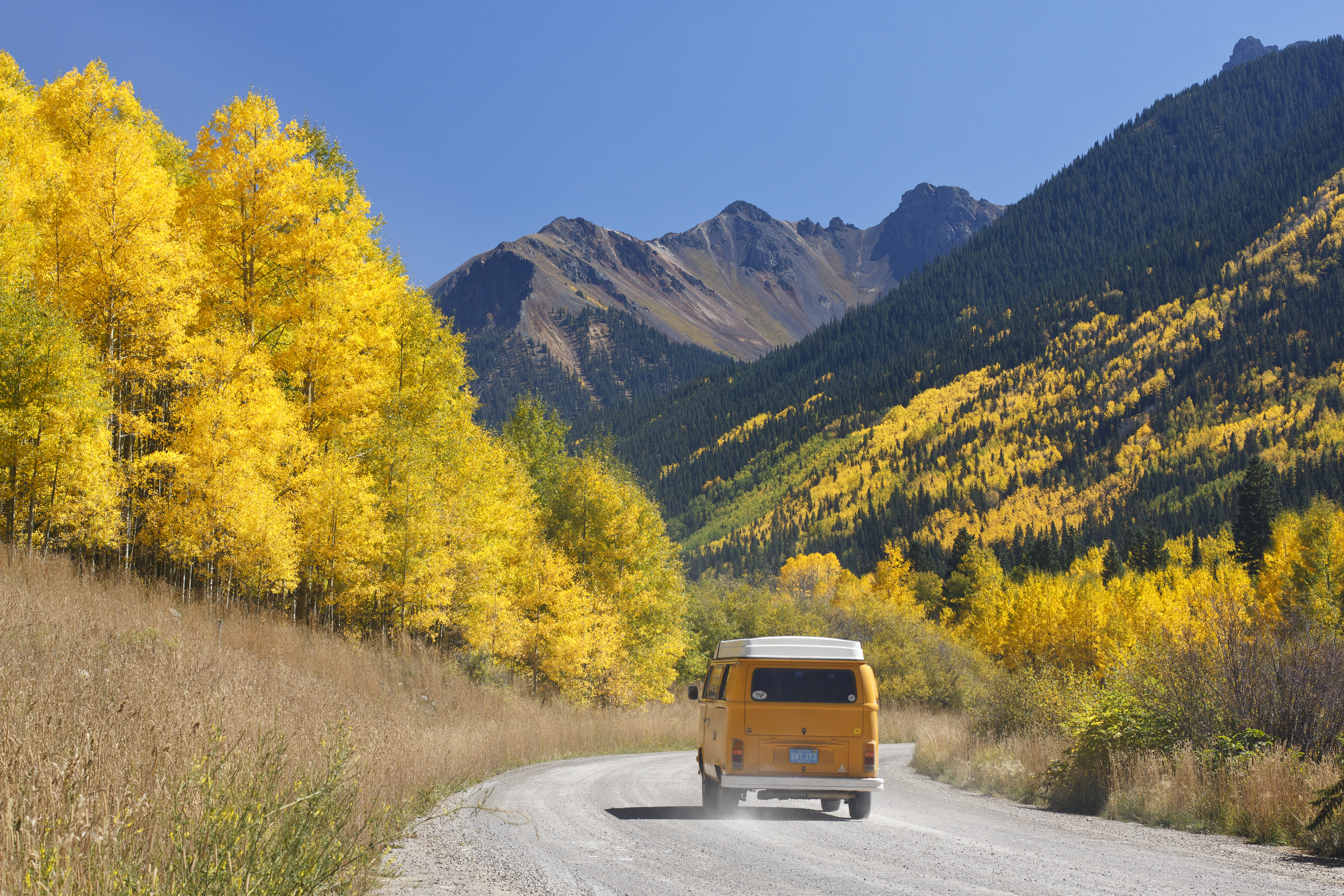
by JR Switchgrass | Oct 27, 2015 | Blog Post

We call this little bus home. She carries everything we own, everything we need. She takes us up small side roads that are steep with slow travel.
–
We don’t have much money. Hell, we don’t have much anything, really, besides joy and anticipation.
–
These last three years have been a journey of learning, hundreds of lessons in the art of living well. The less you need, and the fewer expectations you have, the more fulfilled and joyful you are.
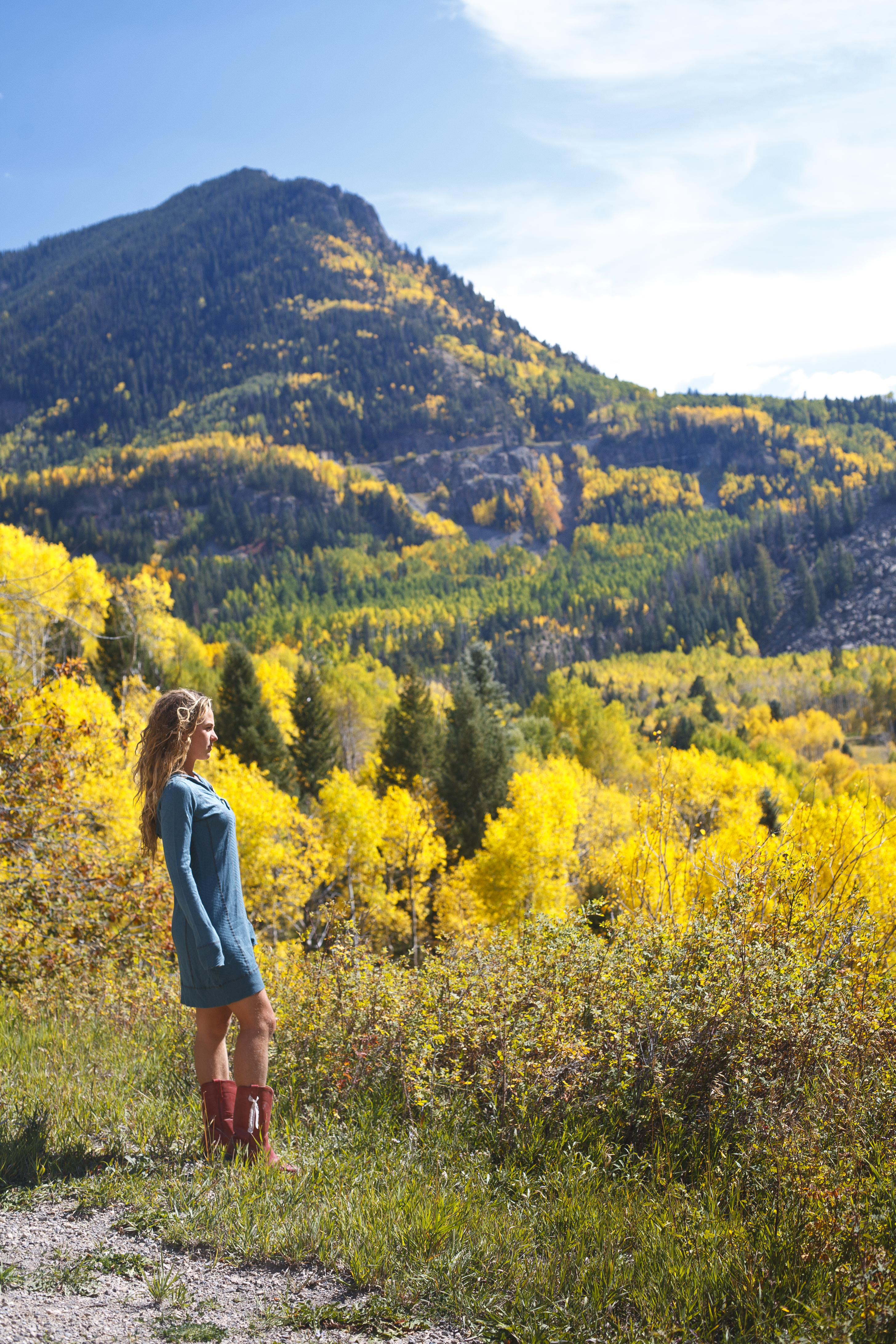
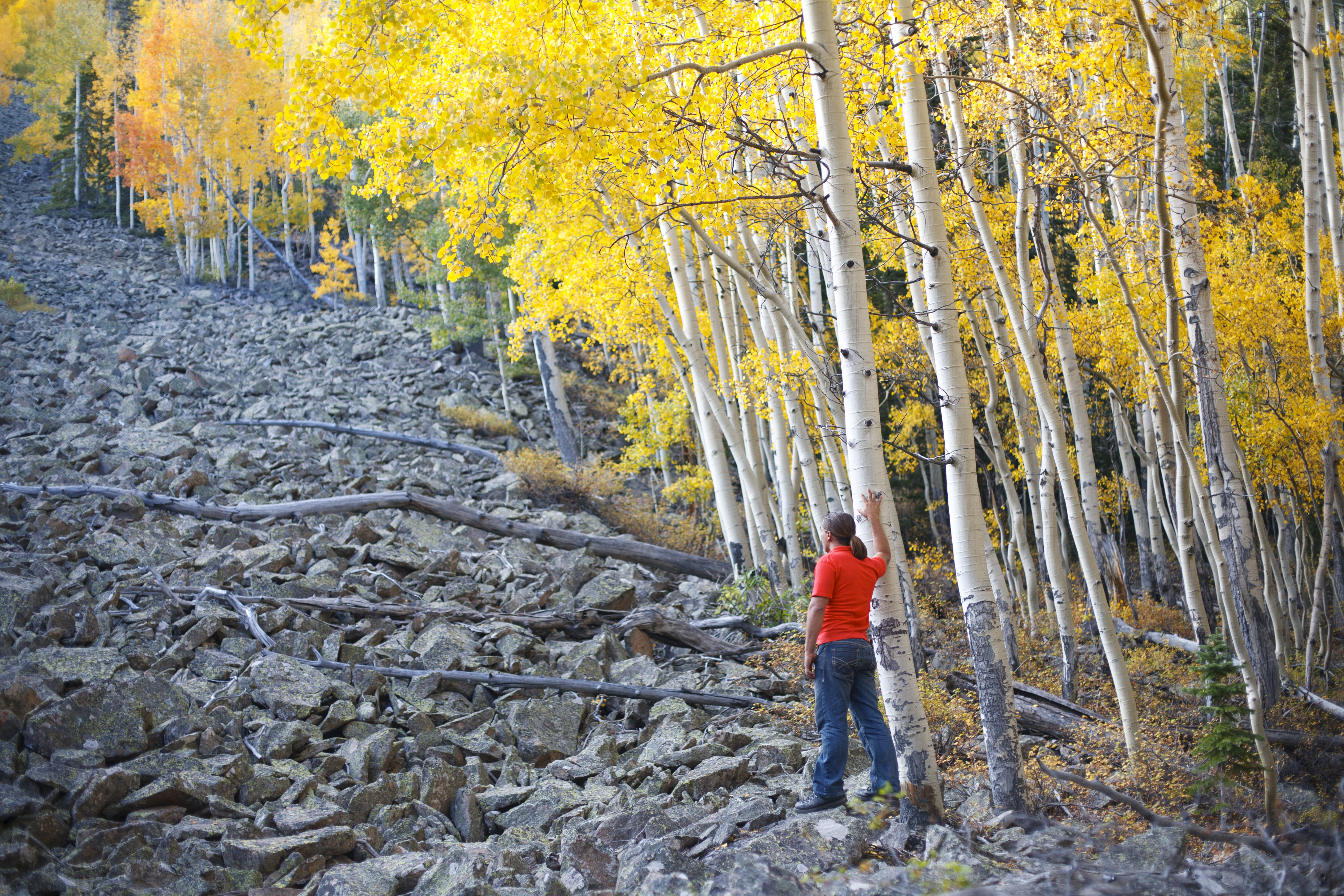
Fall is the most cerebral season.
–
It’s a time of contraction and inner reflection. The air becomes thin, our bodies bundle up under layers, and energy is sluggish and scarce.
–
Now, imagination is rich. We project onto a fading landscape vibrant ideas of regrowth. Now is when we cut back our foliage and surplus energy, so we are ripe and ready when there is warmth enough to expand.
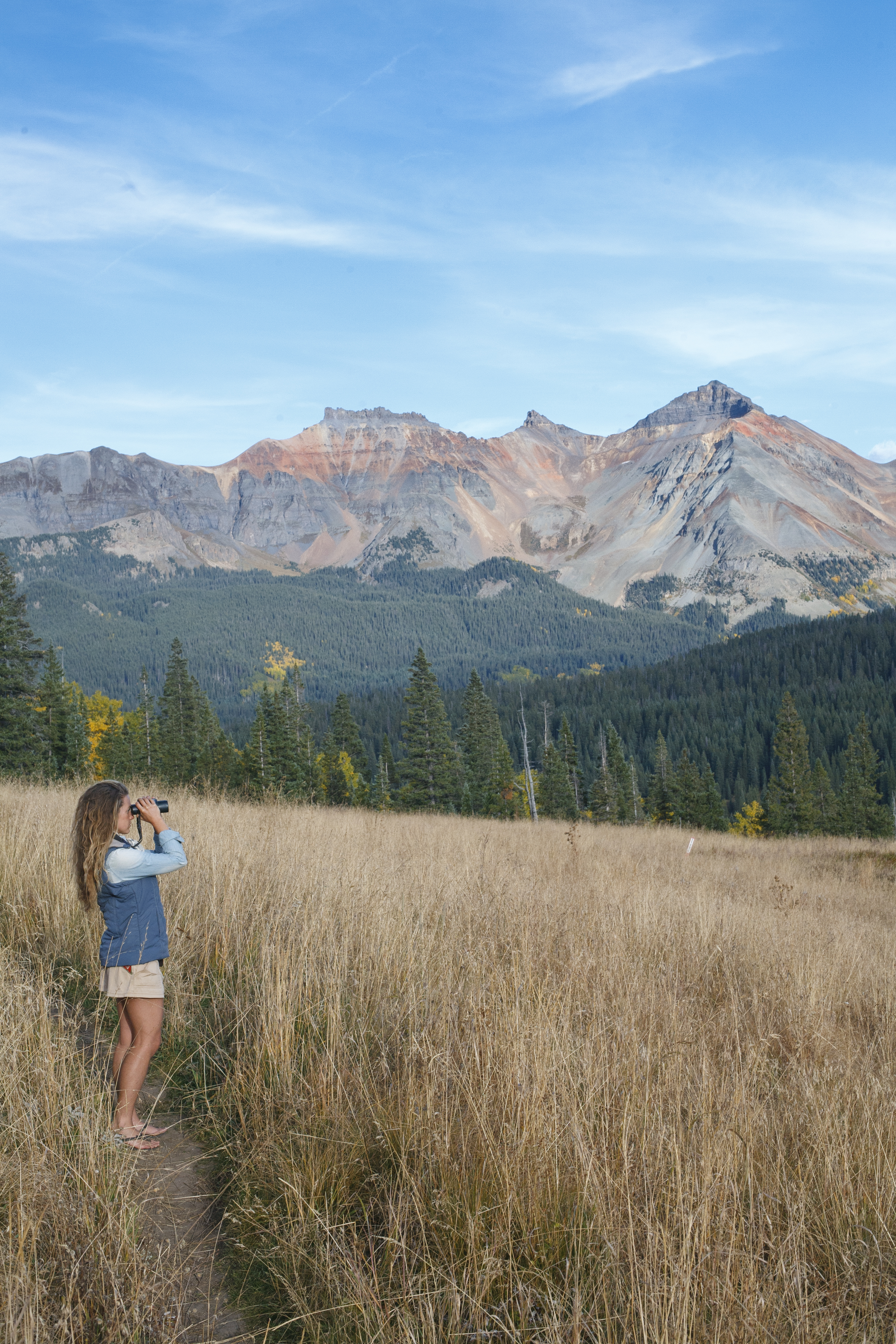
Change is the only constant in life.
–
Take the trees. Each day, they fade into different colors. Eventually, they will stand bare.
–
Matter is in continuous flux, an endless energy swip-swap. Because this is true, we are never, ever allowed to be bored.
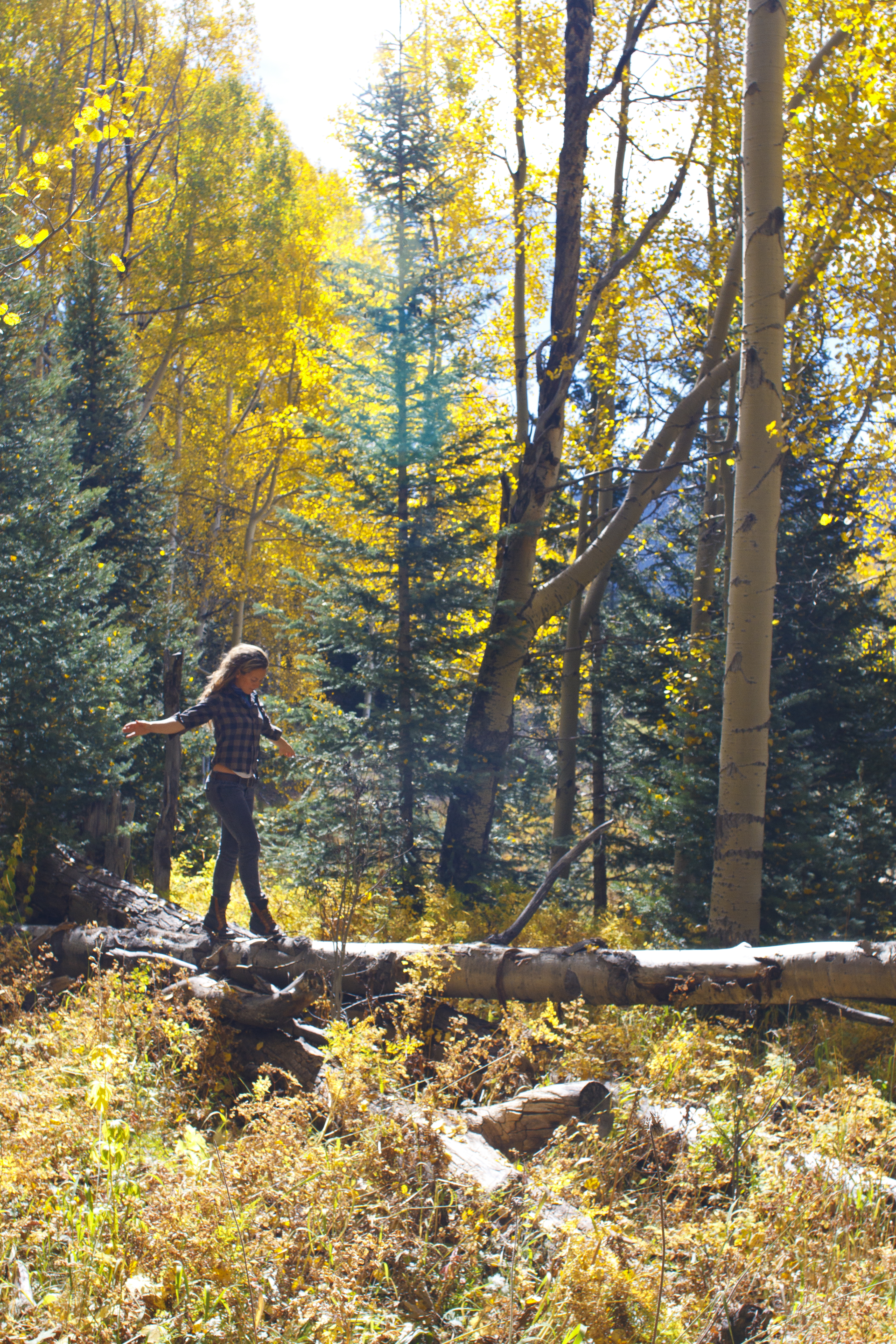
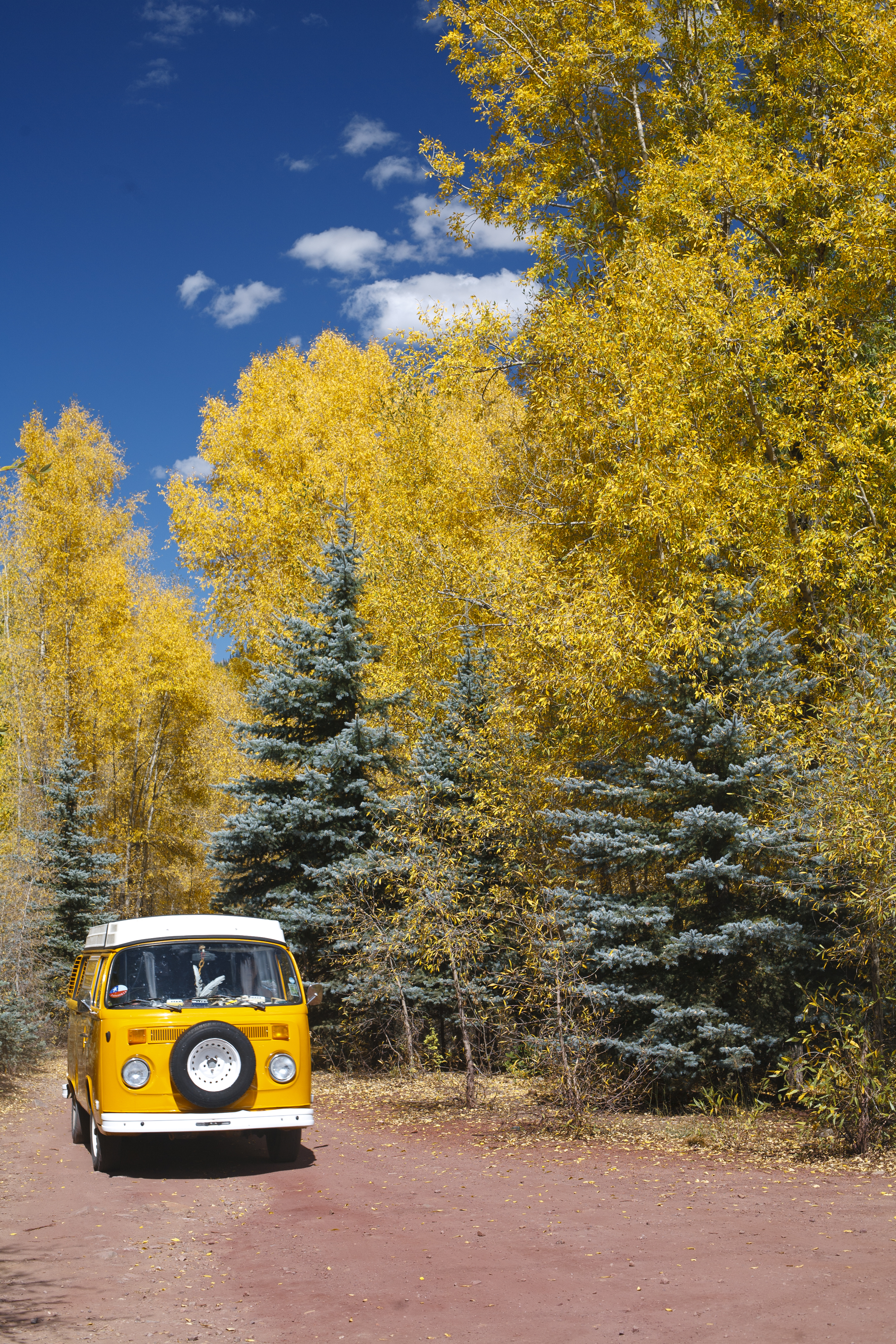
“How is it that trees never desire to move, to run?” I asked. “How can they sit stationary for lifetimes and lifetimes and never long to leave?”
–
“Maybe trees are the most highly evolved form of life,” James answered. “Wise enough to accept that there is only here and now.”
–
We looked up into the aspens and pondered their patience, as the chlorophyll drained slowly from their leaves. They gave no hint of hearing my question, only shimmied and glittered in the crisp fall wind.
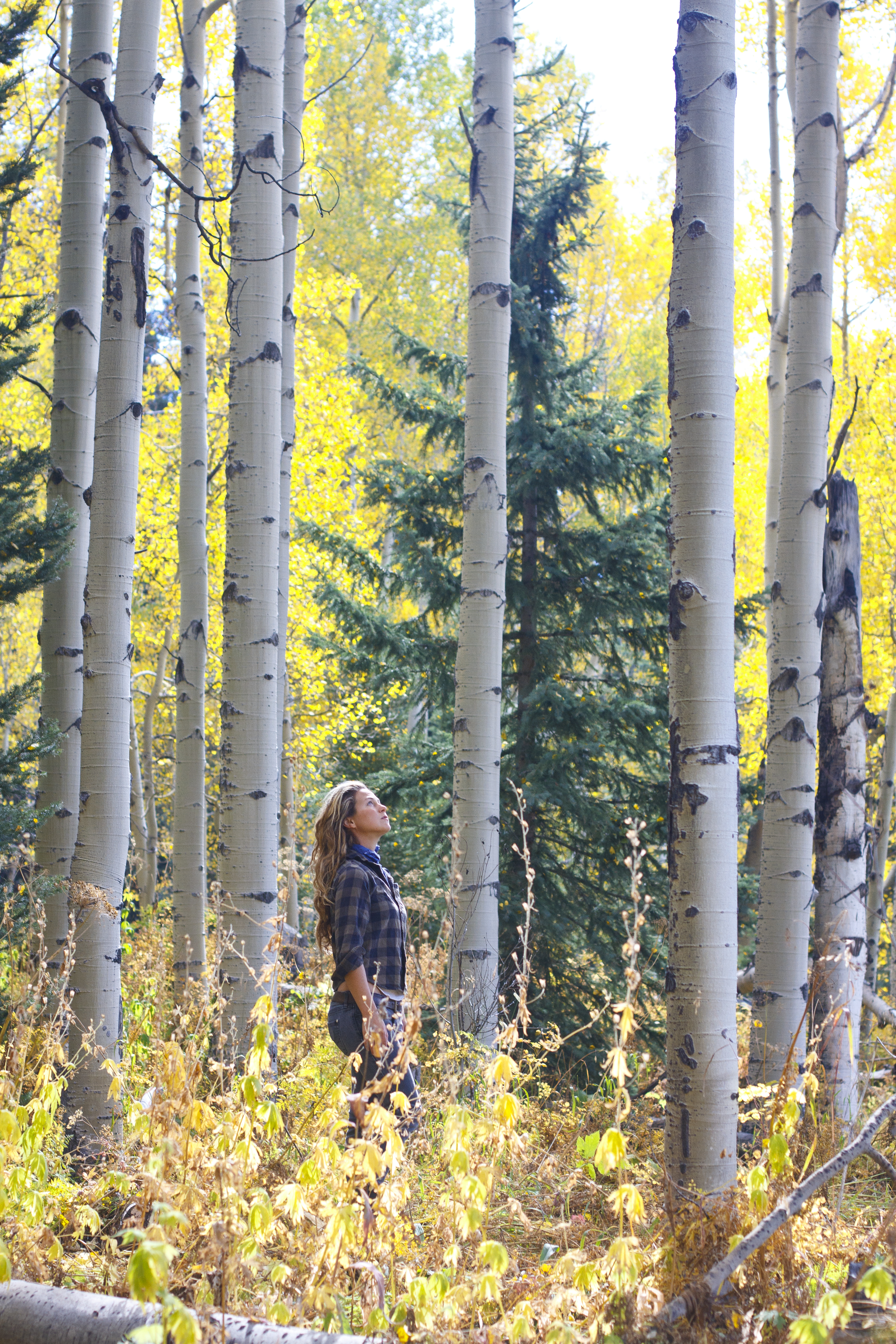
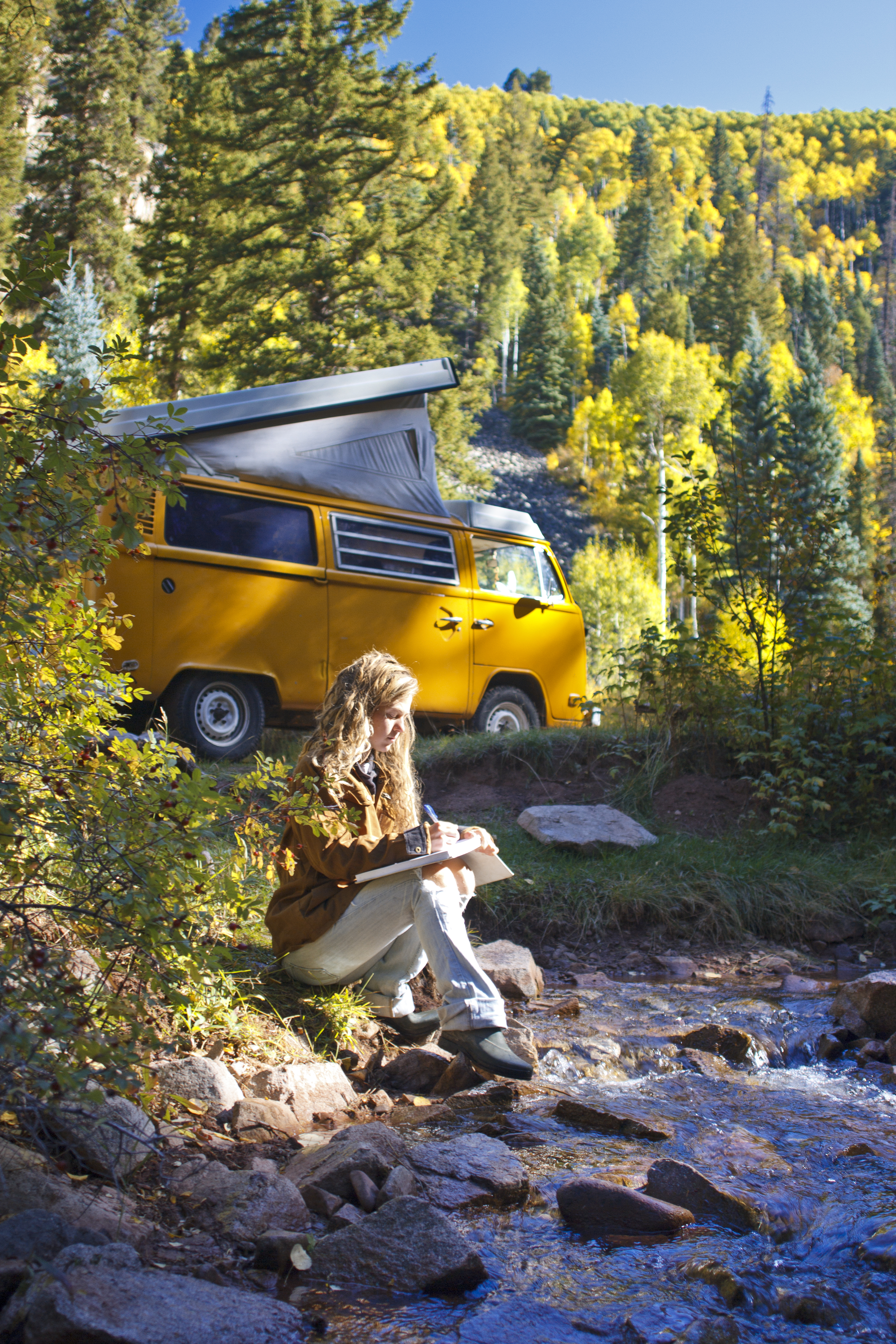
The bus is our cozy little cabin in the woods. Mornings are small and steam rises from the kettle as frost melts from the wild strawberry plants outside.
–
We go Dutch on brewed coffee, because we only have a little bit left and town is a long ways away.
–
We drink it black in the cinnamon morning, the Canada geese flying overhead to wintering grounds. Looking out our bay window, I see summer lying down to sleep, with the yellow leaves of aspens as a blanket.
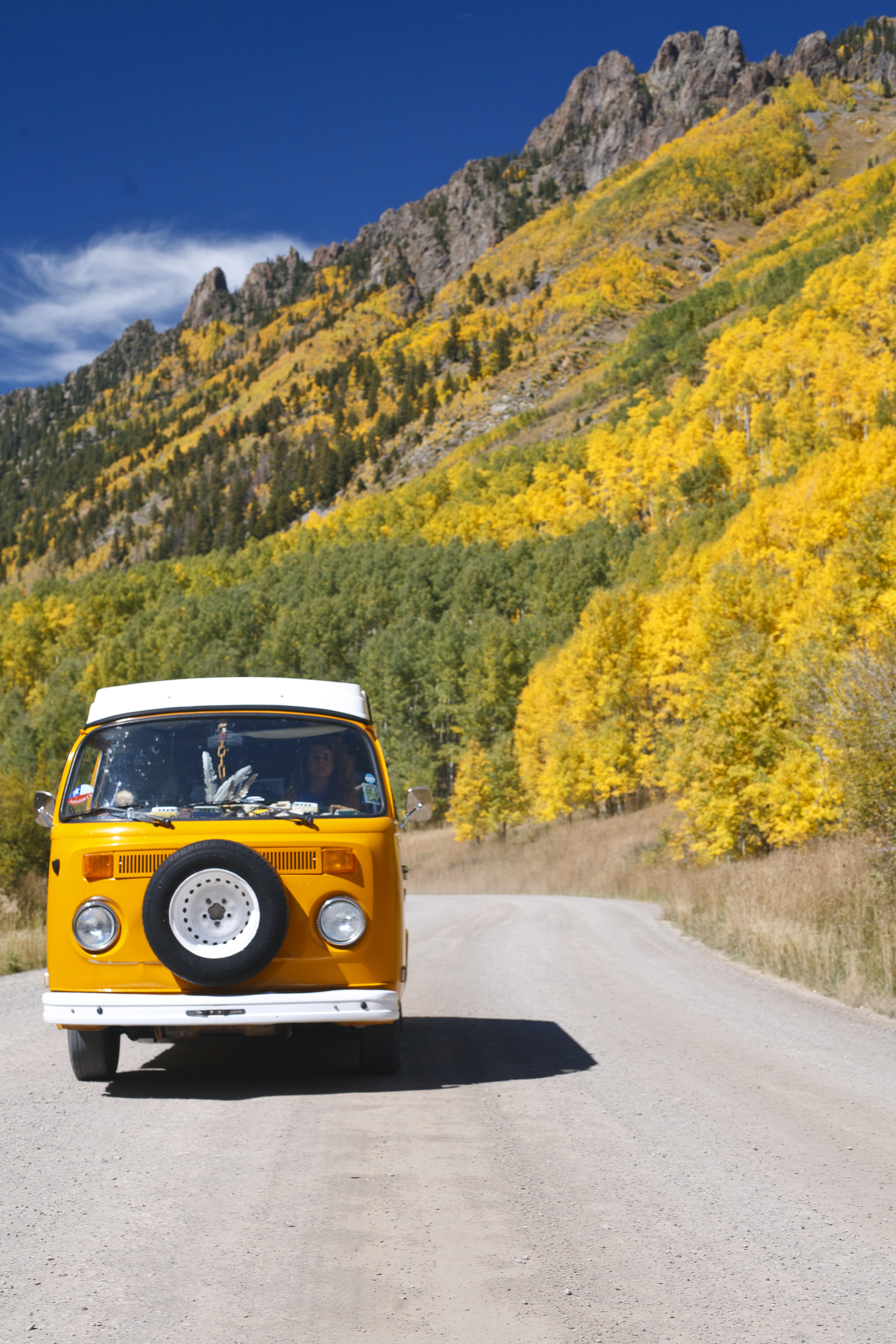
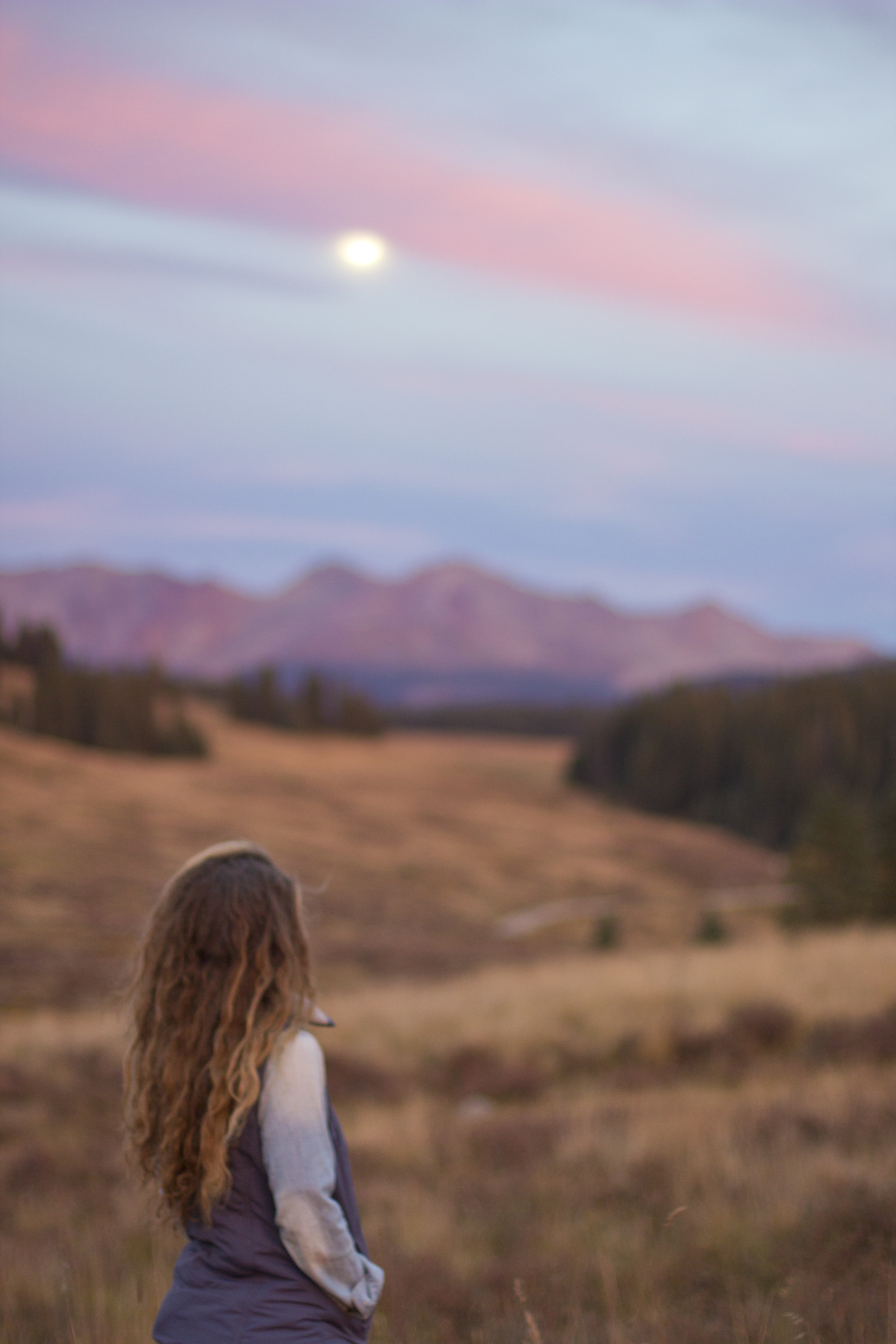
Life is a beautiful process of dying. From the moment we’re born, our cells begin to deteriorate.
–
Our time on earth is so short, our moments limited to a single lifespan.
–
Why not be happy? But even more than happy, why not be joyful, passionate? Why not live? Why not wake each bright new morning, so sizzling with the fat of life that you crackle and burn and almost explode with all the big and small things that make life miraculous?
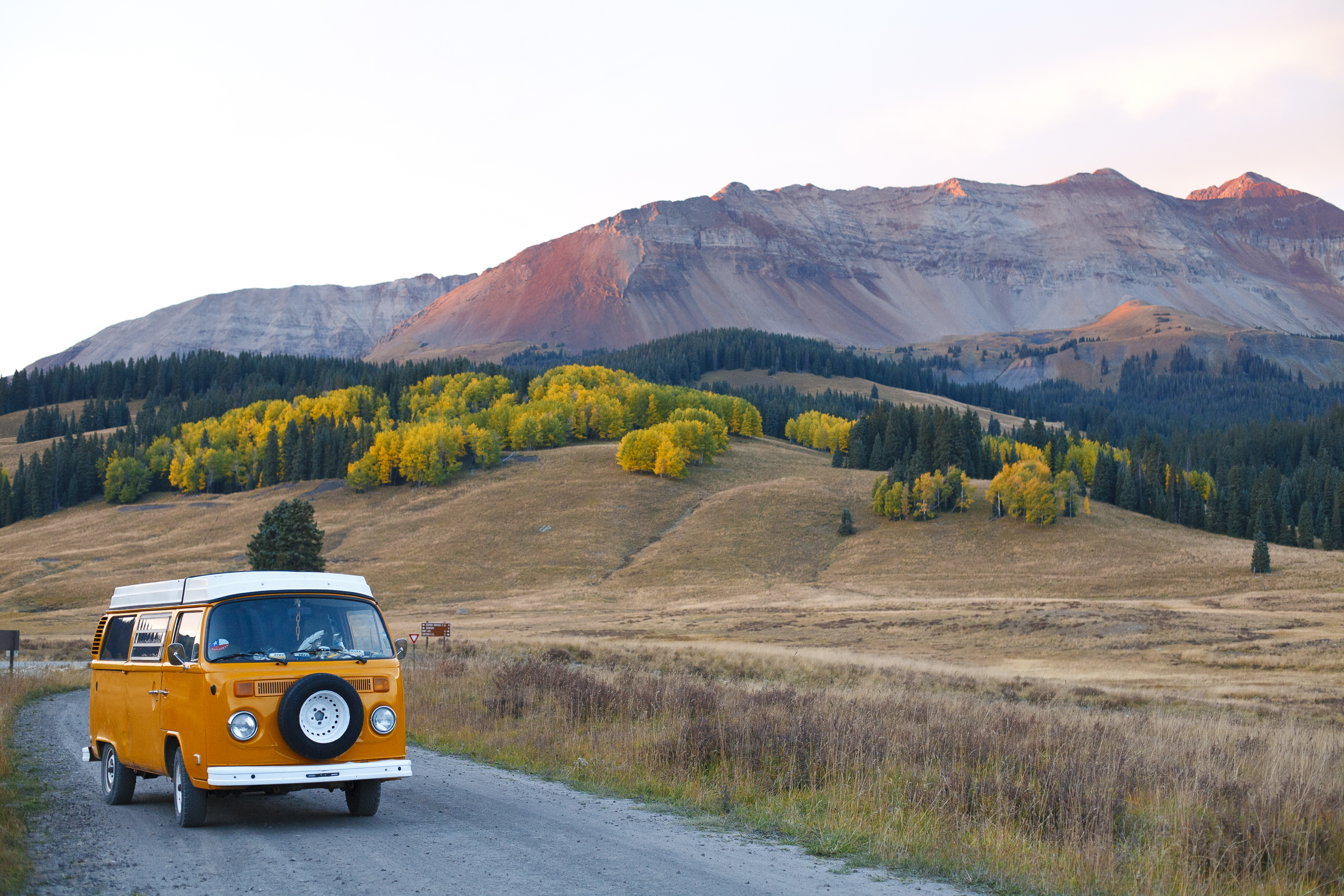
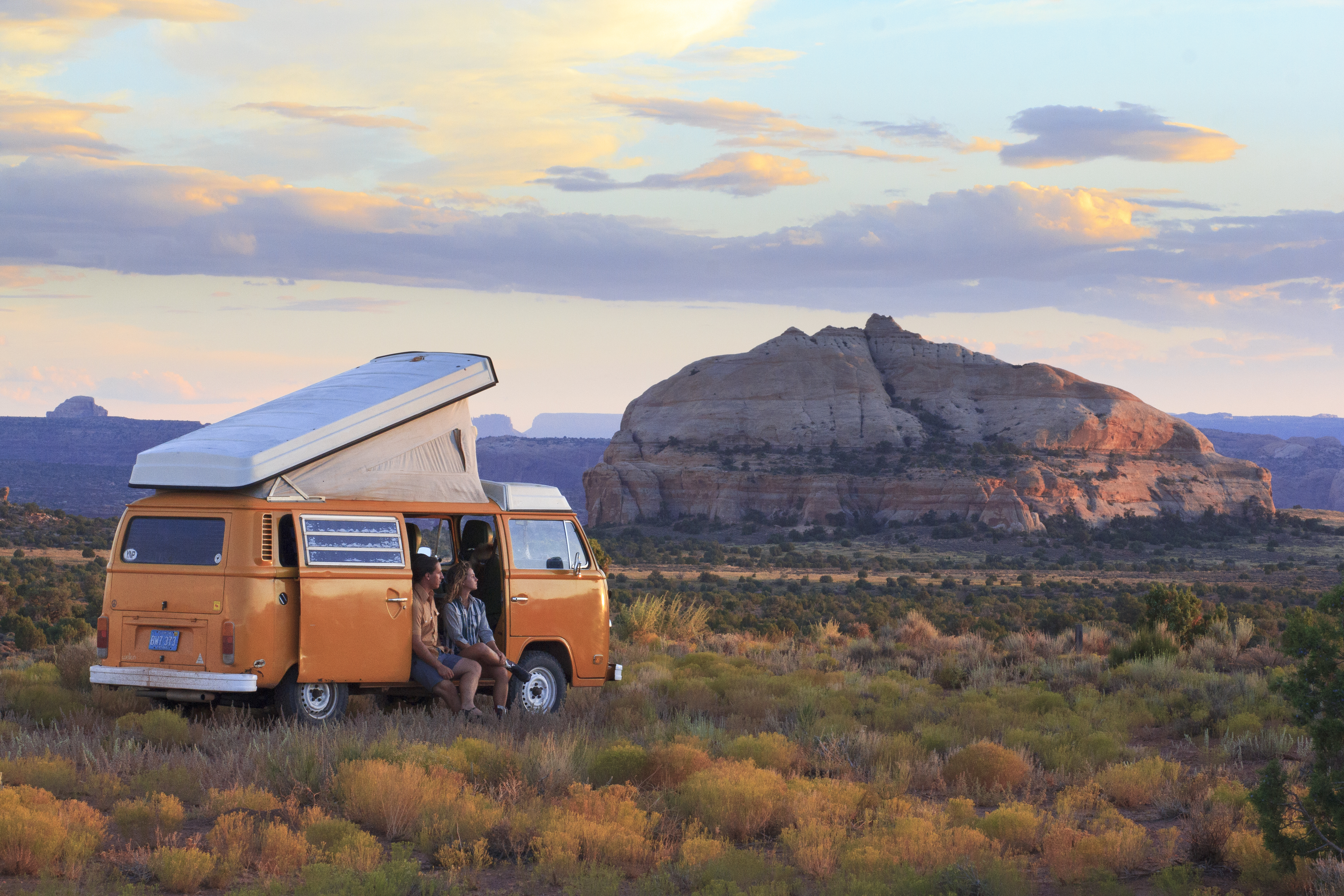
by JR Switchgrass | Oct 27, 2015 | Blog Post
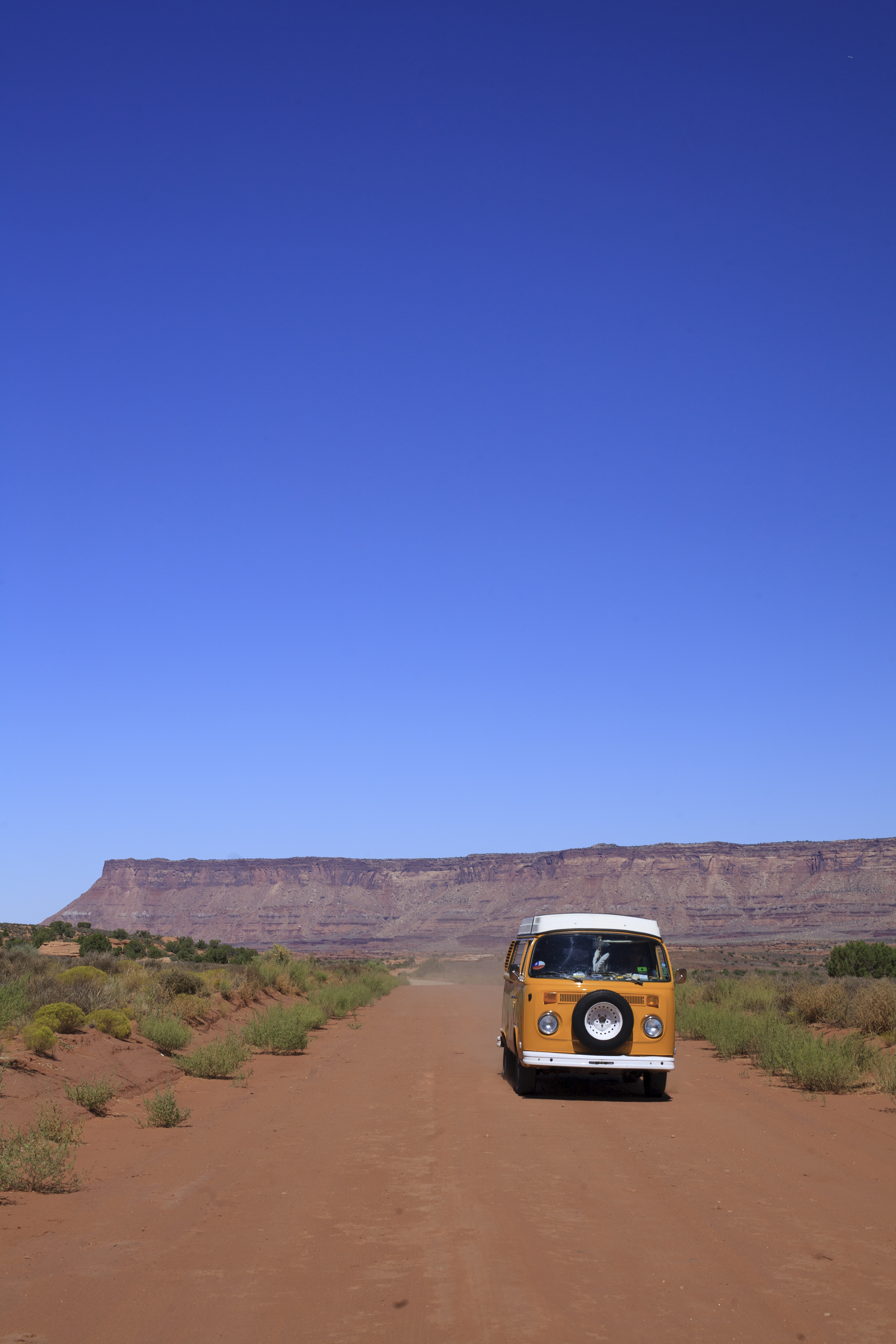
in 3 years on the road, we’ve learned more than in 18 years of schooling combined.
–
Secondhand knowledge is useful. Books and films allow us to view reality through others’ perspectives. They broaden our minds through the scope of varied lives, so different than our own.
–
Yet, art will never replace experience as the ultimate teacher. We need to touch, to smell, to gaze upon the real world, upon genuine people, in order to ever truly know anything. So get out and live, for only living can teach us how to thrive.
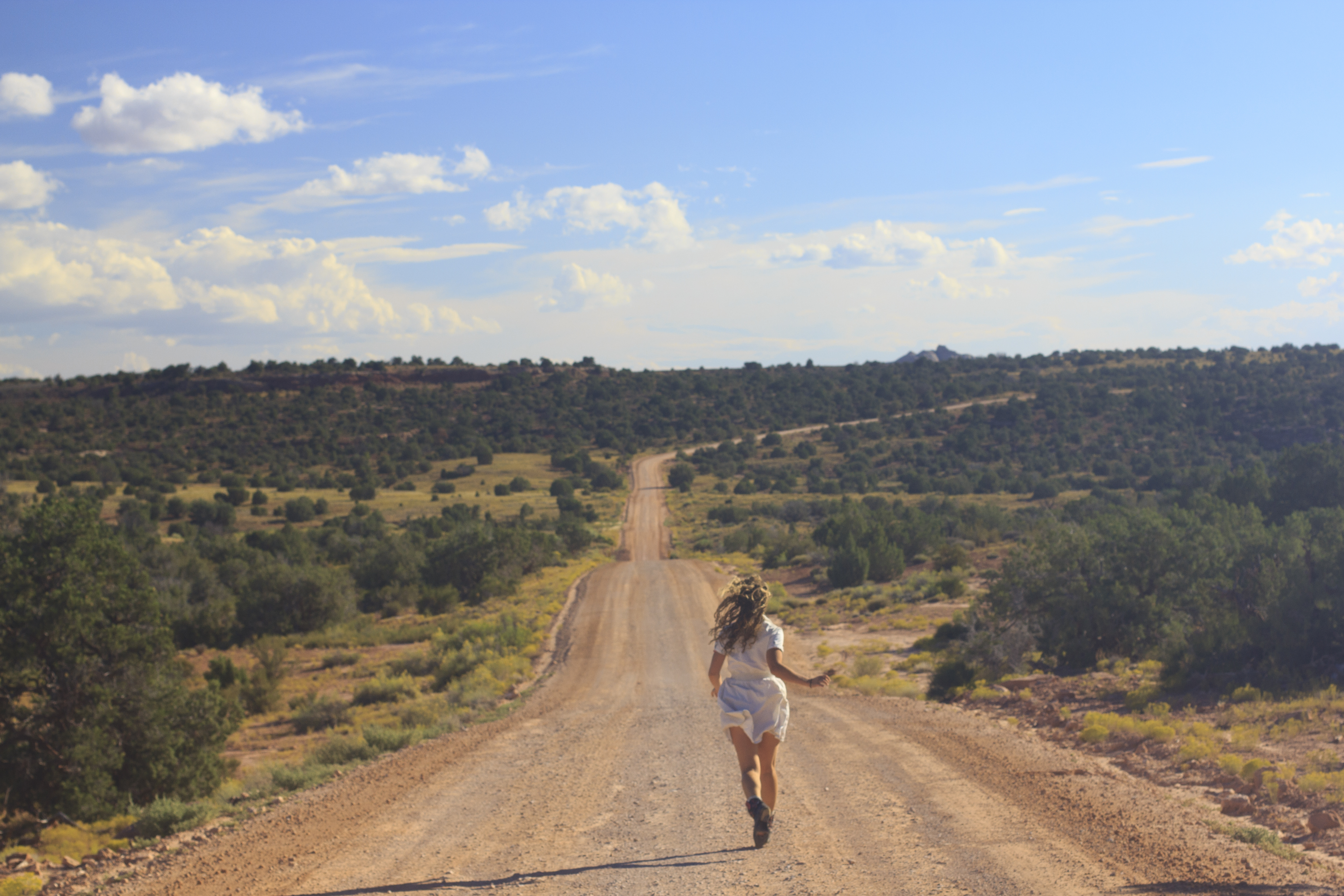
I hit a snake last night. Our first time running over an animal in the wild. We’re always so careful and slow.
–
Its body was severed badly. I felt its pain as though it were my own, tears heavy on my cheeks. We stopped and James sliced its head off in one bold stroke, put it out of its misery. The bones of my chest were crushed with agony.
–
The loss of the wild is something that whirrs through my mind ceaselessly. Sometimes I pretend I’m not part of it, that I am wild, that I help the wild. I know it’s not true. My heart calls to the snake, to its gentle spirit. How can we do it, snake? How can we stop destroying you? How can you continue on, so wild? But the snake doesn’t answer. It’s gone from this earth, like so many wild things before it.
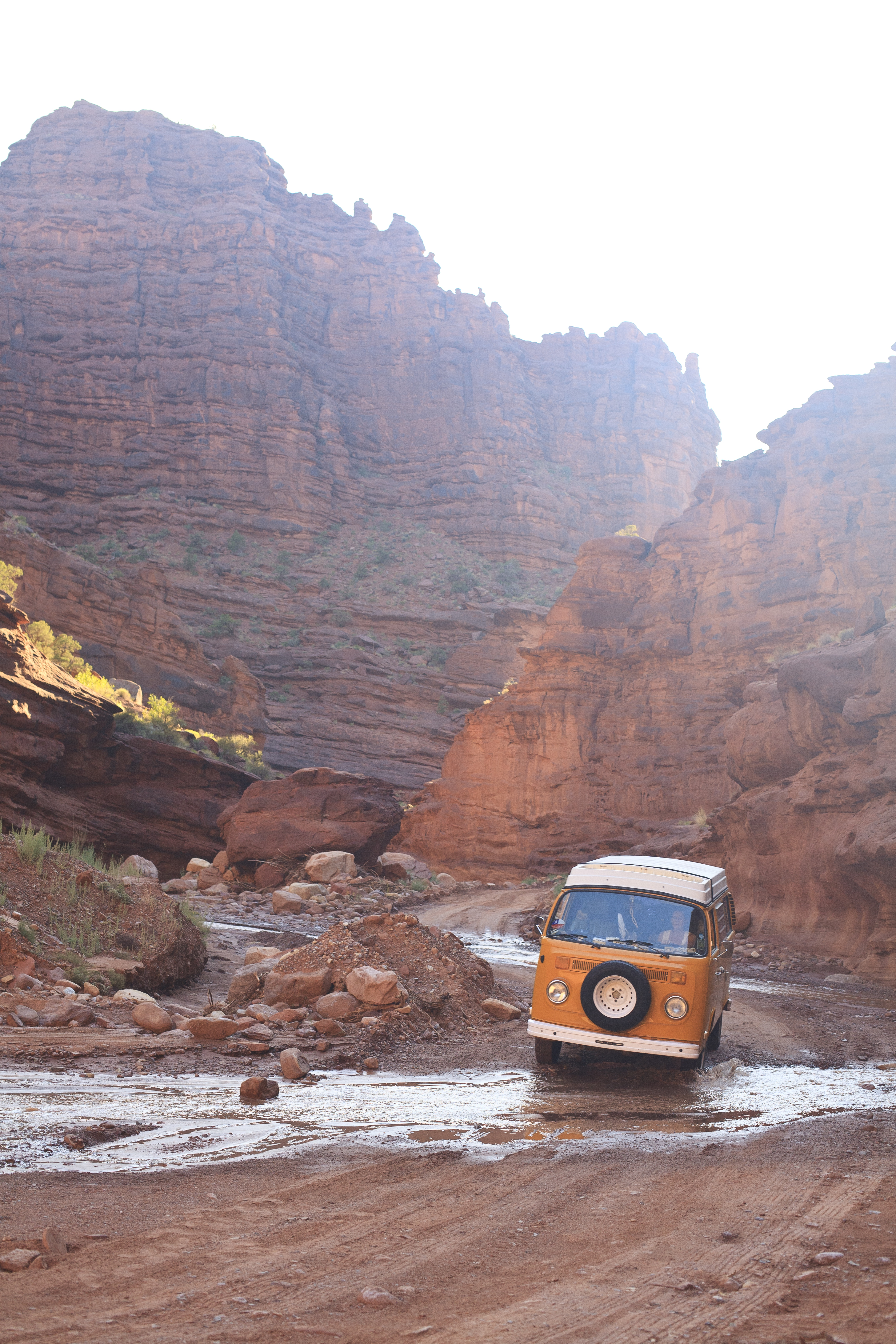
We woke in a narrow canyon, near a creek gurgle that seemed the only sound in the universe. –
Tamarisk trees were drawn in ink around us, and we warmed up water for black tea to go with our stale toast.
–
A raven flew overhead. She seemed to laugh smugly at us little humans, bound to the ground by gravity. I wished, in the cloud covered morning, to come back next time as a raven, to soar above these red canyons with such smug power, to know I am better than land dwellers because I work so intimately with that invisible tonic of life, the air.
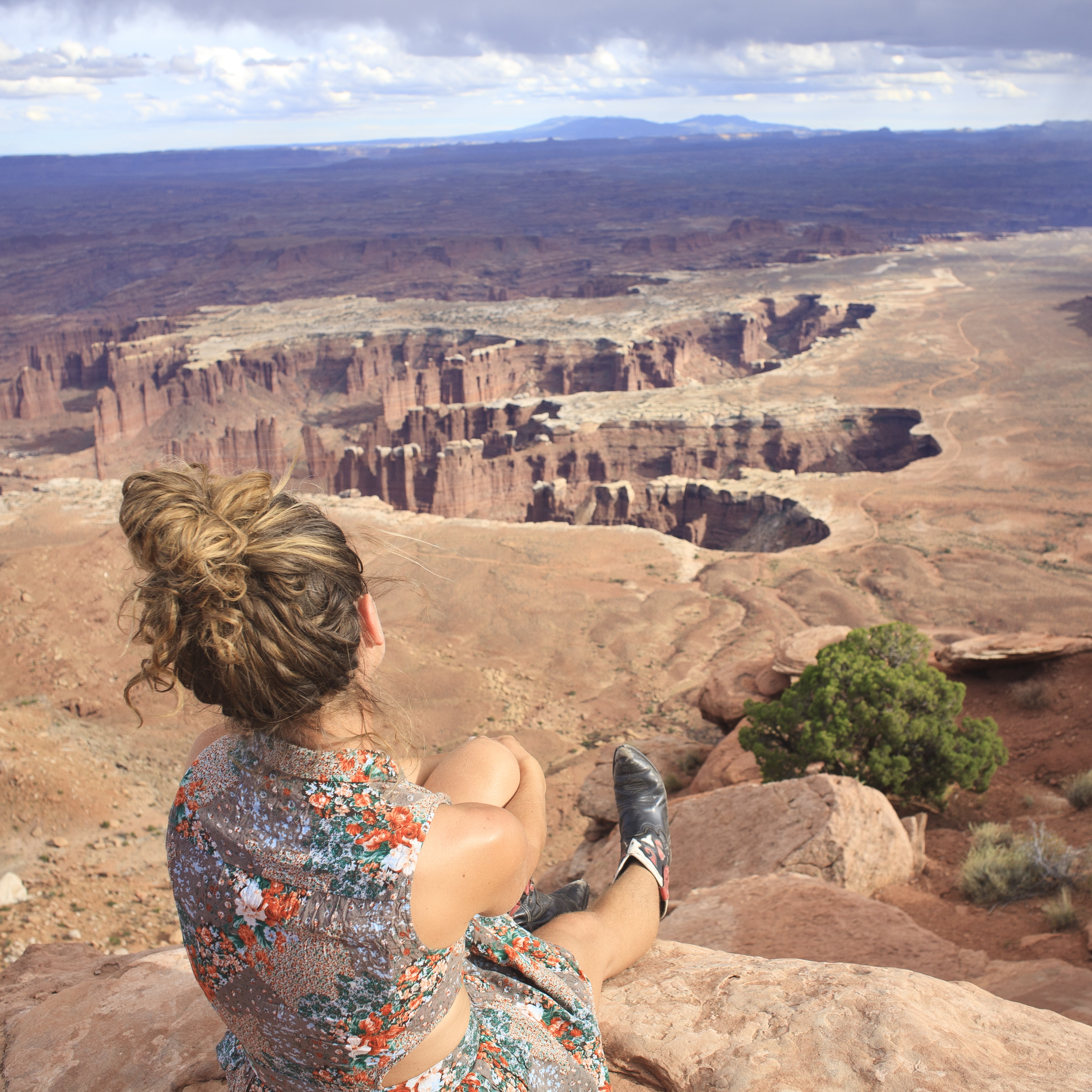

We sat, slept, and meditated in this same spot on a lone mesa for two full days. We didn’t see another human soul.
–
To do nothing, to remain still and receptive in wild places, requires humility and openness. It necessitates a confident acceptance of both yourself and your surroundings.
–
Be passive and you will know that there’s nothing you can do to earn life. It is a gift to be gratefully acknowledged and received.
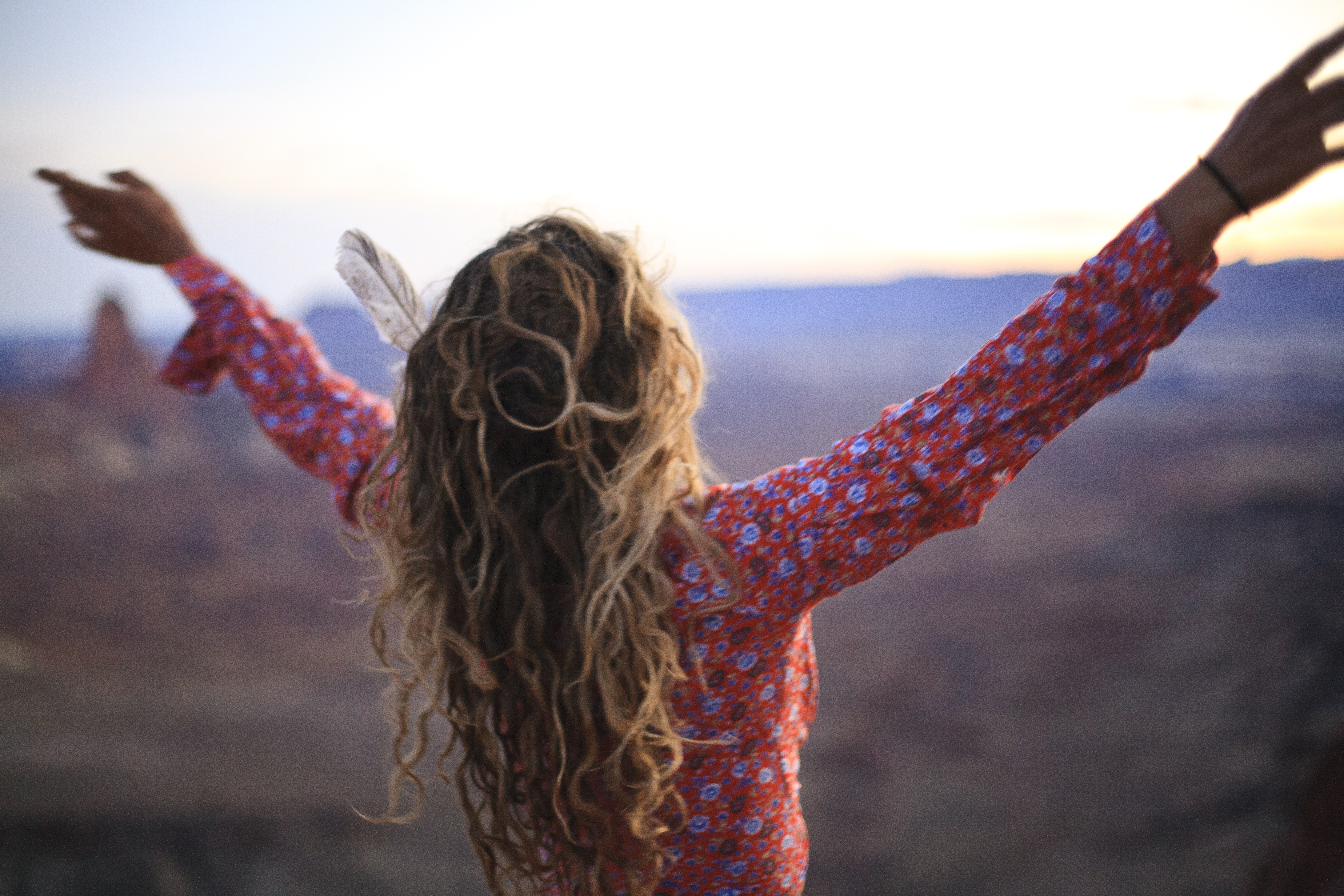
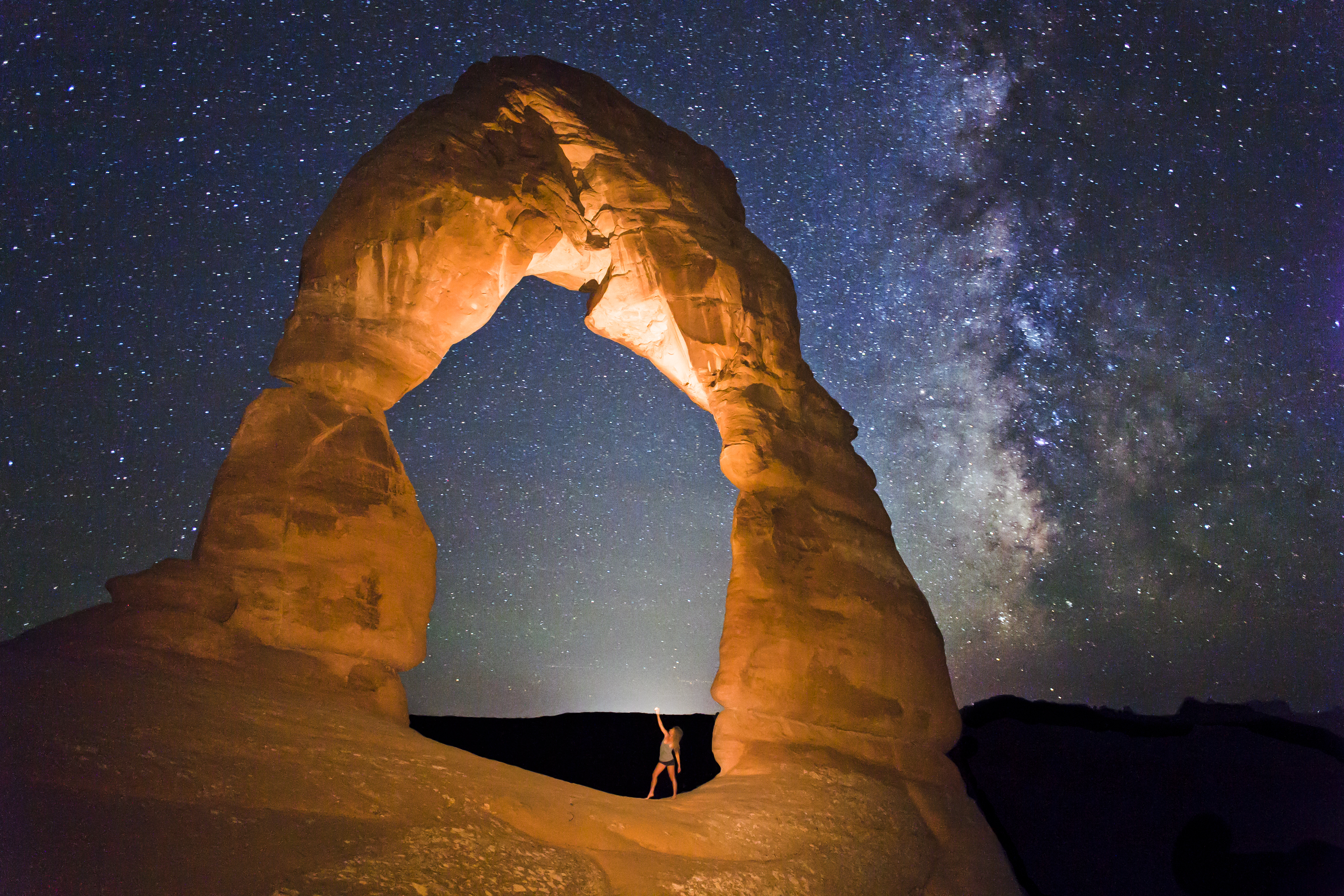
We are ephemeral. Our lives are but a blip, a tiny flash of energy in the darkness of night.
–
Above us, long dead supernovas shoot past, expired light traveling for millions of years across inert airless space. Hercules and Cassiopeia sprawl out over the velvet sky seductively, glistening with each blink of my eye. The Milky Way is royal and drenched with the opalescence of pearls.
–
Find a spot where cities are scarce and streetlights are unknown. There, you can gaze into the heavens and remember that time is only an illusion, an excuse to forget that we’ll be gone as suddenly as we came.
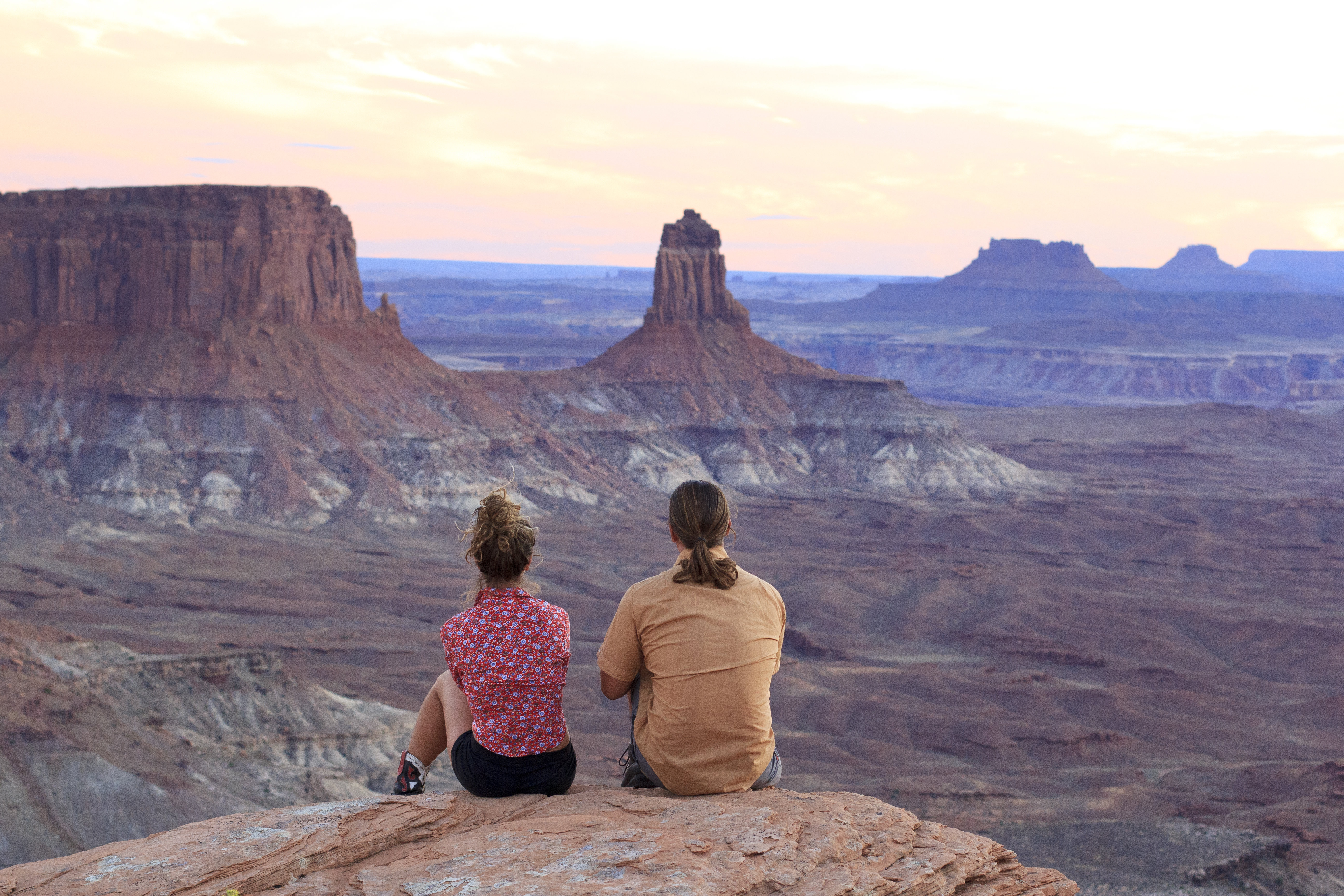
We didn’t know where we were, exactly. Off trail and hungry, we argued under a juniper tree that seemed embarrassed, its trunk leaned into a pinyon for support. The night seemed ruined.
–
Suddenly, a rock fell below us, smattering loud cannonball shots through the silent desert. We looked out into a wide canyon that burned with evening light.
–
We were standing on a cliff that sang with beauty, each corner colored a deep and rich shade of purple. Humbled out of our argument, the evening shone as our egos retreated.
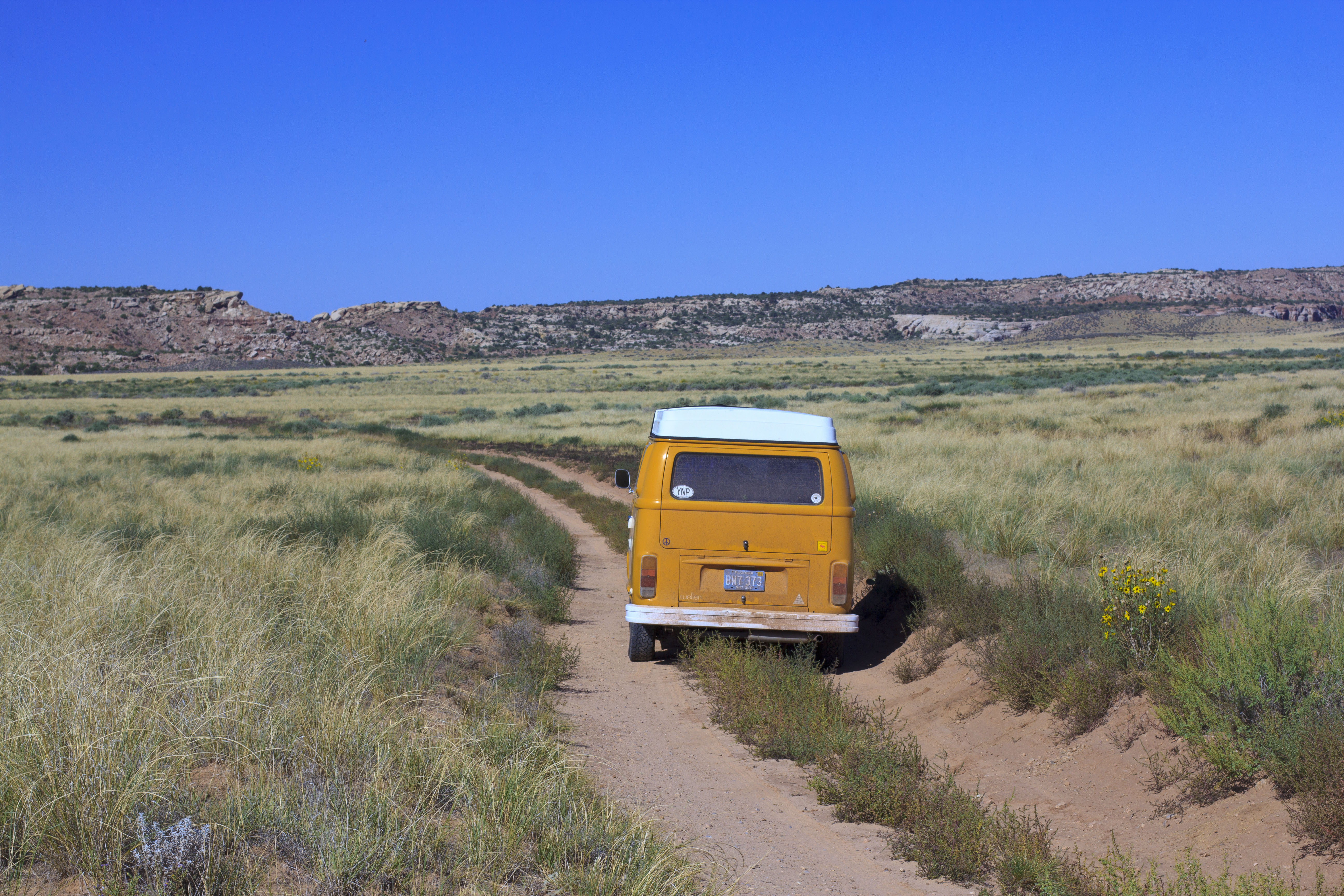 Every road tells a story. Of ranchers and pioneers, of natives and bison, of long extinct mammoths and giant sloths that once roamed the grasslands. And now us, passing through not for survival of body, but of spirit.
Every road tells a story. Of ranchers and pioneers, of natives and bison, of long extinct mammoths and giant sloths that once roamed the grasslands. And now us, passing through not for survival of body, but of spirit.
–
We want to know our history, so we can learn how to best move forward. We come here, to the places where language is unspoken, to find those things civilization cannot teach us.
–
A lone pronghorn antelope strides through the cheat grass, boldly gazing at us in the still morning. He browses the sparse shrubbery, a bite here, a bite there, then begins to run in the same direction of the road, disappearing in the grass. We’re going there too, to those bluffs in the distance, following the pronghorn, for maybe he knows the story of this road.
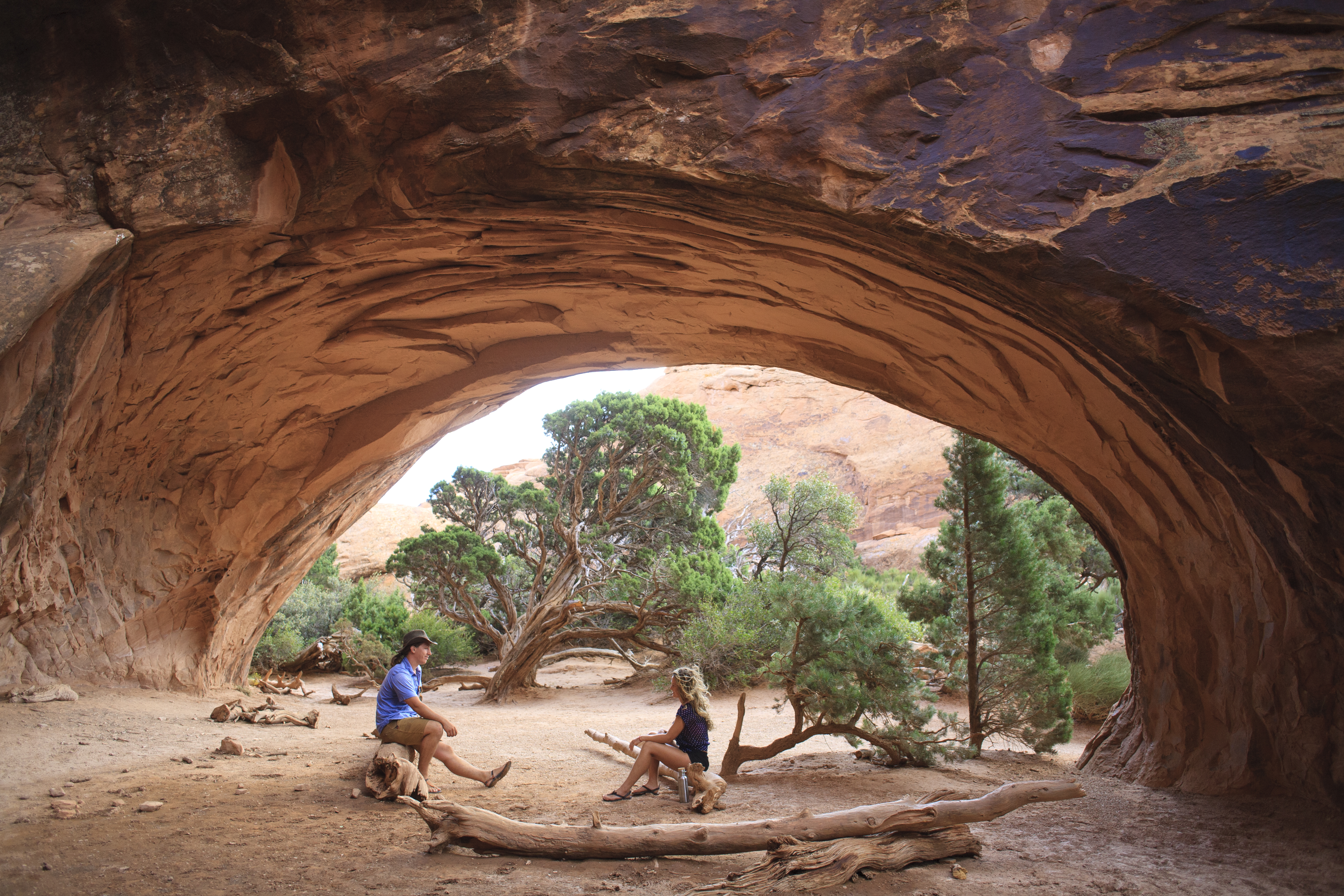
These giant Os of Navajo sandstone put geological time into perspective in a way nothing else can.
–
To our minds, the formation and destruction of an arch is frustratingly slow, pillars and windows eroding over thousands of years. From the earth’s point of view, this process occurs in a matter of hours.
–
We are so insignificant in the big scheme of it all, so tiny against these crumbling layers of rock and history. Take comfort in that thought, that our lives aren’t as big and important as they sometimes seem
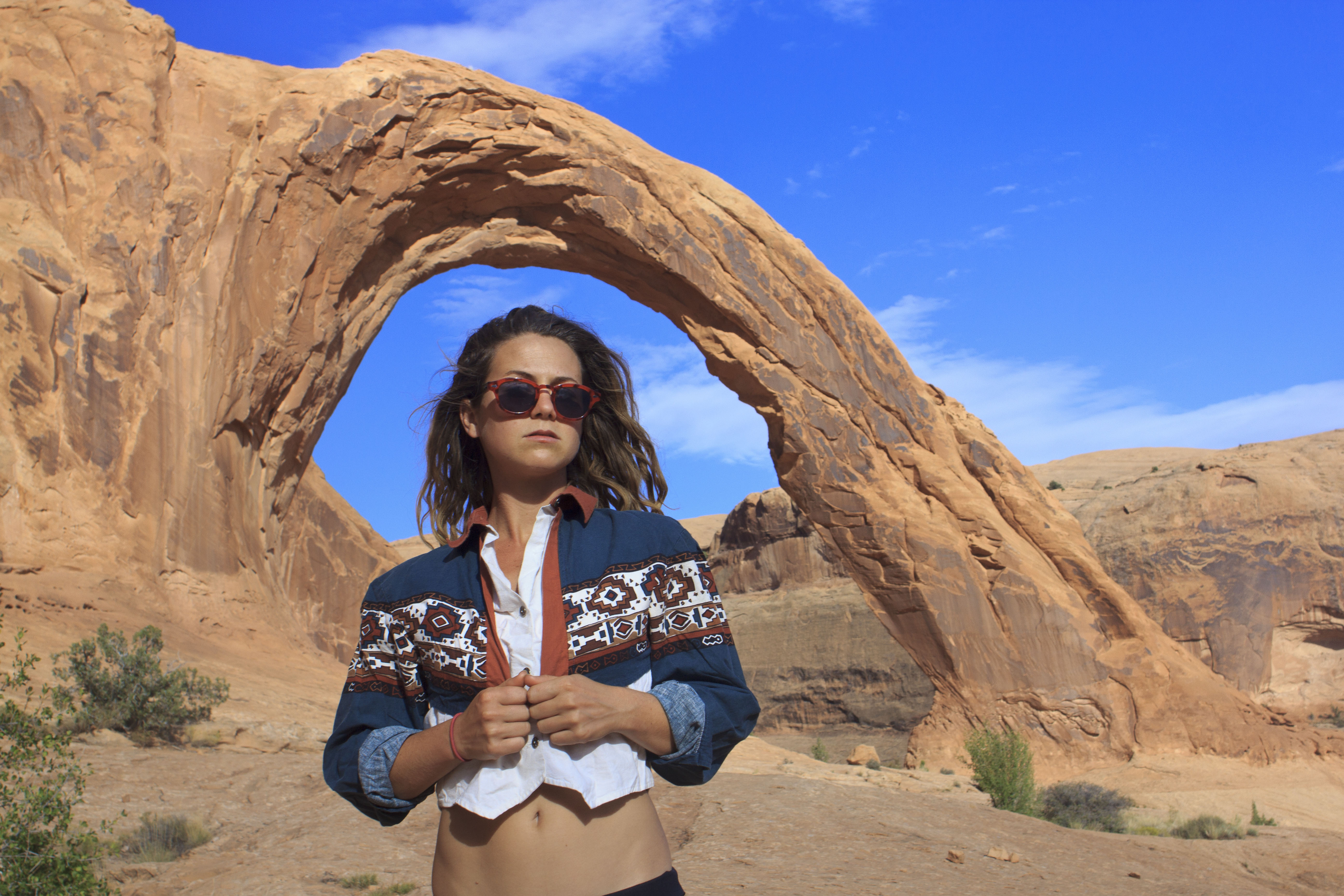
The coyotes were excited last night, frisking about in the milky half moon glow. Dozens of them yipped and yowled in the juniper flats around us.
–
I sat up and grinned like a fool, peering out at their mangy outlines, the wild way they trotted and hopped through the sage and rabbit brush. They seemed to dance for fall to come, for cooler weather and filtered sunlight.
–
We need these interactions with wild animals. We thirst for them like sweet water, we crave them like vital nutrients. They remind us of the parts of ourselves we’ve lost in civilization, the intuitive knowledge we sacrifice in domestication. Watch. Listen. Care. Wild animals tell us things we desperately need to know.
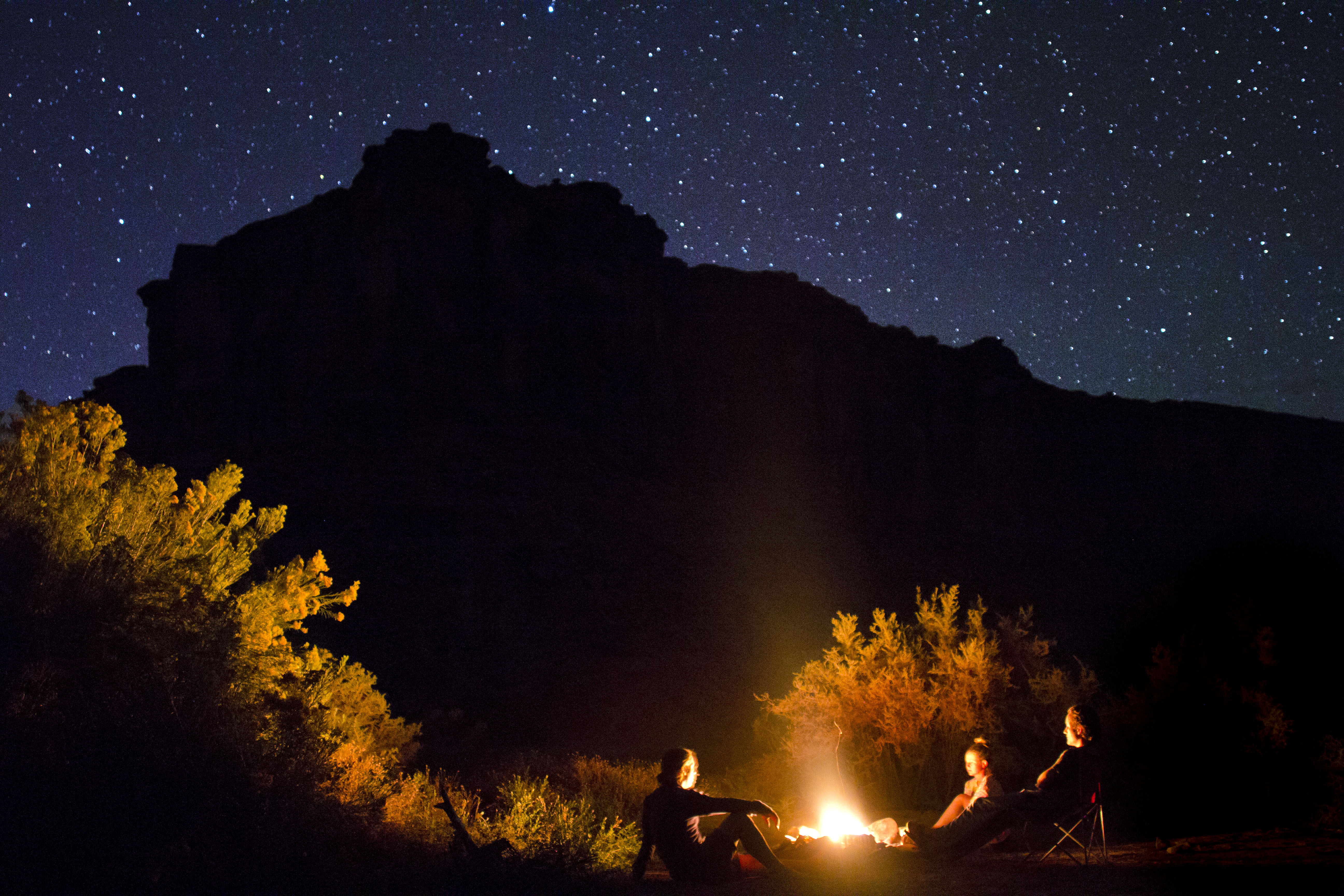
We sleep in the bus, in some wild place, nearly every night, but we rarely construct fires. They’re reserved for cold nights, for special days.
–
By the Green River, we built a fire of dead Cottonwood. It sparked and crackled, bits of recycled sun glowing in the low stone pit. We celebrated the fast moving river and the full moon. A new cycle and a new fall season.
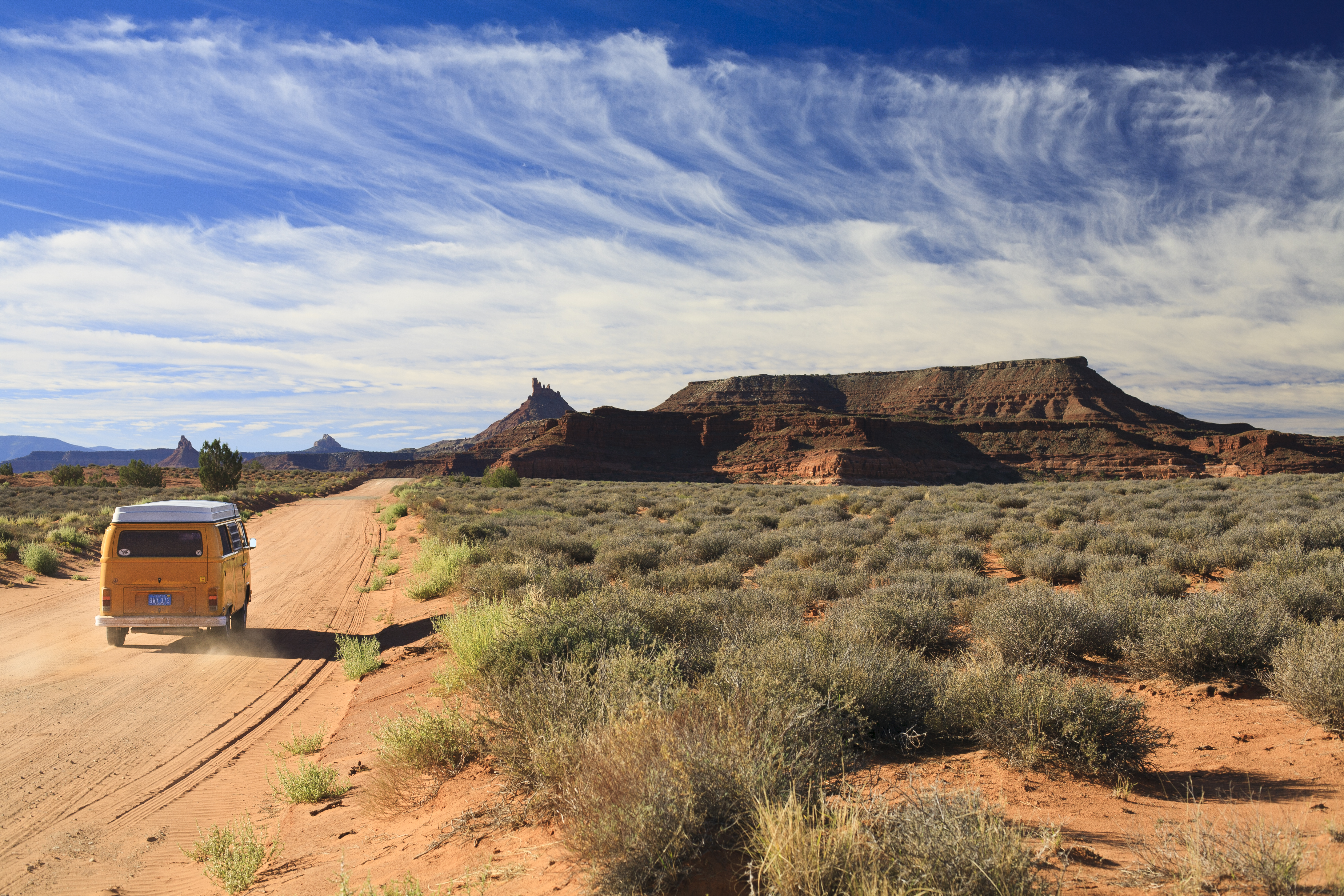
We’re looking for something out here, something rare and endangered that the city can’t offer us.
–
On backroads that lead to backroads that lead to space, we find what used to be common; peace, wildness, sanity.
–
The modern world is insane. You don’t need to listen to the news to know that. We can’t handle the madness, the oppressive development of the civilized world. We flee to these small corners. Out here, we become whole.
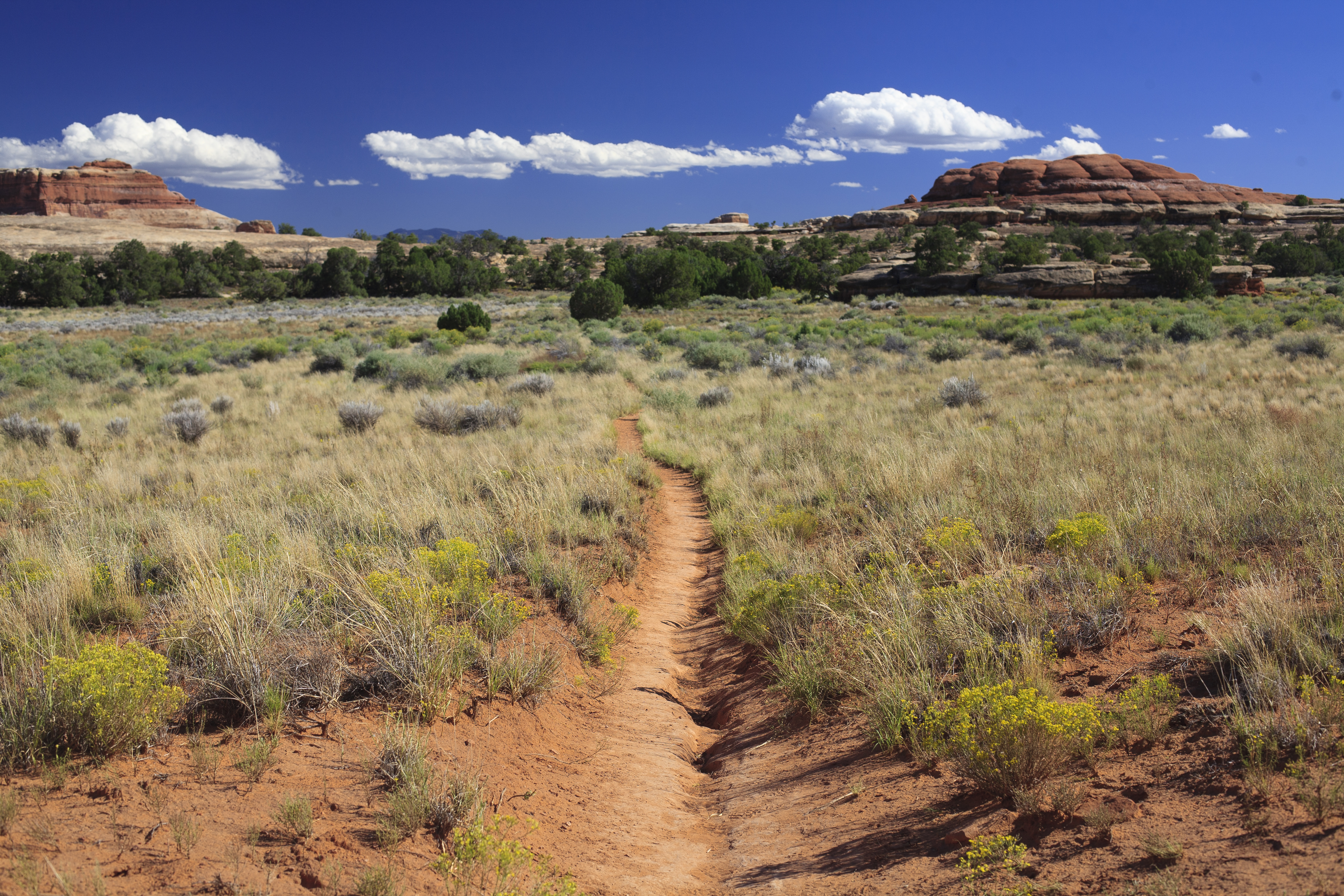
The desert floor, the dirt itself, is alive. Literally. A thick layer of bacteria, lichens, and other microscopic critters, called a cryptobiotic crust, cover the sand.
–
Think about that. The soil is ALIVE. It breathes. It eats. It has a job.You can see it, protecting the desert floor, a patina that rises in columns among the prickly pear cactus and sage brush. The whole lot of it, every inch of ground, is a microcosm of the universe
–
Look around, at the mundane details of the earth, and realize they are fantastic. Spend time watching and reawaken your sense of wonder. The universe is woven of fine threads of quiet miracles.
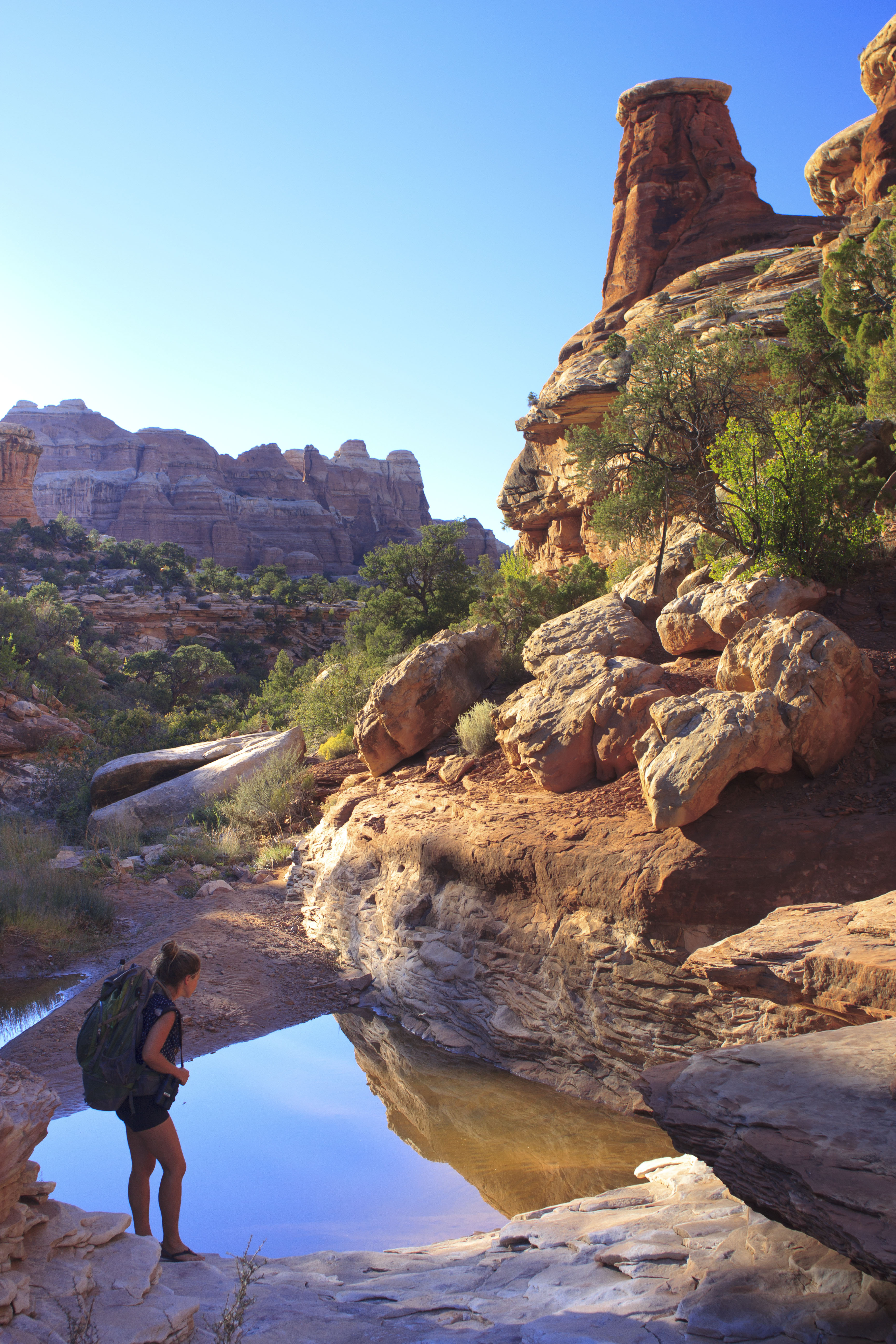
We walked to where machines make no sounds, deep into Squaw Canyon in the Needles. A 13 mile hike.
–
There, we found a cool spot to rest, an oasis in the heat of the day. James slept under the wide brim of his beat up felt hat. I ate pine nuts one by one. They littered the ground under the pinyon tree that shaded us, a free feast. Pinyon jays, smart and mischievous birds named for these trees, these nuts, laughed together in the branches above.
–
I thought of this, of us living beings eating free food in a canyon maze. As the jays guffawed and I crunched more nuts, a world of endless tough labor seemed unnecessary and cruel. The earth isn’t a place of scarcity. It is abundant, generous. We have to learn to look. We need to begin to appreciate intricate, simple things like wild pine nuts scattered on the dirty ground
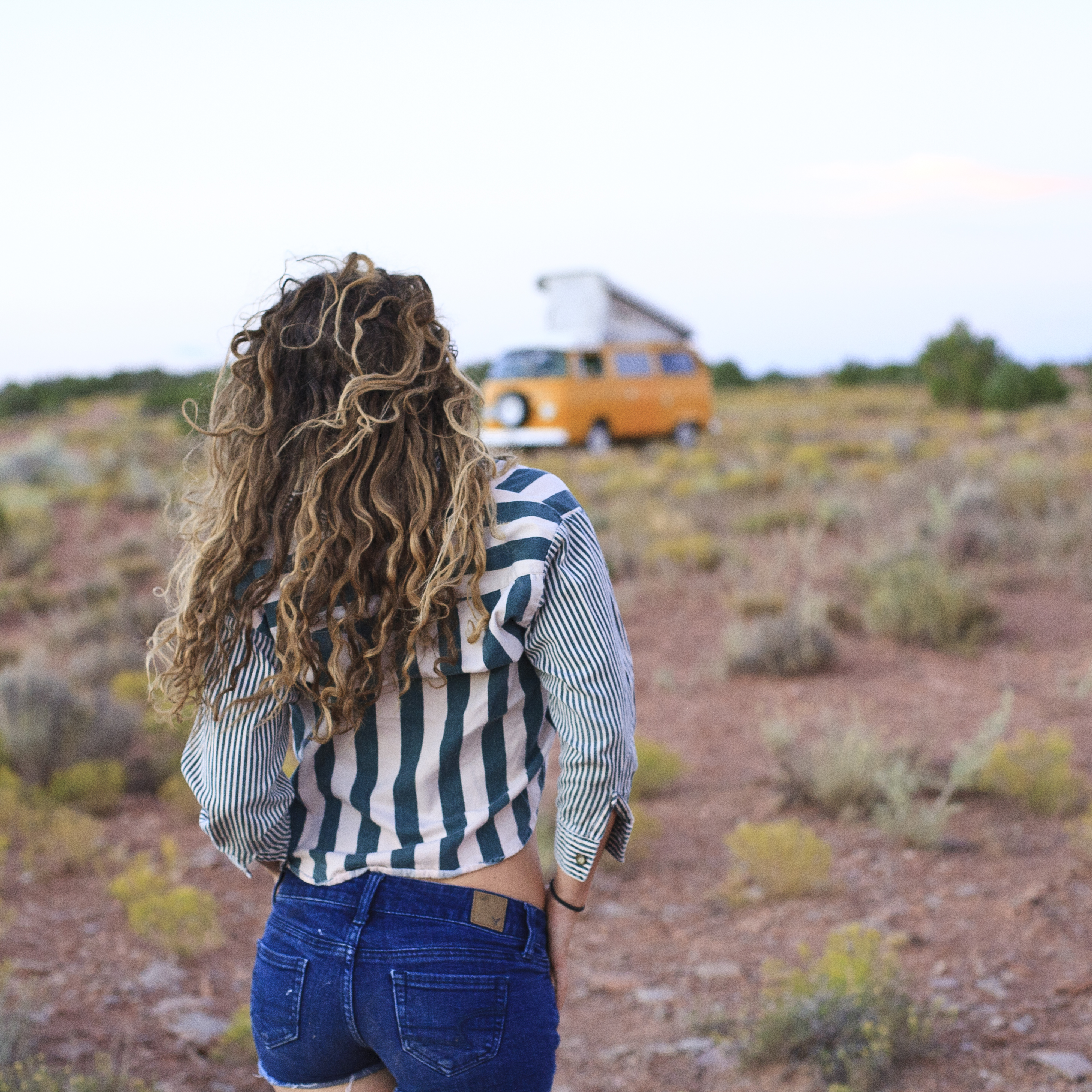
It was late, and we really needed somewhere to park.
–
We had spent the day in the library, working on projects, on this and that, the non physical things that need attention too. But time had gotten away from us, and we looked for a sleeping spot in the dark.
–
Thirty miles outside of town, we swung right at a gravel road. The pull-outs were full of big campers, ones that can’t make it up the faint side roads. We took the third double track road we passed, and followed it to a dead end of slick rock that shone like worn seashells in the moonlight. We pulled the E-brake right there on the rock and popped the top. Relieved, we climbed upstairs into bed, anticipating the morning, when we’d wake to the whole slick rock scene in the promising light of a new day.
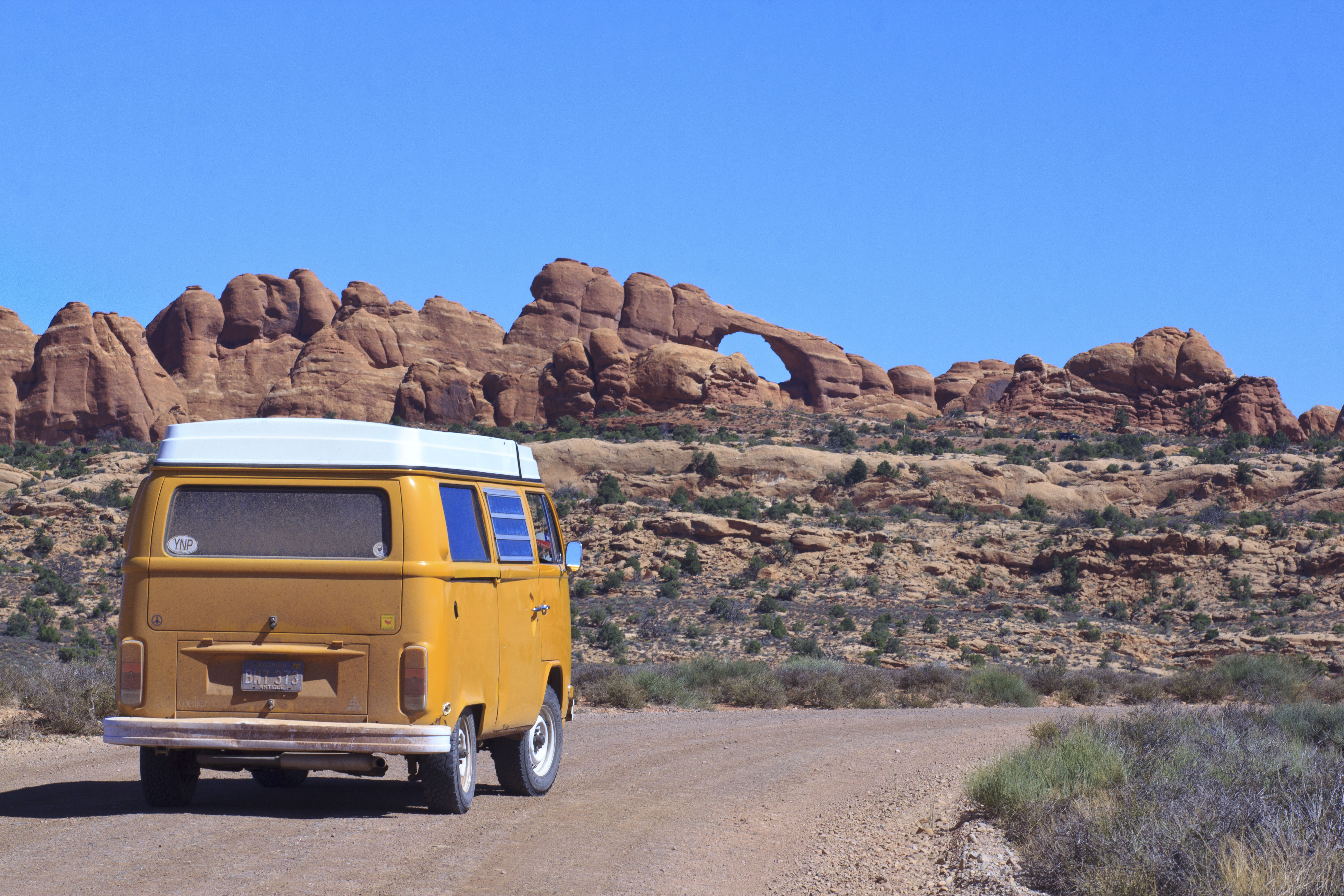
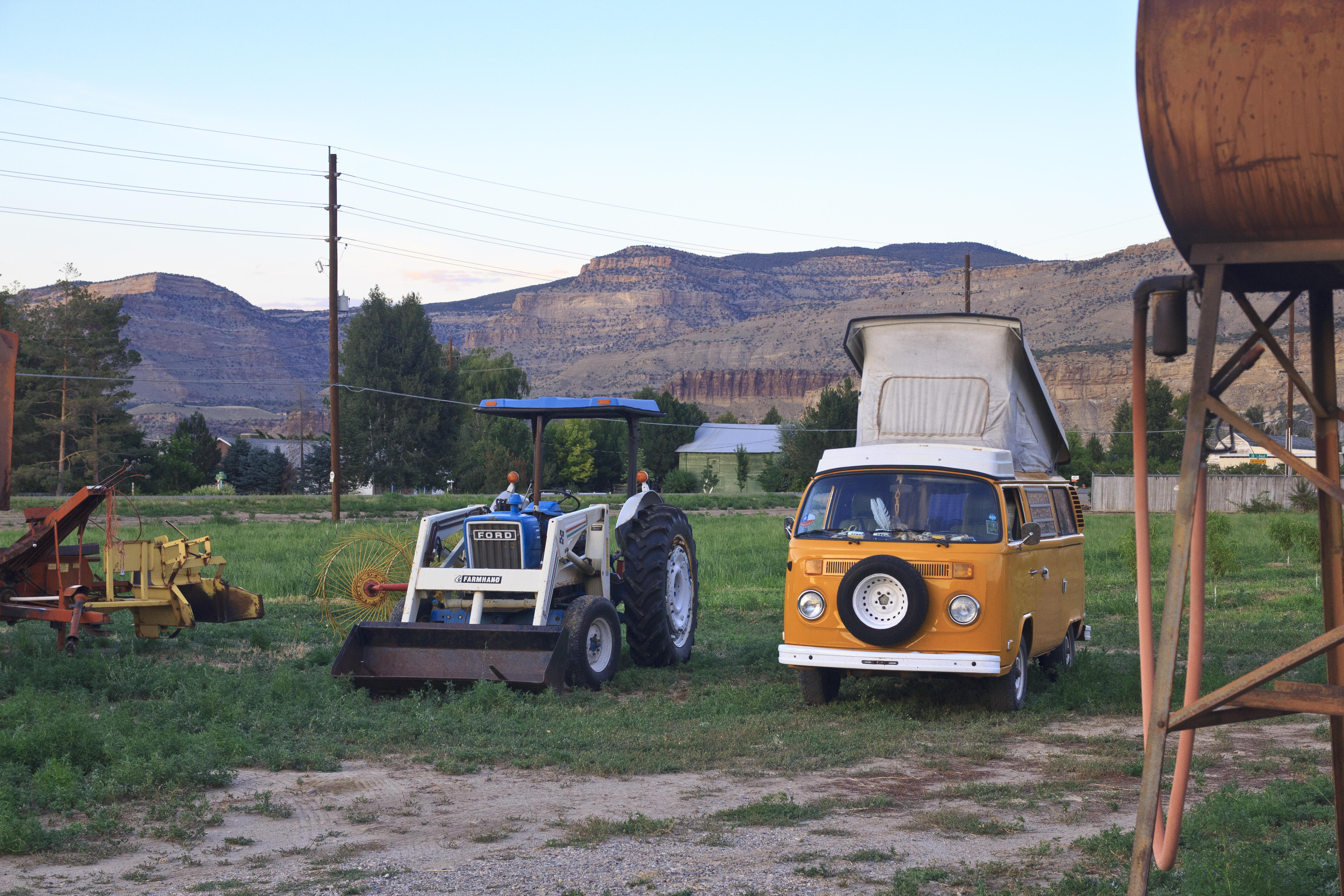
by JR Switchgrass | Oct 27, 2015 | Blog Post

When we learned it was peach season here in Palisade, CO we knocked on doors until we scored ourselves a gig.
–
The next three weeks or so, we’ll work full time harvesting 20 acres of peaches, and we’ll sleep right here, near the orchard. This income will help sustain us the next leg of our journey.
–
Until then, it’s all peach fuzz and sweat and sore muscles. But, we love it, we really do. Work should be balanced between the body and the mind.
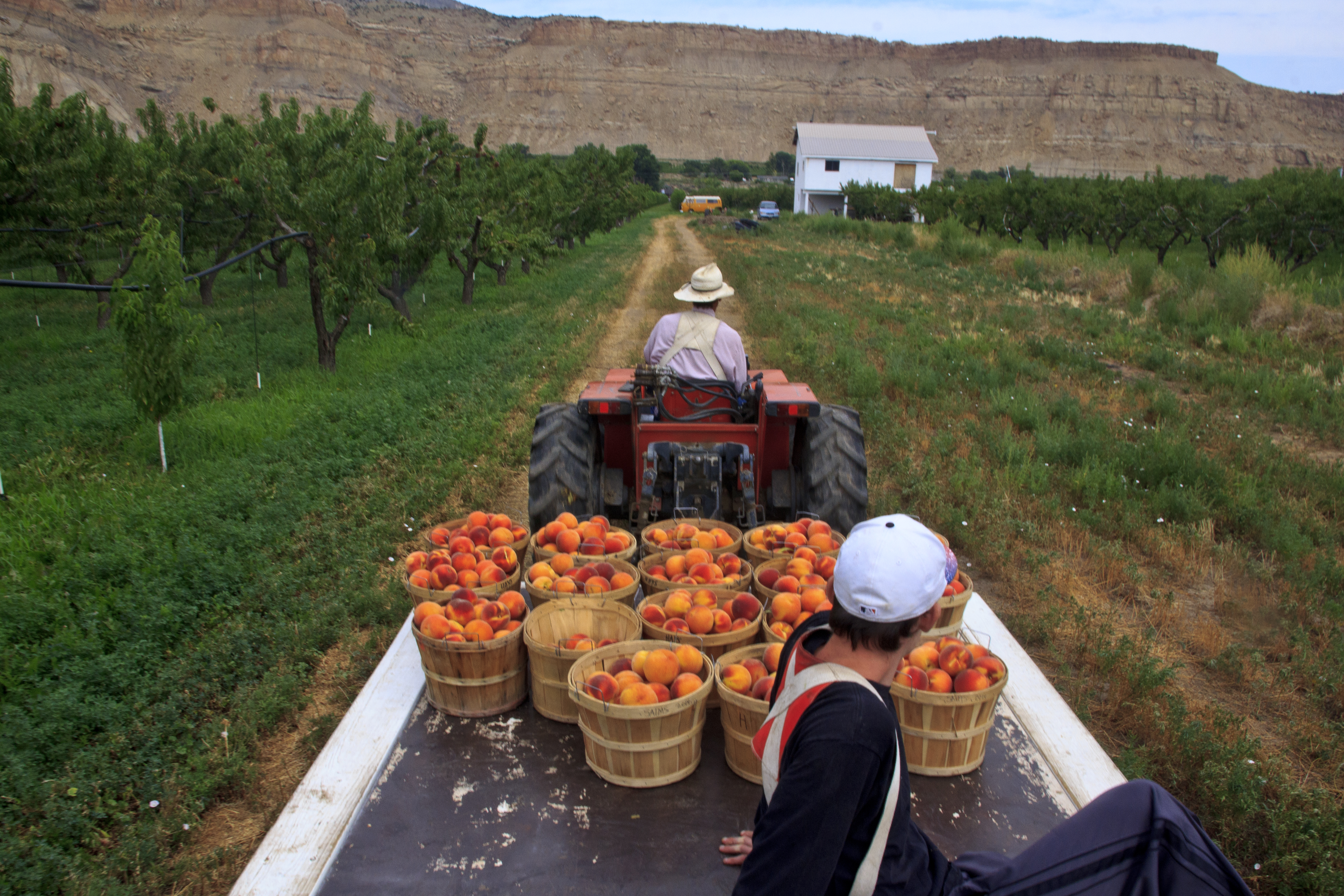
In the longstanding tradition of hobo culture, we took a seasonal job harvesting peaches on a small orchard.
–
It’s a bumper crop this year, which means that the fruit is falling fast from the trees. We hustle to gather ’em up, peach fuzz itchy under our collars, the sun blaring down on our crowns at noon. There’s thousands of them.
–
This tractor ride back, the coolness of evening on our cheeks, is when we heave a sigh of relief, that the picking is done til tomorrow. The trees wait here for us to return at dawn.

At 5am, the alarm vibrates its steady quiver in the darkness of our sheets.
–
The doves in the peach trees out back aren’t yet awake, but the coffee is hot and the day is still crisp.
–
We walk out into the peach orchard as in a dream, greeting this day of harvesting. Saturday or Monday are the same now; time is told by the trees. Our seasonal work focuses in on sweet fruit of the land, sunlight transformed into the peachy sugar nectar of summer.
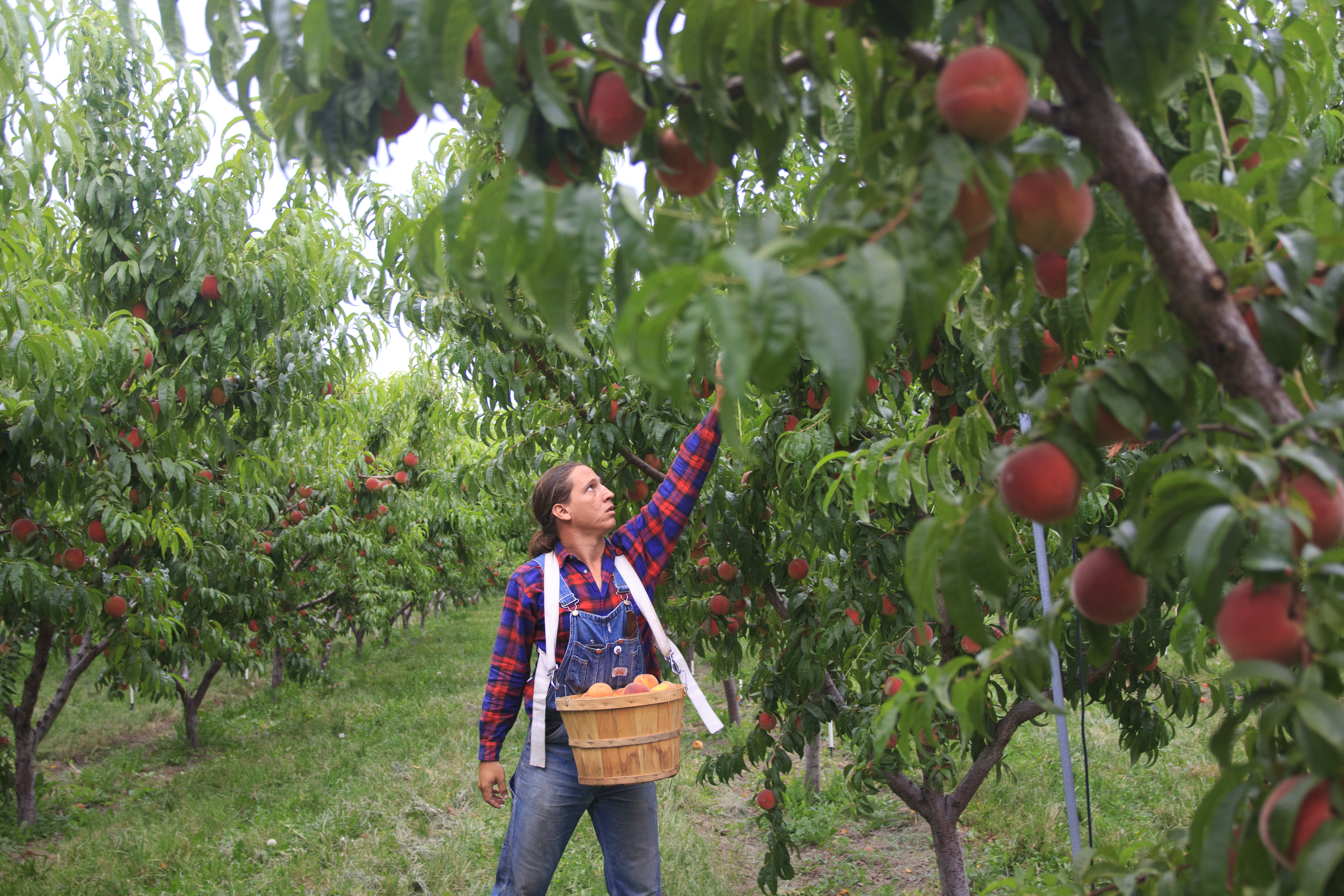
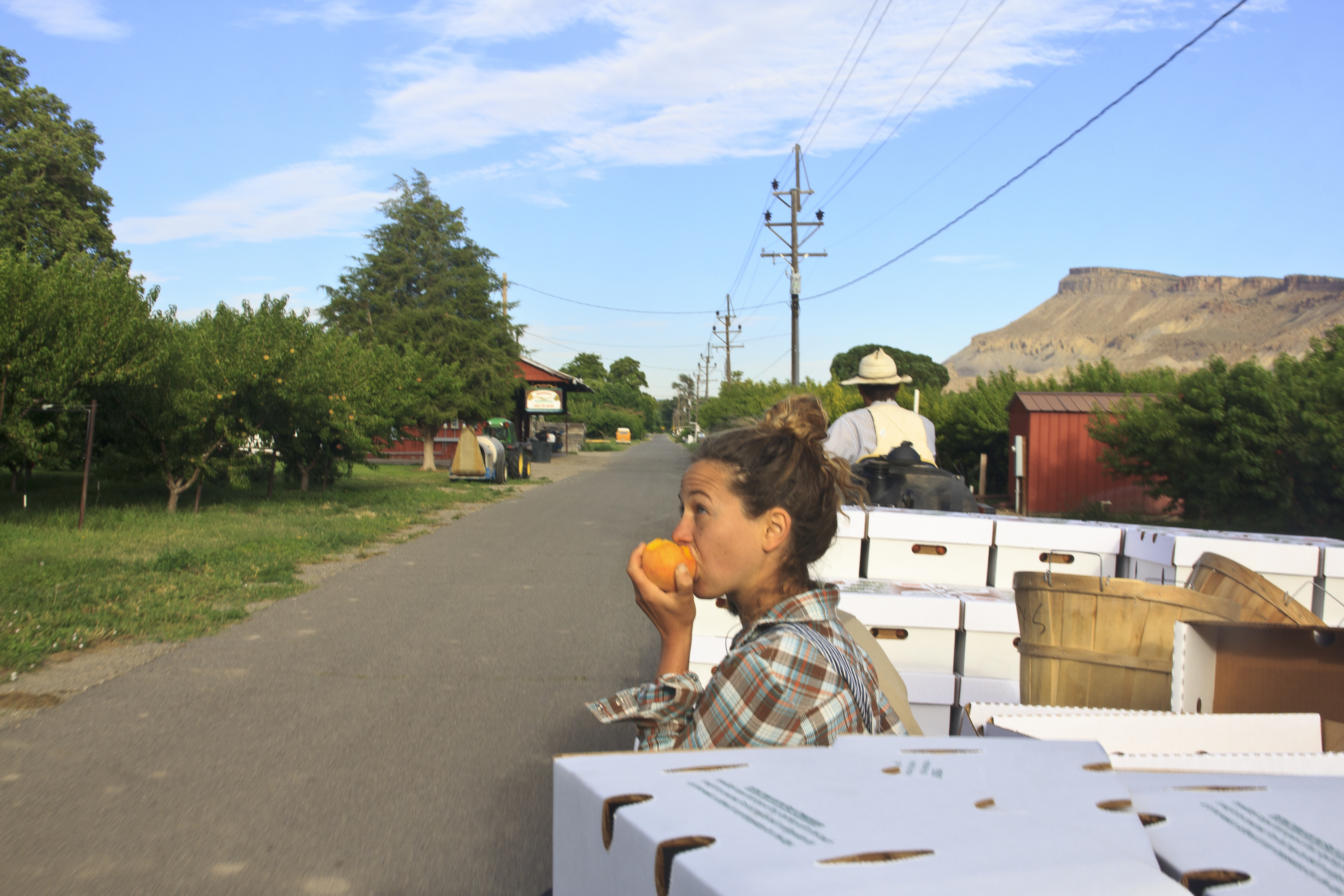
We have worked on 13 farms since hitting the road. From butchering chickens, to milking goats, to, now harvesting peaches, we’ve made a hearty income as hobos working the land.
–
The word Hobo entered American slang in the 1890s to describe a certain subculture of migrant laborers who traveled through rural towns for seasonal hire.
–
Tramps only worked occasionally, when they had to, Bums didn’t work at all. But hobos followed the seasons, peaches in August, grapes in September. October brought apples and pumpkins. And, by golly, when the weather turned rough up there in the foggy west, it was time to hop trains south for citrus season.
–
Life for us today isn’t so different, reliant on the land and on movement to create energy and sustenance for a ramblin’ life on the road
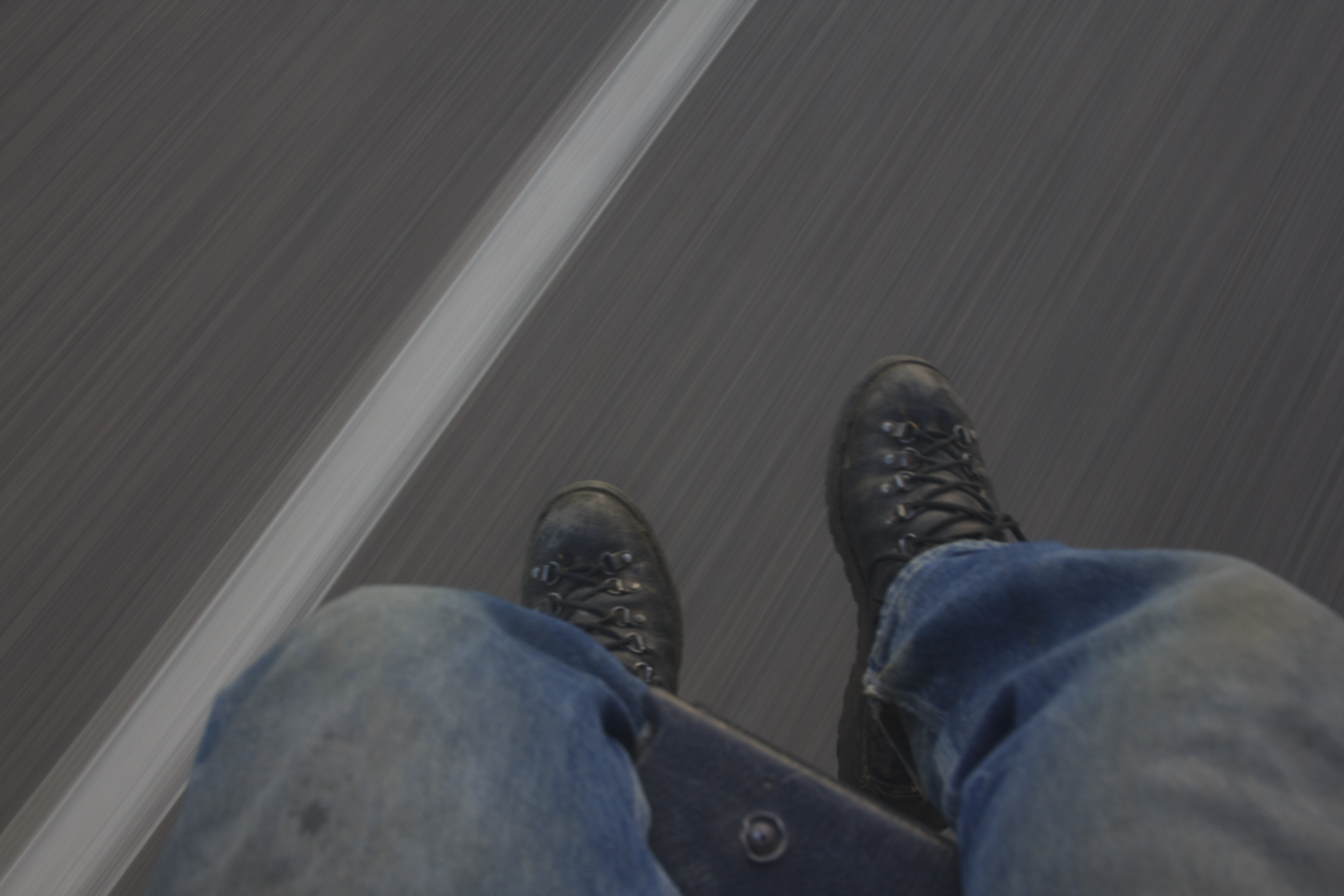
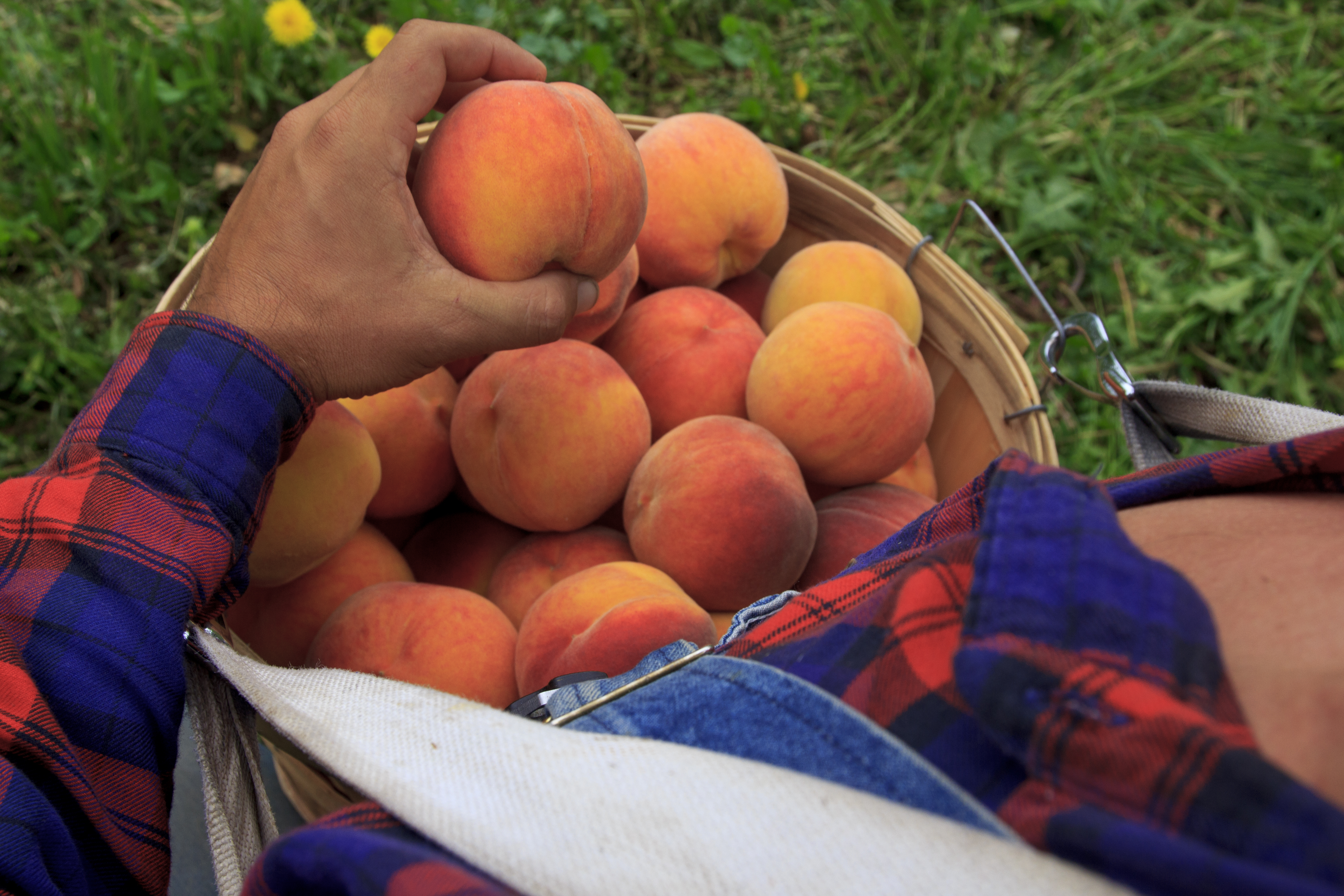
An estimated 10% of the harvestable food crop in our country will fall to the ground this year due to lack of labor. Five acres of peaches are rotting under the trees of this farm alone because we couldn’t get to them on time.
–
“Nobody wants work like this,” Tom, the owner of the orchard, told us. “Guess it’s too tough for Americans.”
–
It’s true; we’re the only white workers out picking. Everyone else came from Mexico to harvest, many through government programs that truck migrant laborers across the border. We’re grateful for this job. It’s good to be outside and moving, and the long hours deliver much needed cash to our bank accounts.

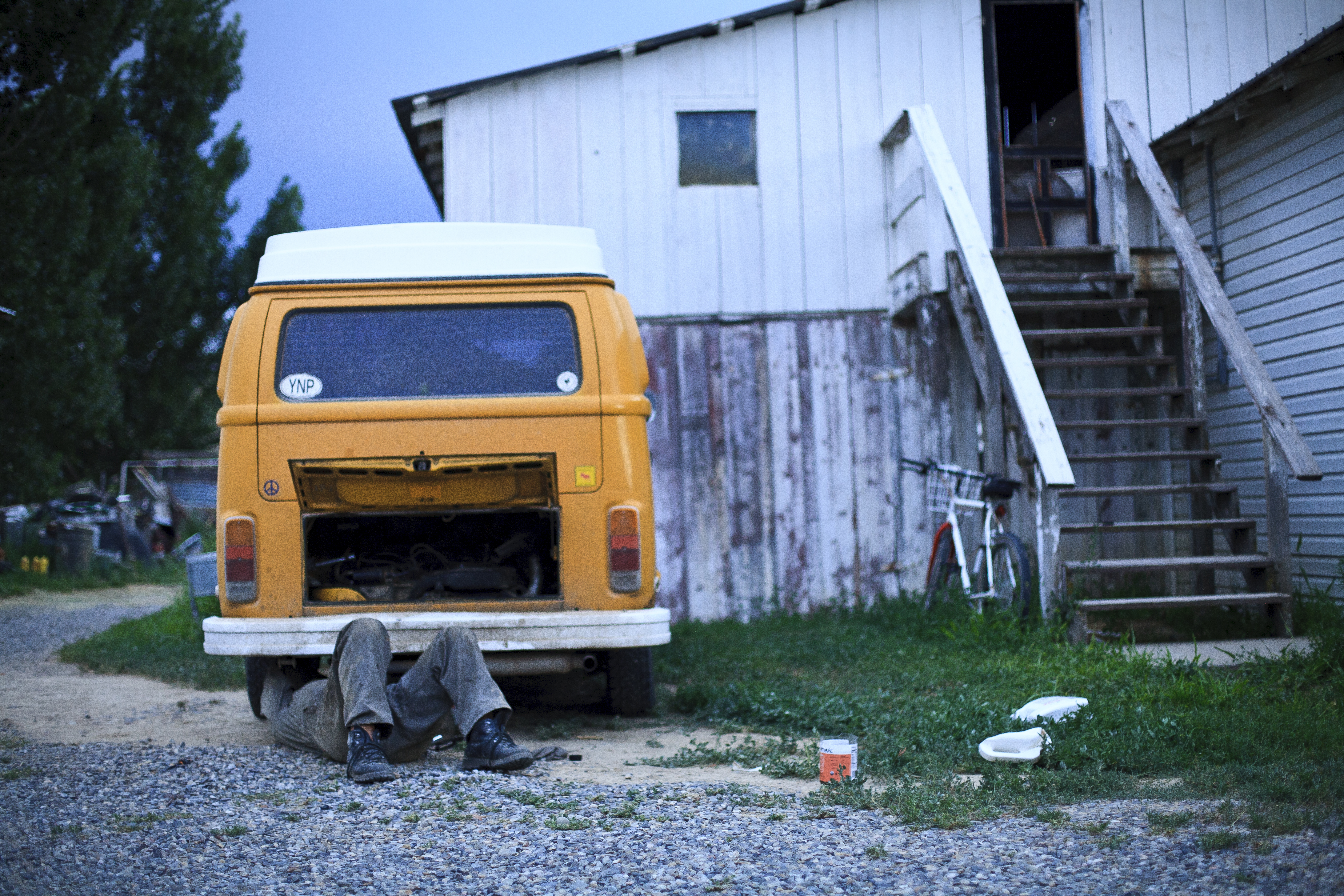
Saturday dawn under the bus. A clink of wrenches; slick and grimy grease; that clean and satisfied moment when the .006 feeler gauge passes through the valve gap.
–
Small as they are, these sensations are rituals,habits that connect amateur mechanics deeply to their vehicles, and therefore, their locomotion. This is the early morning work of ultimate freedom.
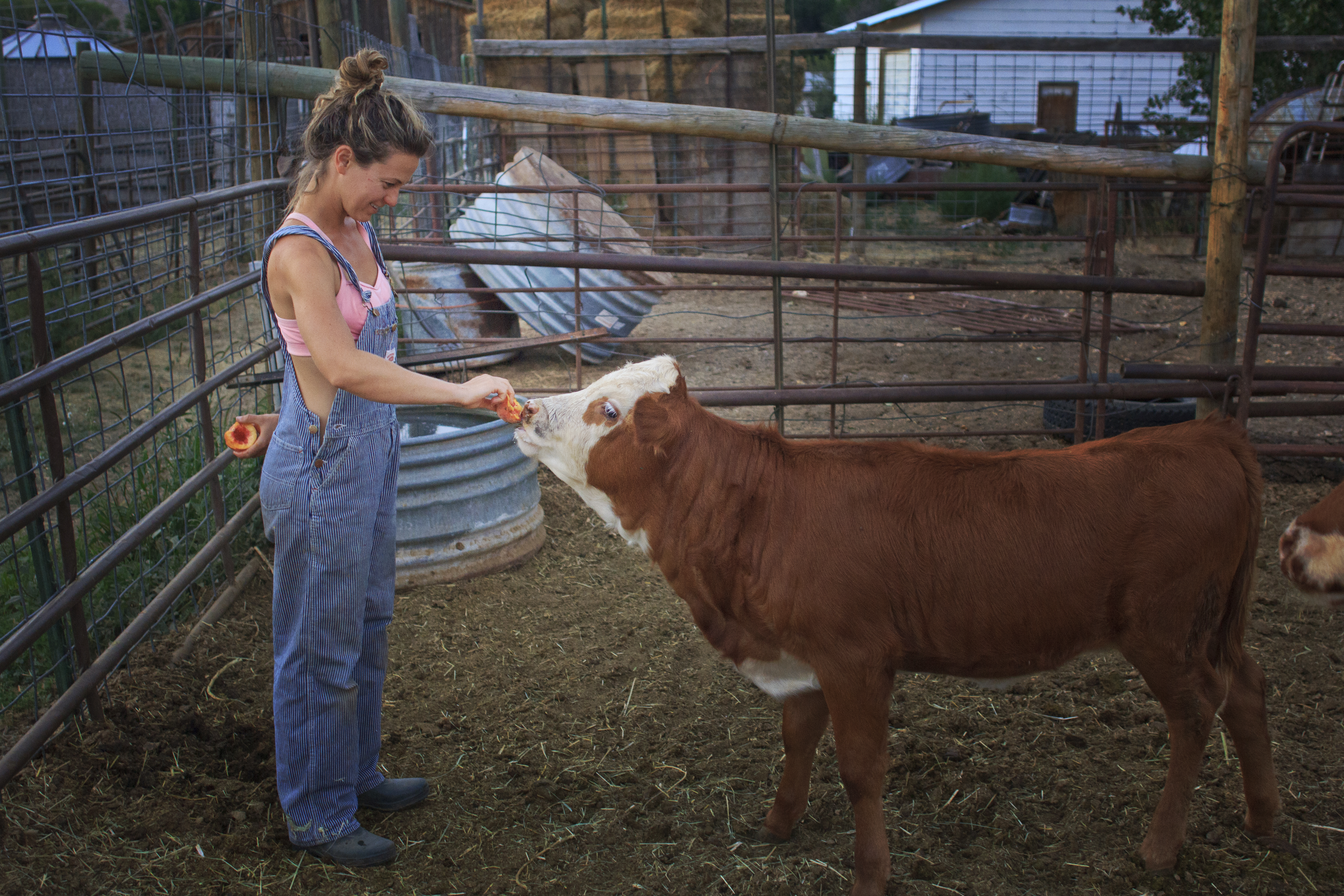
This heifer calf is named Morning Glory and she loves overripe peaches.
–
When picking’s done for the day, I always head straight for the cattle paddocks to share the unmarketable fruit with the animals.
–
Good farms revolve in circles. They have no waste stream. Extra fruit goes to the cows and rabbits, one orchard’s surplus energy feeding other forms of life in a beautiful and cyclical dance of energy
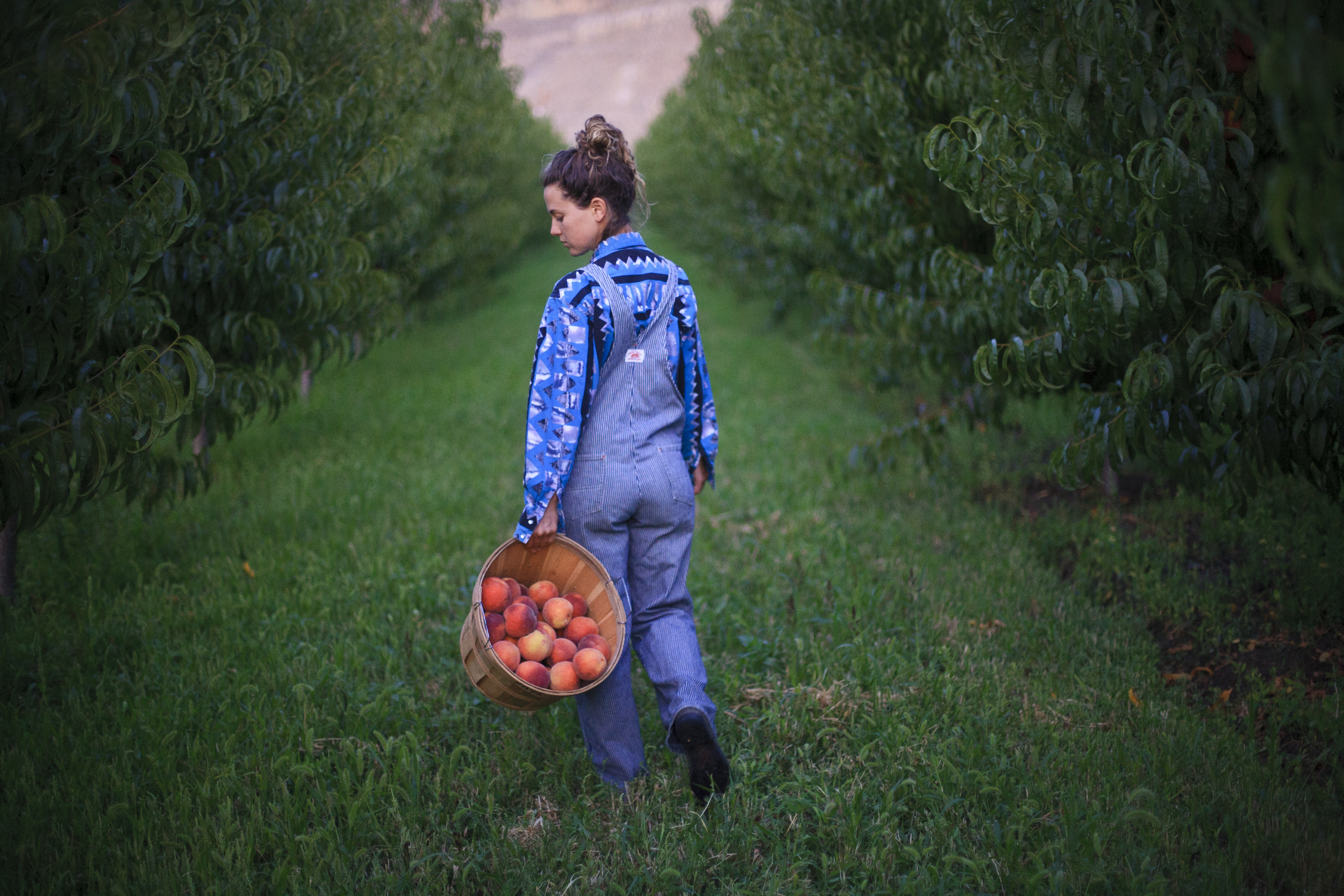
Tomorrow we’re back on the road, heading to a place we haven’t seen before and will probably never see again.
–
The taste of Palisade Peaches is juicy on our tongues, but we’ve gotta be moving, rambling on. The world’s so big and we’ve got so much left to see.
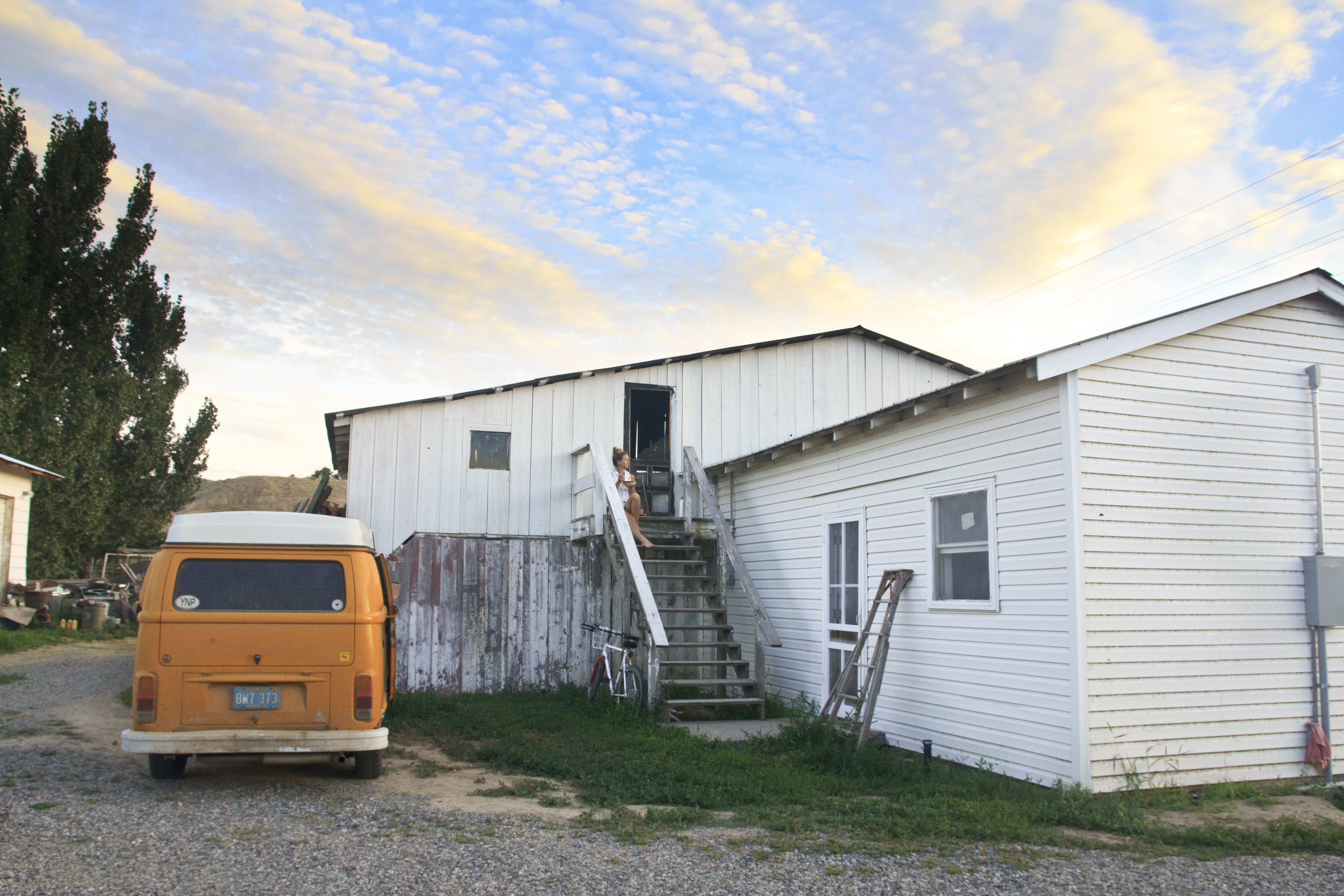
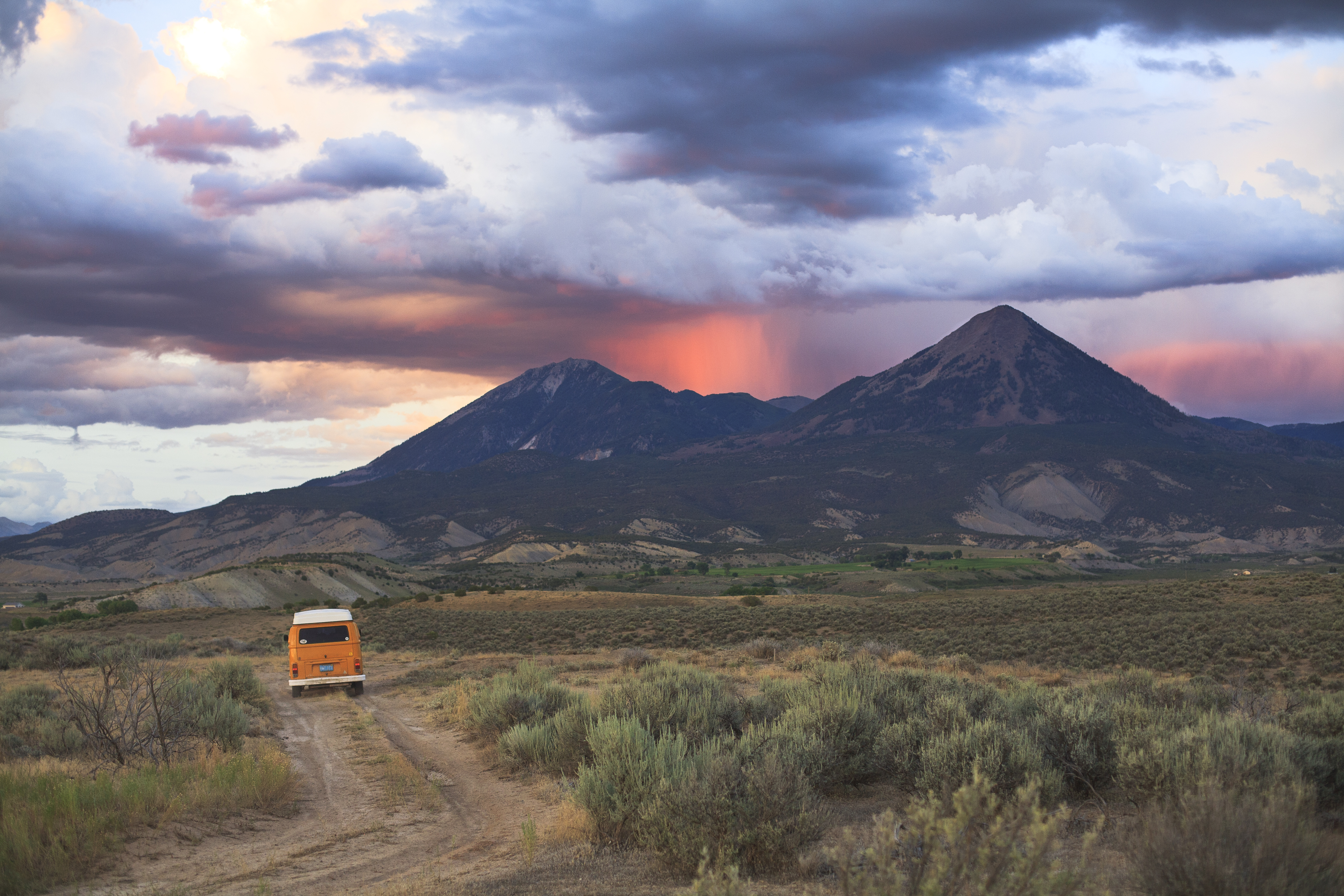
by JR Switchgrass | Oct 27, 2015 | Blog Post
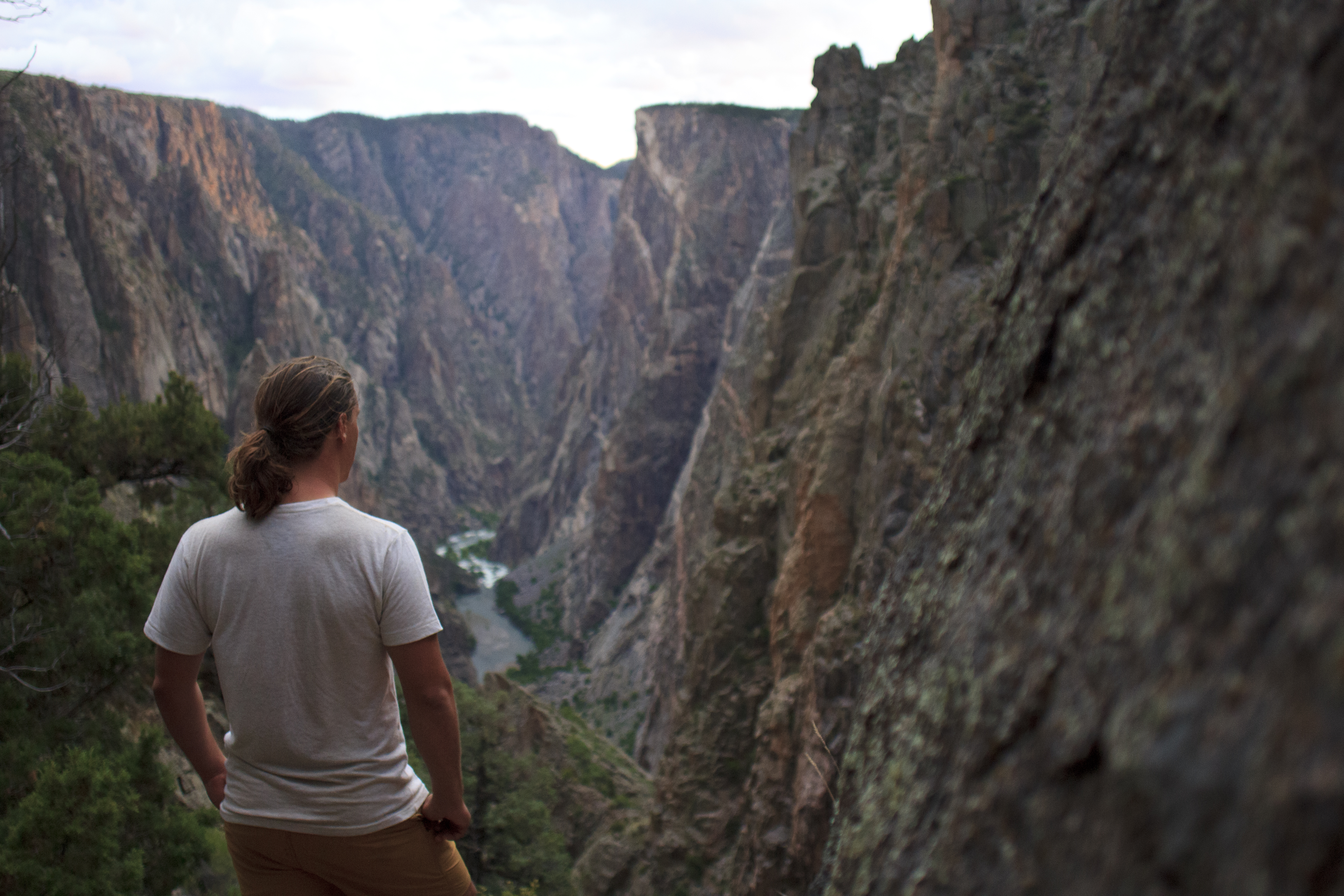
The north rim Colorado’s Black Canyon is still under the shimmering desert sky. This side of the gorge is peaceful. We see only 3 other groups as we explore the sheer walls of hard rock.
–
Amidst fragrant sage brush, its single-note music alive in the summer wind, we sleep. At dawn, we look down past our toes as the Gunnison River rages below, separated from the soles of our shoes by 2000 feet of air. The world is comprised of unthinkable features like this, natural holes so big they leave us tiny, humbled against their enormity.
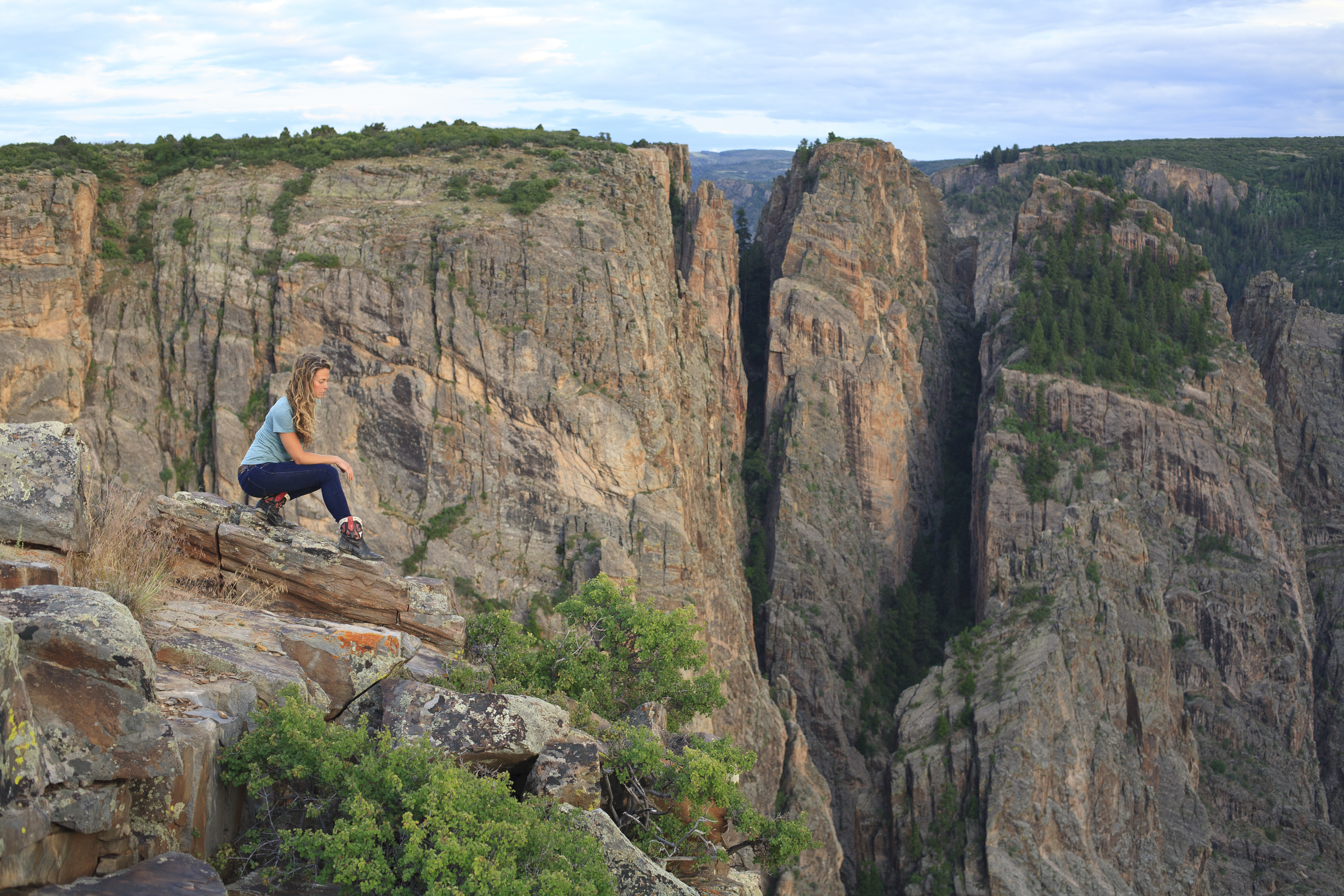
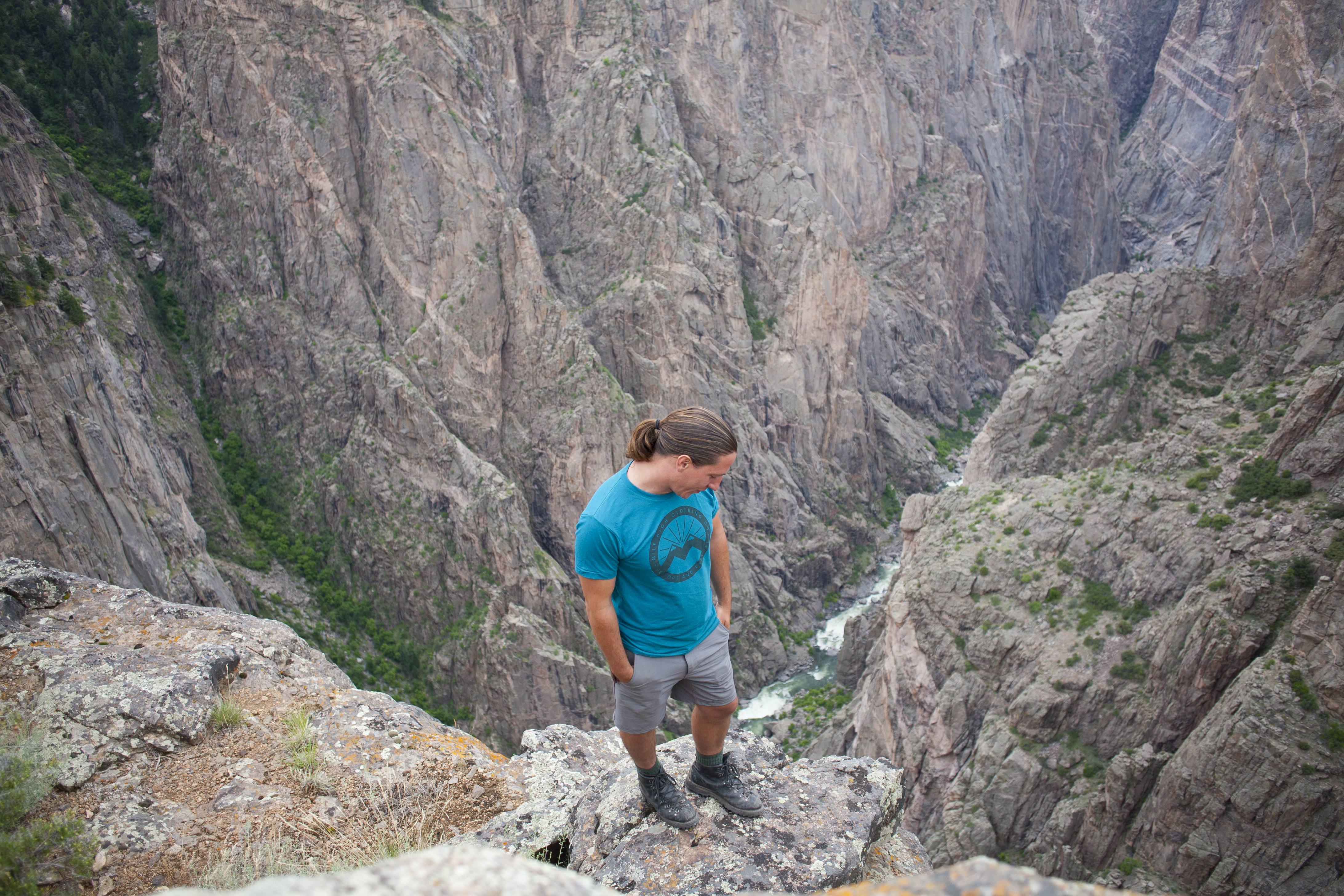
Here in Black Canyon of the Gunnison, everything is steep and sleek. Walls of conglomerate rock drop 2000 vertical feet into a striking and impressive slit, a great gouge in a great sage Mesa.
–
Standing on the canyon’s edge, an unfamiliar feeling arose in my gut, a sensation of flying on solid ground. By the time vertigo rendered me dizzy, I understood something new about the earth, about human experience. Something I’d never before articulated. Depth isn’t gained or taken away easily. It takes millions of years for a canyon like this to form. With this thought, patience, existence itself takes on a new meaning, a depth as shocking as the Black Canyon itself.
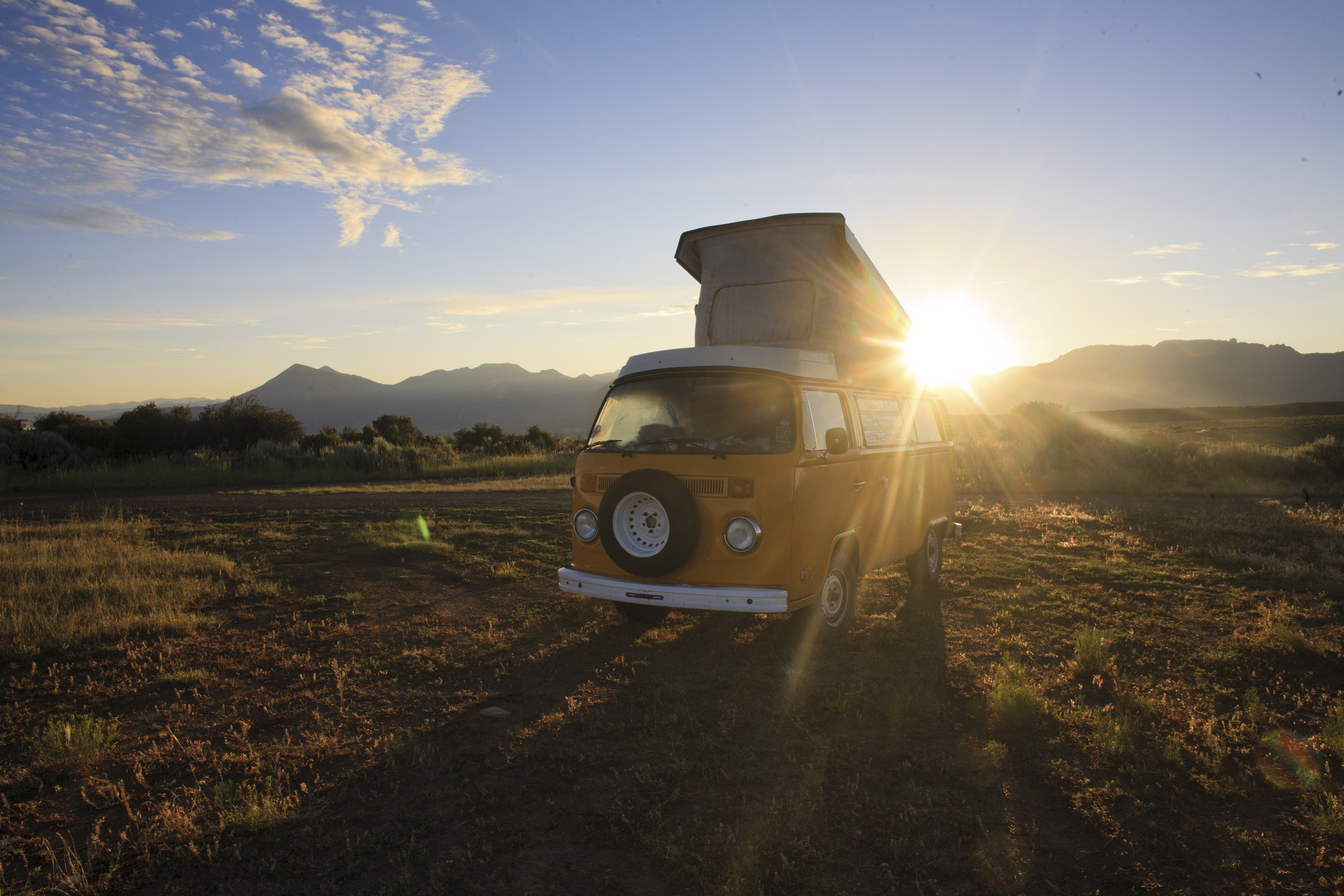
When the first sideways slant of early morning light hits the bus, we’re up and scurrying around like sage sparrows, chirping our own nonsense in the coolness of the dew.
–
The sun is this big ball of heat. Rising out of unconsciousness, to leave the heaviness of deep sleep, can be daunting. This morning, however, the sage-waving world is more inviting than these old blankets.
–
The road is empty. We pour our coffee black into beat up tin cups and turn the engine over. The day is young as the new buds of desert paintbrush. The air is electric, alive and shouting with possibility. An entire day lies before us and who knows- do you universe?- who knows what will be delivered to our expectant morning souls?
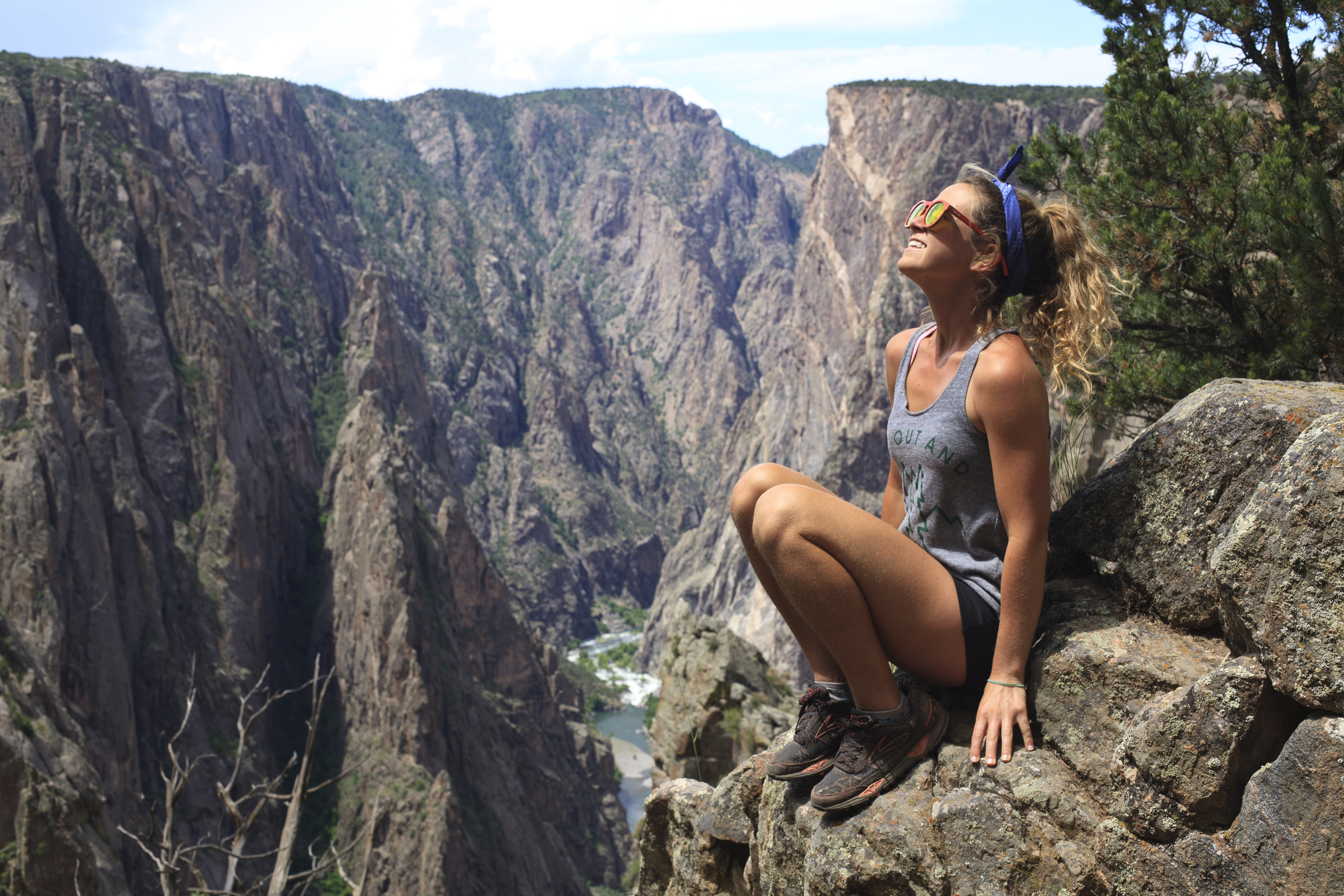 Six months before we left, I rummaged through a “Just Arrived” box in a store of oddities. There was a hand cranked juicer, a field guide to urban sprawl, a keyring that said “I like Ike.” I handled each of these things gently, heirlooms of the past. History in my hands.
Six months before we left, I rummaged through a “Just Arrived” box in a store of oddities. There was a hand cranked juicer, a field guide to urban sprawl, a keyring that said “I like Ike.” I handled each of these things gently, heirlooms of the past. History in my hands.
–
Under the box itself, a map hid like an earwig. It seemed black and white at first, its color ink obscured by dust bunnies until I blew it off. The map screamed early 90s. Its design glared highlighter bright, tinged with a tacky sentiment similar to Jansport backpacks and sparkle sticker collections. “Black Canyon of the Gunnison,” it read in Nickelodeon Network orange.
–
I had never seen a place like that. The grainy pictures of steep, black walls plummeted my heart into my gut. That moment, I knew better than anything I’d ever known, like the dark inside of my eyelids, that I would see that canyon someday. It was a premonition so strong it held no fear. I didn’t buy that map, but I should have. It was the archangel Michael, presenting my future in vintage topography, a step in the staircase to The Road. Almost three years later to the day, the sun is soft over the Canyon. Like the black insides of my eyelids, I am certain this is where that preordained map meant me to be.
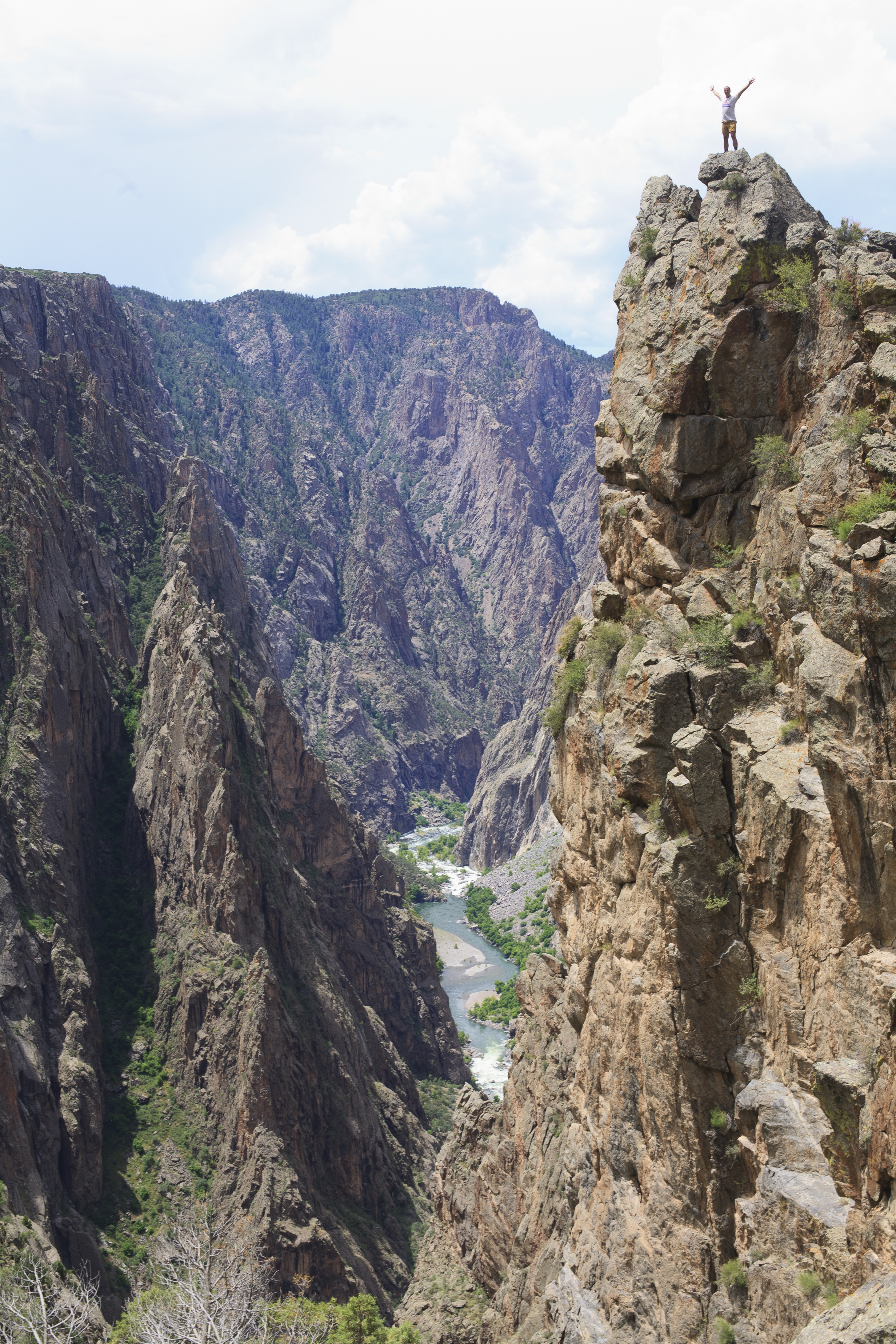
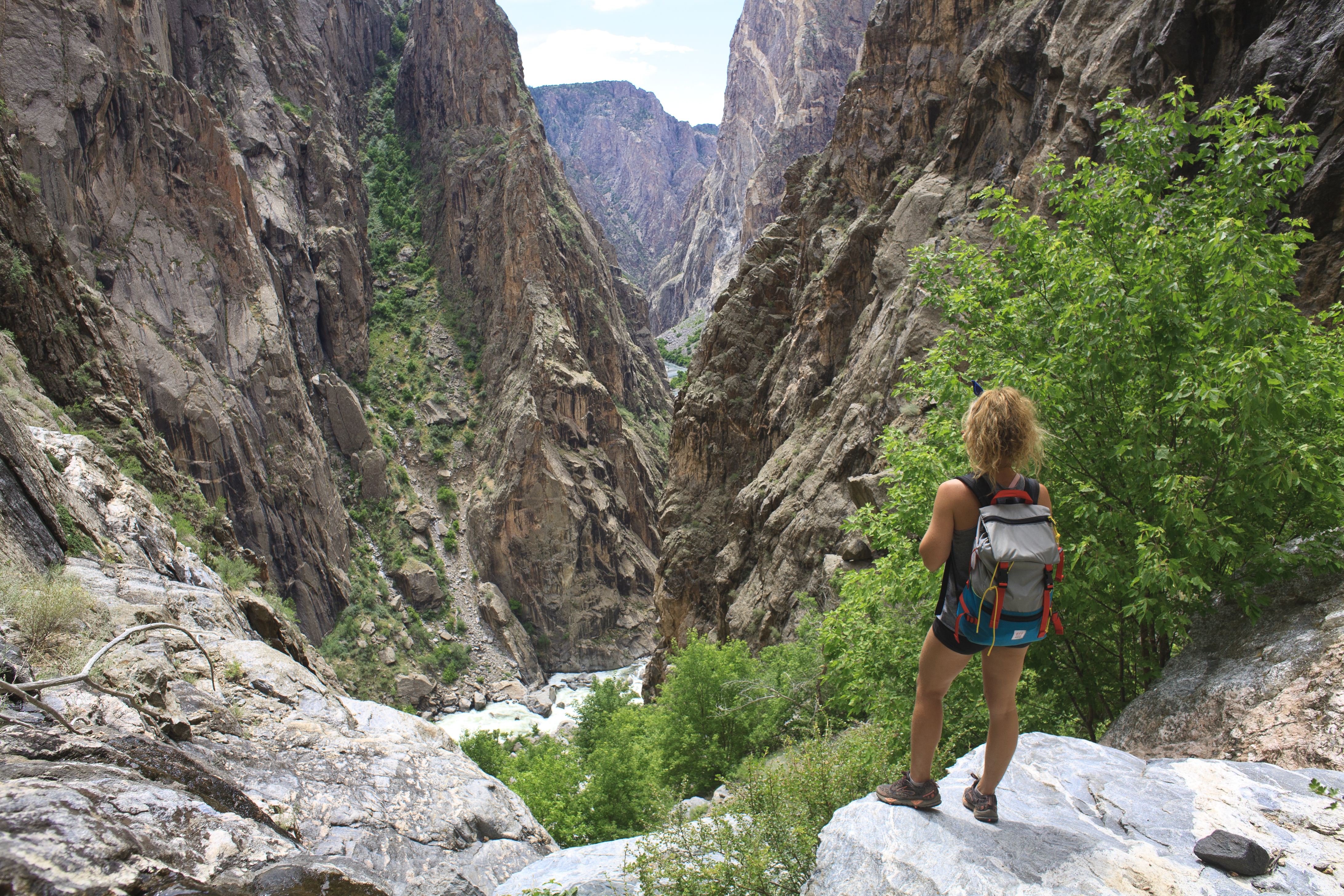
Life is a constant struggle against gravity. Thing is, entropy wins every time.
–
Once, we went to The Museum of Decay. A slide show rich with rusty Ford pick ups played on a clicking projector. They had constructed a model of the tallest bridge in Argentina that crumbled every 15 minutes. We watched a woman grow old through portraits, one taken every year of her life. I cried at the ephemeral world. I left my wallet in the lobby and it was gone too.
–
Everything fades. Everything is transient. It’s tragic, but you know what? It’s also why the world is so heartbreakingly beautiful.
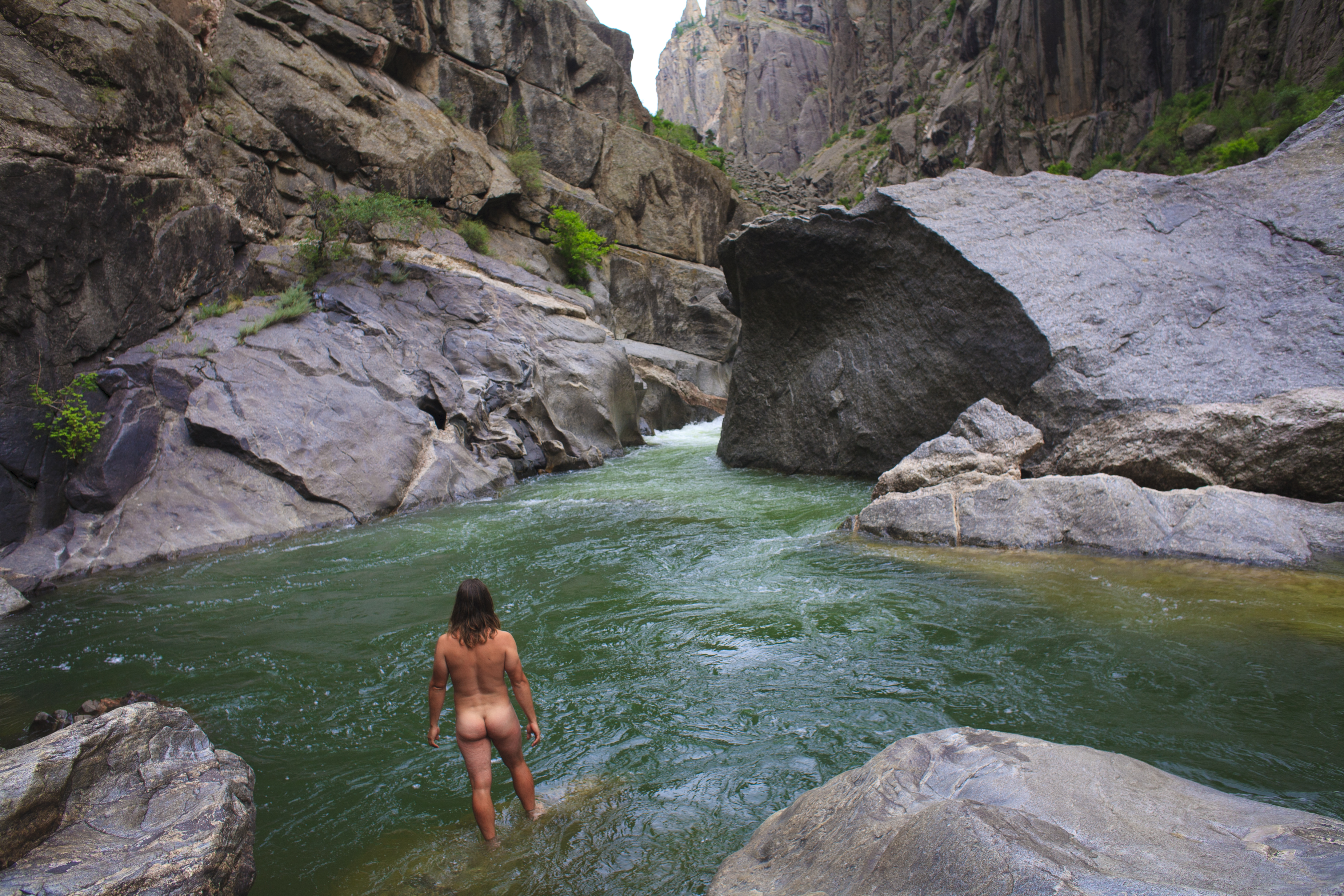
Our skin is where we encounter the outside world.
–
We are encased in this incredible organ, a web of receptors and tissues that connect us to everything and everyone we viscerally know.
–
It’s important, sometimes, to let our skin free, to allow it to enter the earth unencumbered by clothing or protection. Baring your body exposes your true self physical self to mother earth. Stand and allow her to answer, as the cold rush of water runs over your skin, a baptism, of sorts, every time.
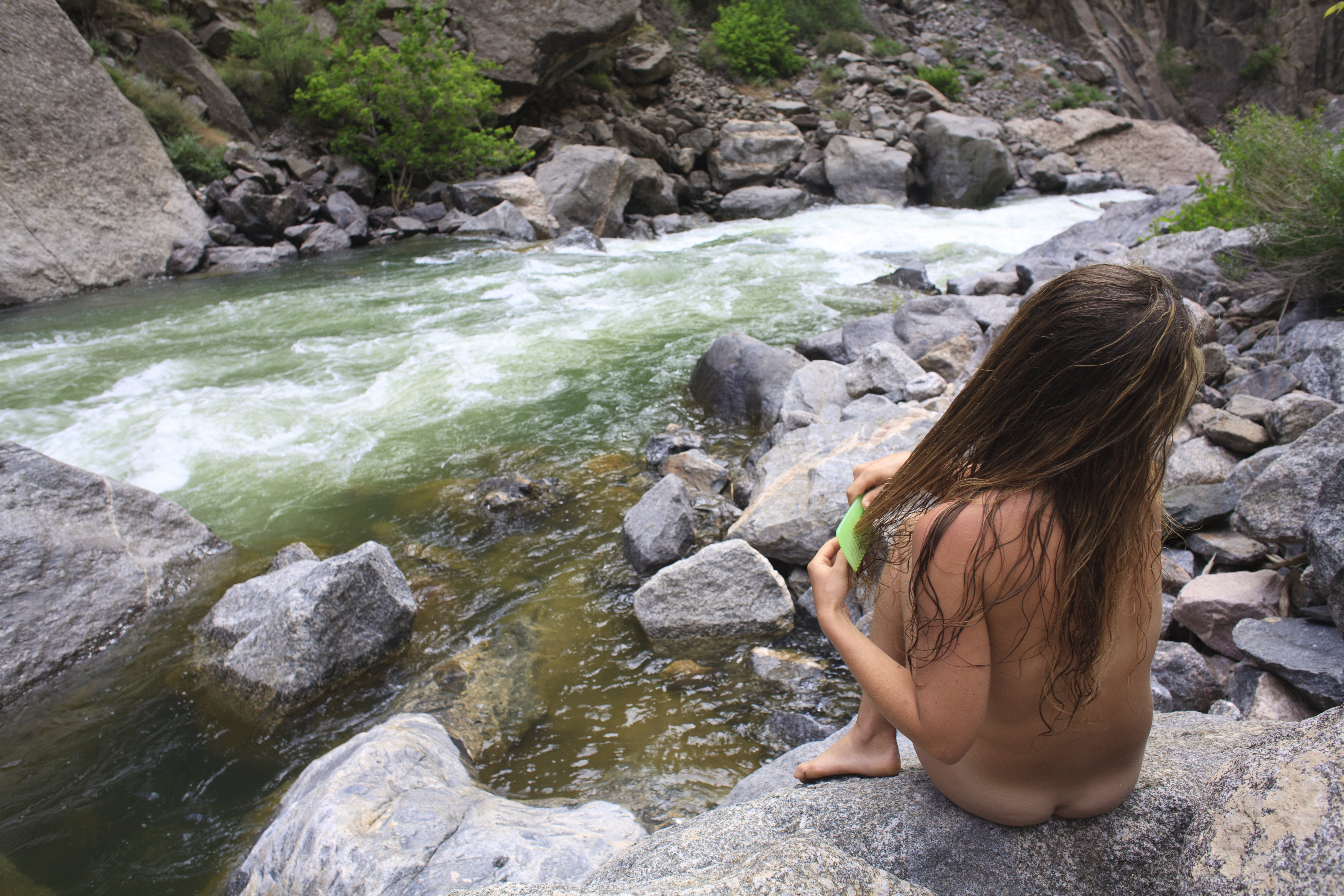
We’ve learned to love cold showers.
–
Our daily routine includes a swimming hole bath. Rivers, lakes, and creeks are always on our radar, the more remote the better. If there’s a good sunny rock for warming up, that’s the spot. Hot springs are a triple bonus.
–
We dunk, splash, comb, and repeat. No soap, usually, just a skin rub and gone. Every day is a ritual of natural moving water, a ritual that cleanses and purifies more than indoor plumbing ever could.
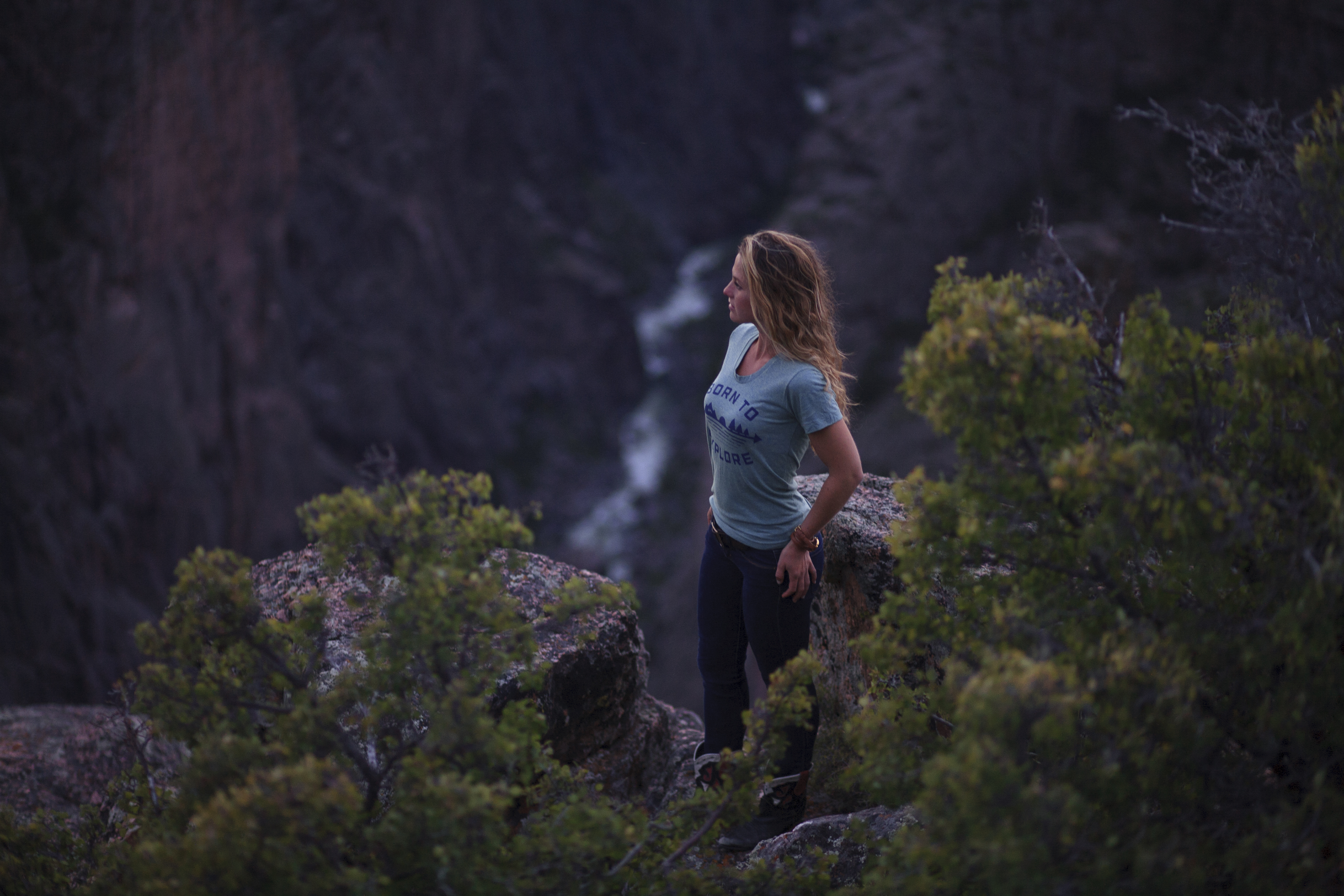

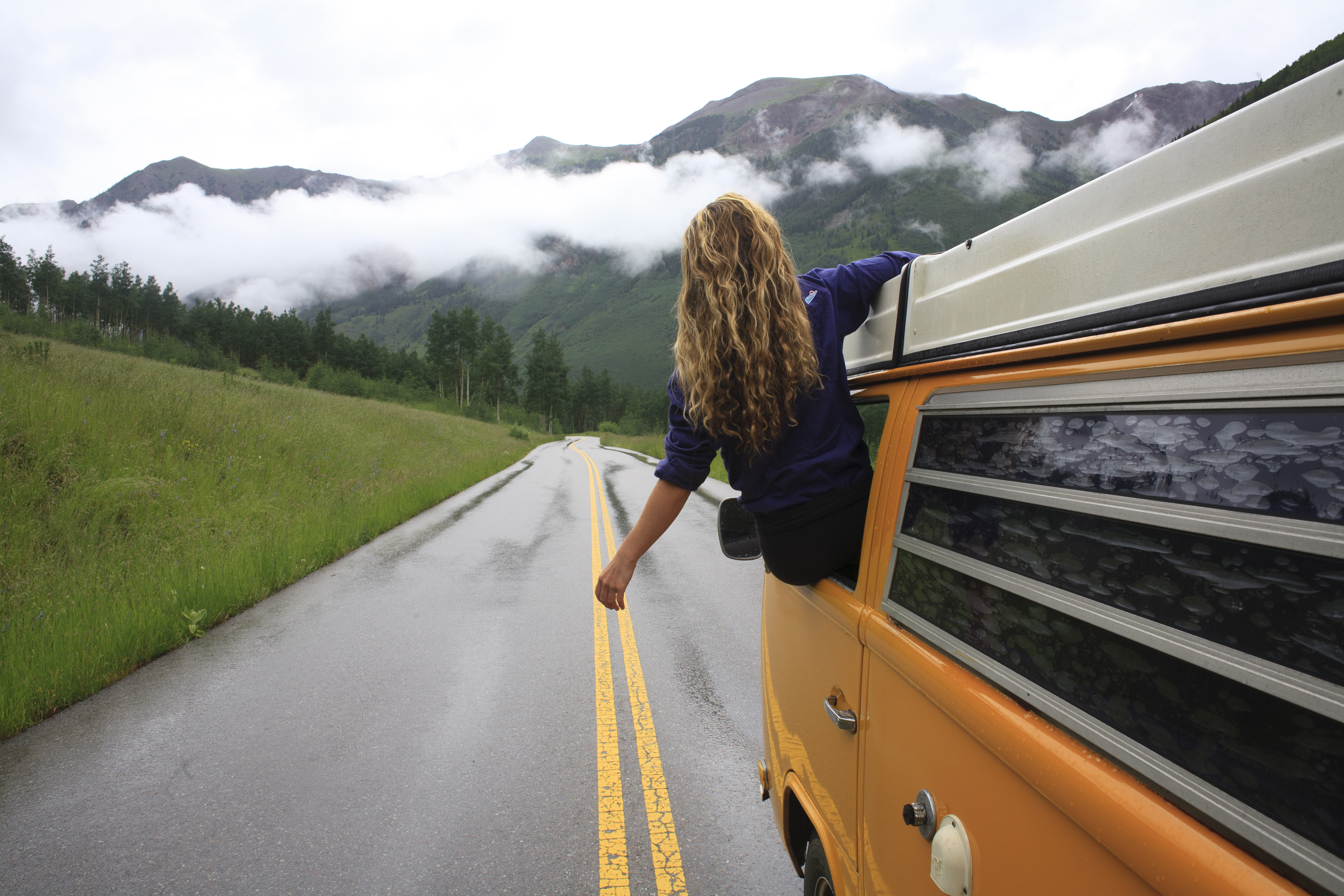
by JR Switchgrass | Oct 27, 2015 | Blog Post

Life on the road has, for us, been a natural progression. A road trip without an end date has turned into 2.5 years of living, working, and playing around North America.
–
We truly think that the lifestyle found us, instead of the other way around. Moving into our bus seemed obvious. We had little resistance.
–
It wasn’t an intellectual process, or a succession of logical steps. It was a gut instinct, a burning desire, a sudden impulse based on passion. We want to live extreme highs, and will take extreme lows as par for the course.
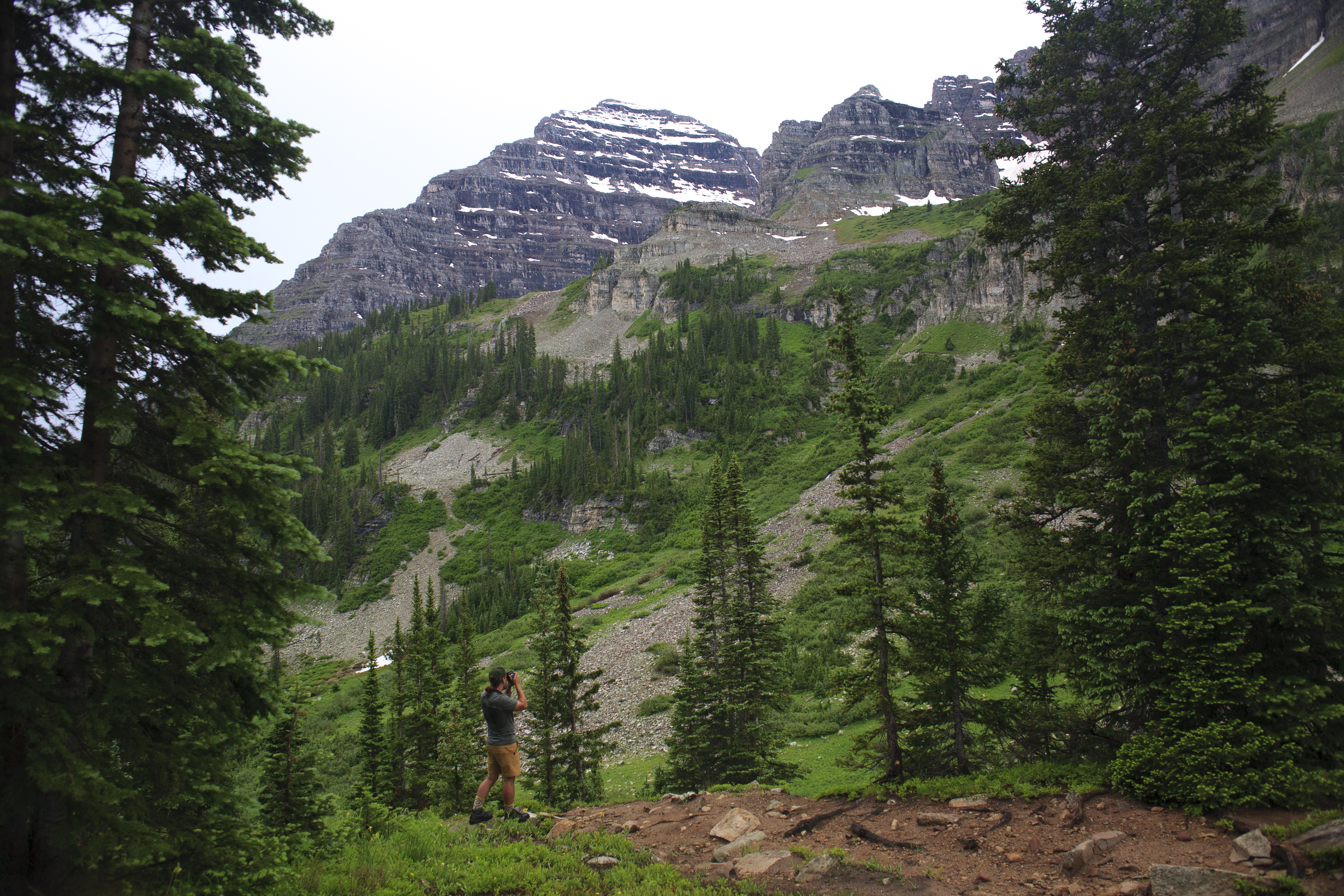
We backpacked for nearly a week in the Maroon Bells wilderness.
–
The rain fell on us for three days. Everything was wet, wet as water itself. The liquid saturated every pore, adding pounds of water weight to our packs, but after awhile it didn’t matter. There really wasn’t anything to do but walk. Each morning, we hiked on, everything soaked, sloppy. Grey jays, wearing their feather raincoats, laughed at us from the pine boughs. We looked pathetic to them, trudging uphill in the dense fog.
–
Then, the fourth day, the mountains seemed to slurp up the dark clouds. The fog swirled behind the panorama of ranges. Suddenly, a huge sun shone down. A brilliant moment of yellow light warmed us, 15 minutes of bright light that erased the days of deluge preceding, a reminder that you can’t be dry until you have first been wet.
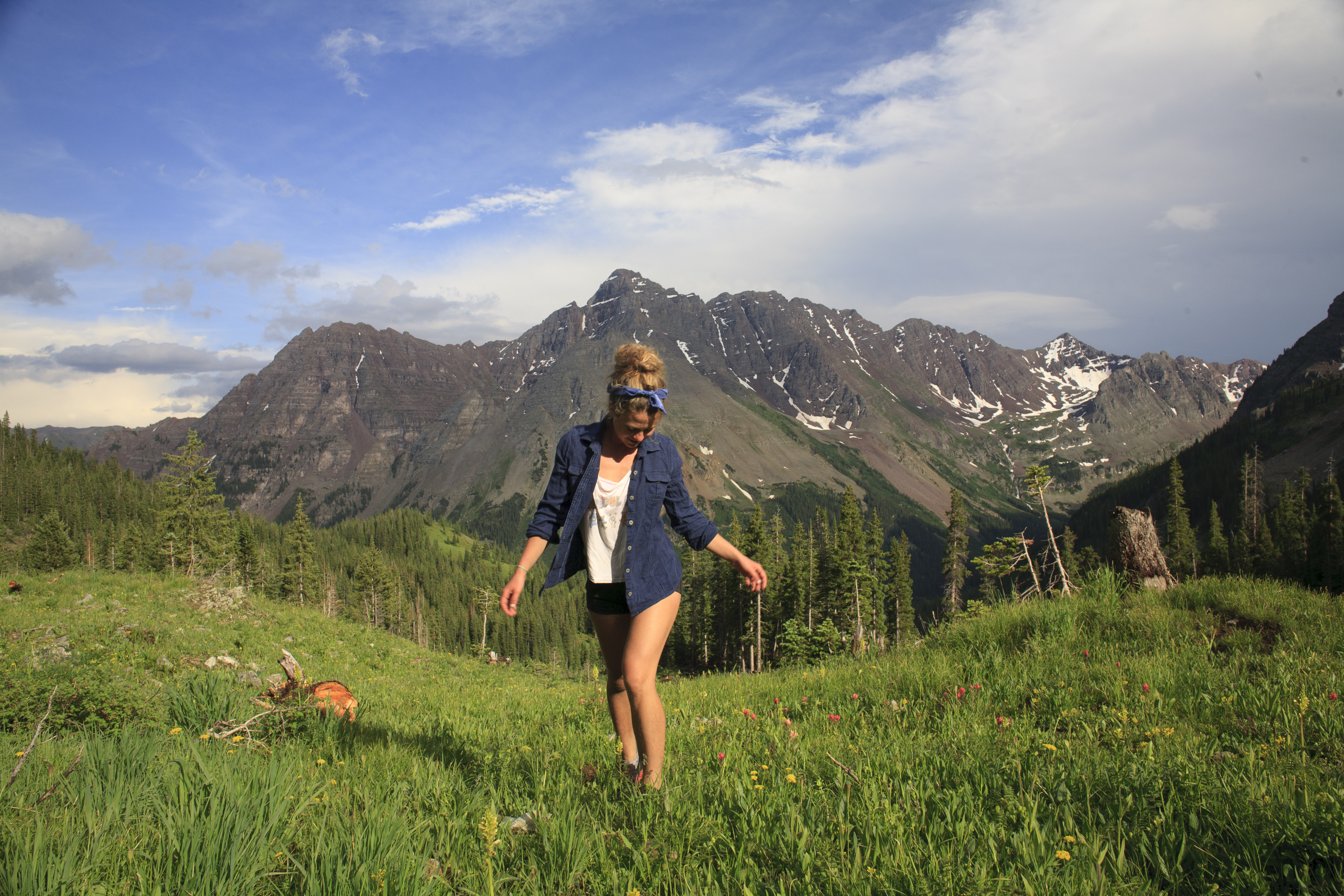
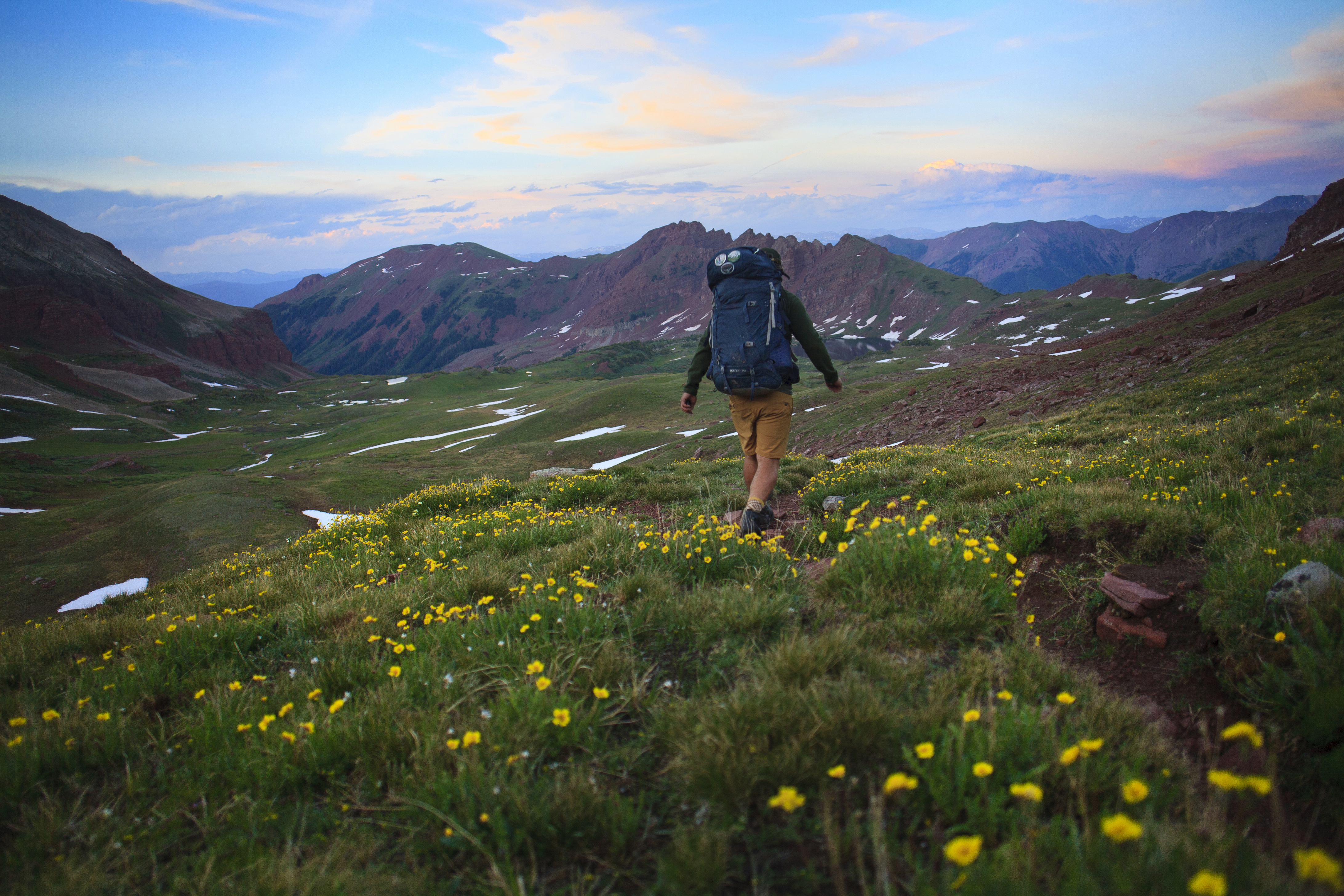
Wilderness is a place that we humans are supposed to visit and then leave.
–
But, not too far back in history, we lived out here. We ate and breathed and created of the earth and then returned ourselves to it.
–
Every time I walk into the woods with a backpack, I try to understand the succession of events that led to our separation from these wild places. And I hope, with each day that passes, I may, myself, become a little more wild.
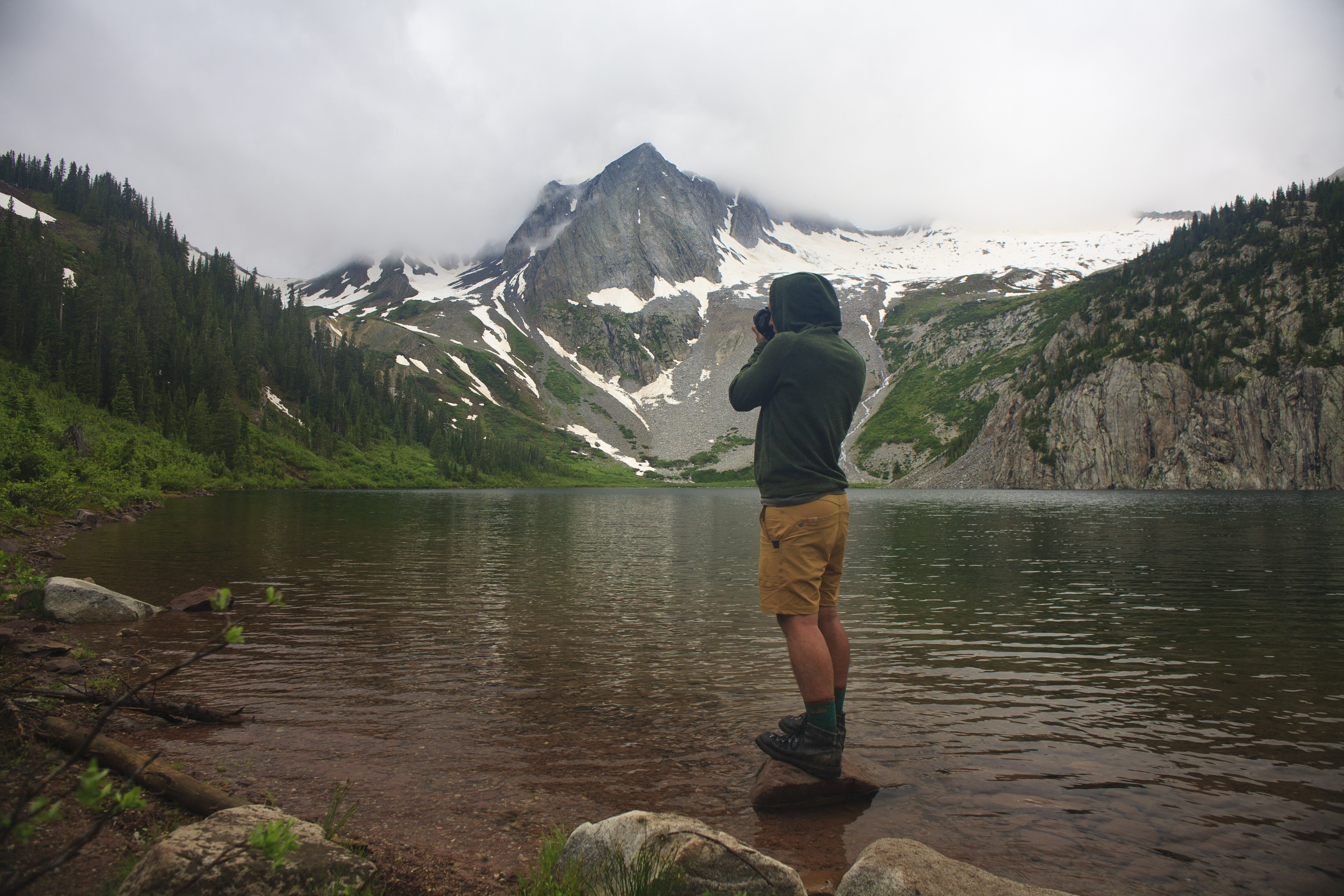
A photo is sacred. It represents a tiny splinter of time that can’t be replicated.
–
Photographers are wranglers of moments, capturers of reality. Their work is an external memory linking us to the past, an instant our eyes couldn’t otherwise see.
–
There’s magic in that stance. Clicking the shutter, he corrals a memory, trapping it in a light-tight box.
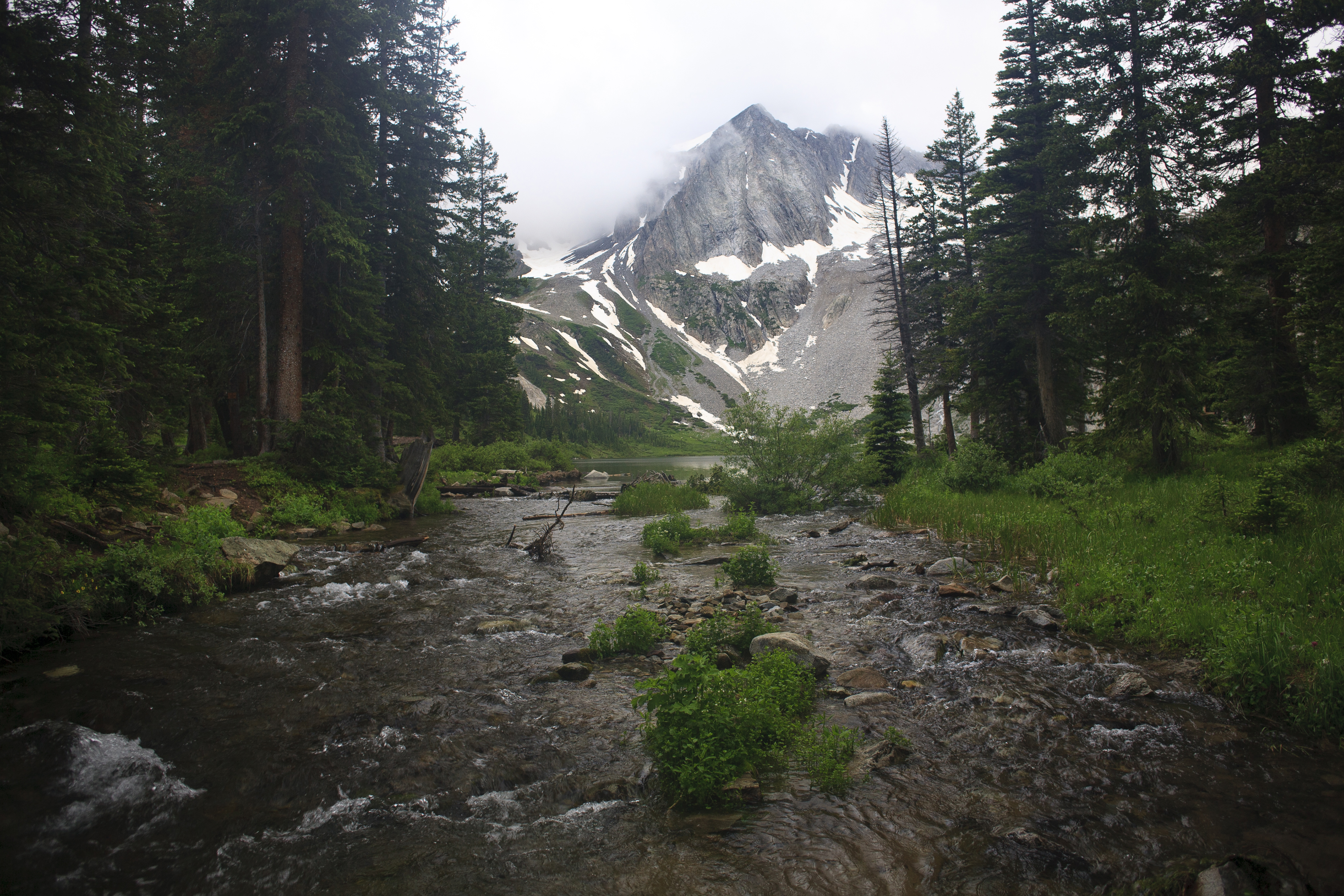
We perched at the tippy top of Buckskin pass and ate candy bars for dinner.
–
The gold, crackly wrapper of my Twix bar glinted conspicuously from my knee. Alien. Where did it come from? How is a land that looks like this transformed into dextrose?
–
We sat on the maroon rocks of the pass, 12k feet higher than the sea, in a different world. We ate of our packaged space food, astronauts of the wild.
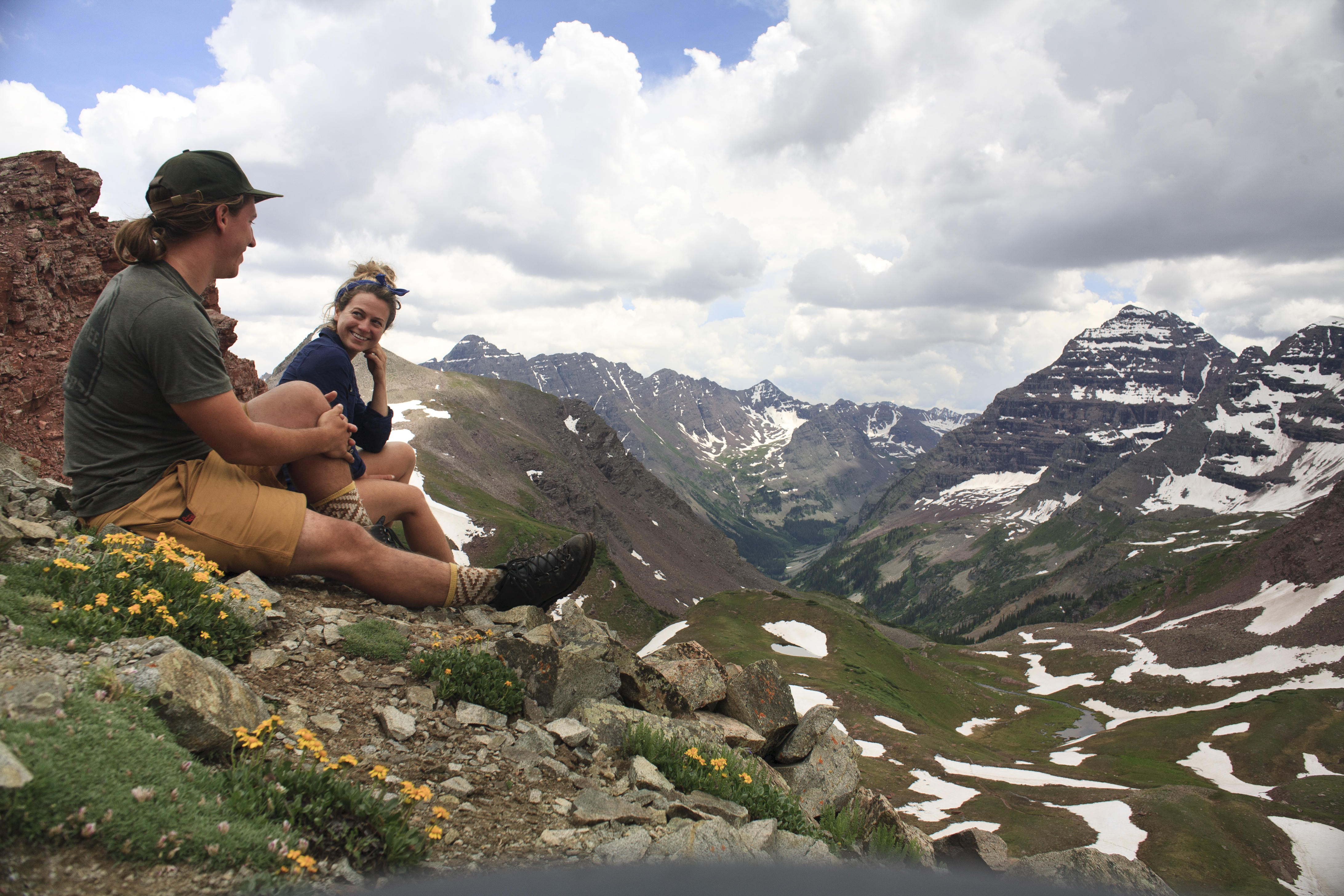
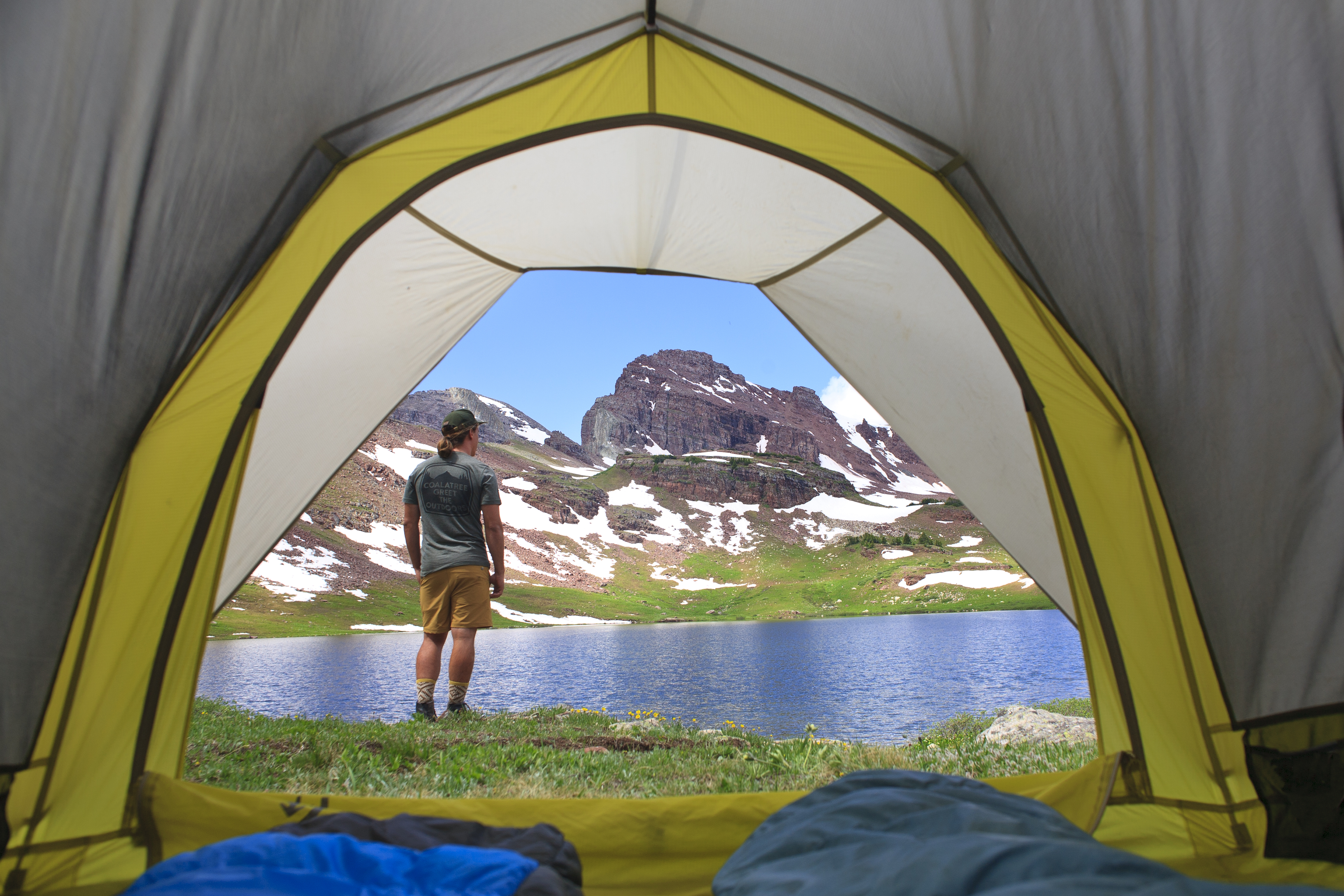
The wind was strong this morning, mumbling incoherent ideas into the deep canals of my Eustachian tubes. I slept, half aware, past the sunrise.
–
James was up and at ’em, God knows where. I thought I could hear him outside the tent, he and the wind leaping through the green morning, nimble as big horn sheep.
–
I ate my breakfast from the comfort of these flimsy four walls of the tent, content to watch him frolic and lean against the invisible strength blowing in the low-oxygen air.
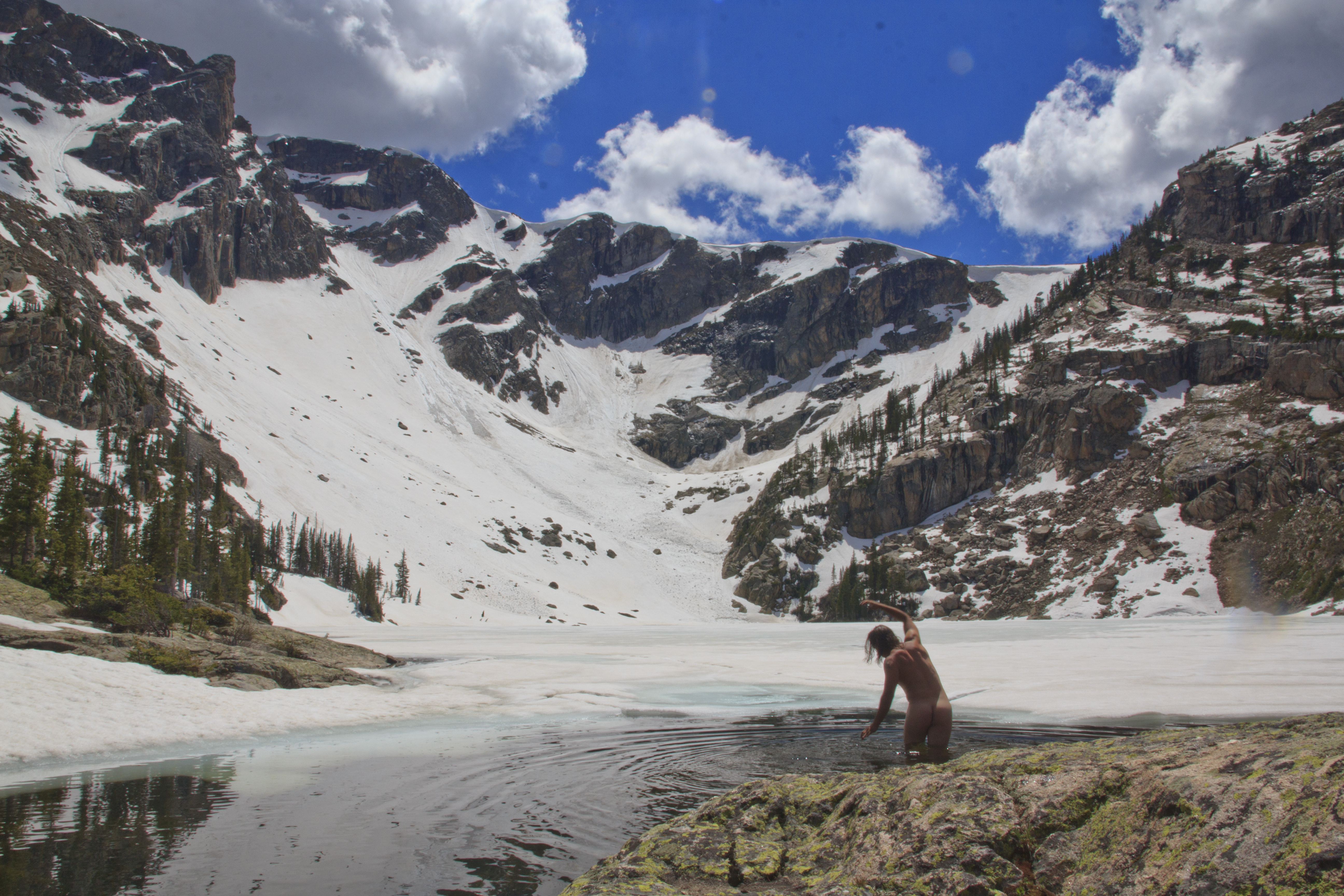
James flaps his brown arms like a moth, spiraling with floppy, cardboard-wing loops into the iced-over lake.
–
Hey! I shout. He turns around. Don’t freeze up and die! I say. He just smiles in return and disappears under that blue layer of ice. Fearless.
–
He reappears at the edge of the frigid water, wearing a wide white grin that childishly shouts: Wowie am I alive! Wowie is my blood pumping purple! Wowie isn’t it awfully wonderful, wonderfully awful to be so shivering cold?! Wowie, how can I help but to rush and run and ramble in a world that has solid ice and liquid water, under a big brawny mountain like this, Wowie Mountain.
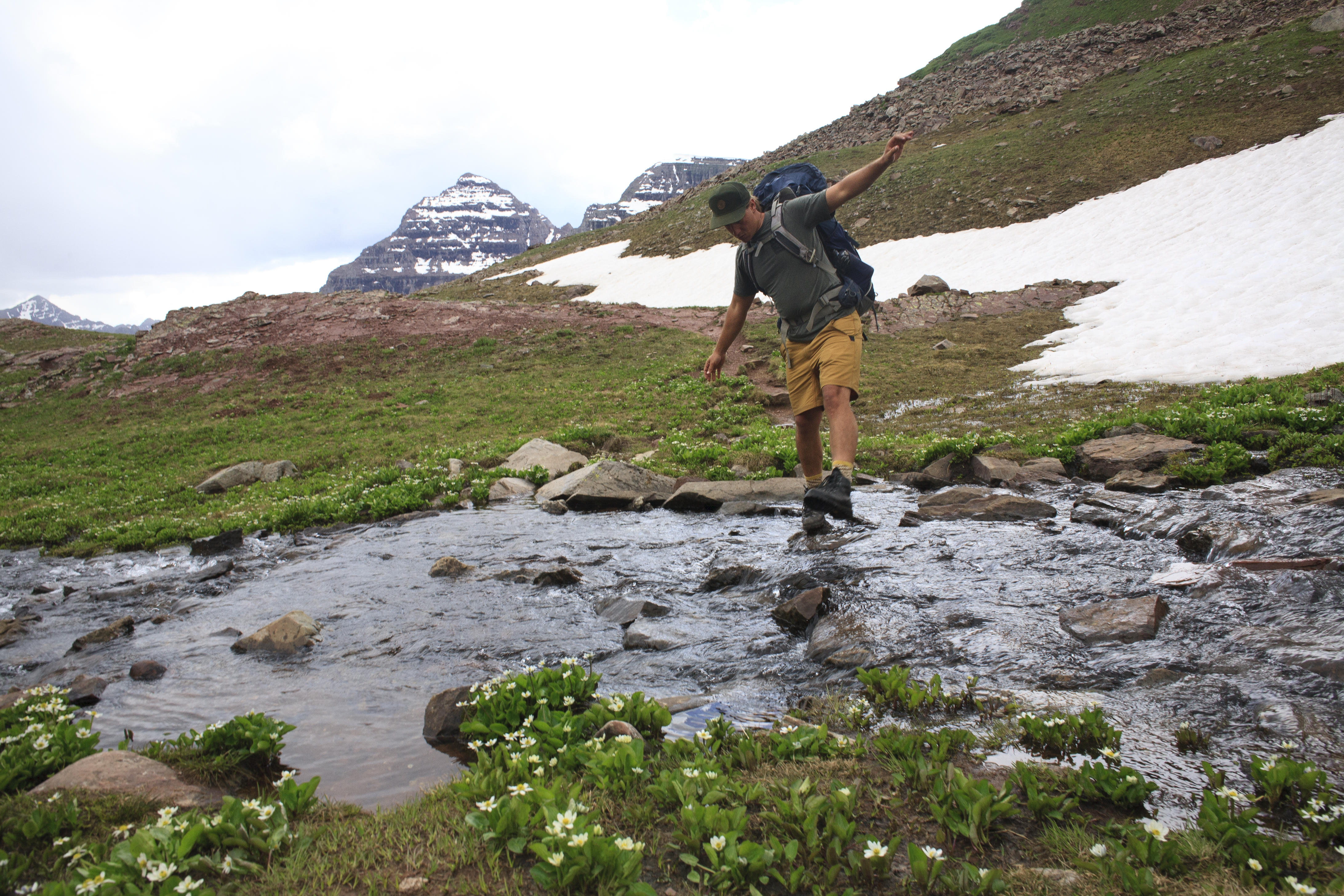
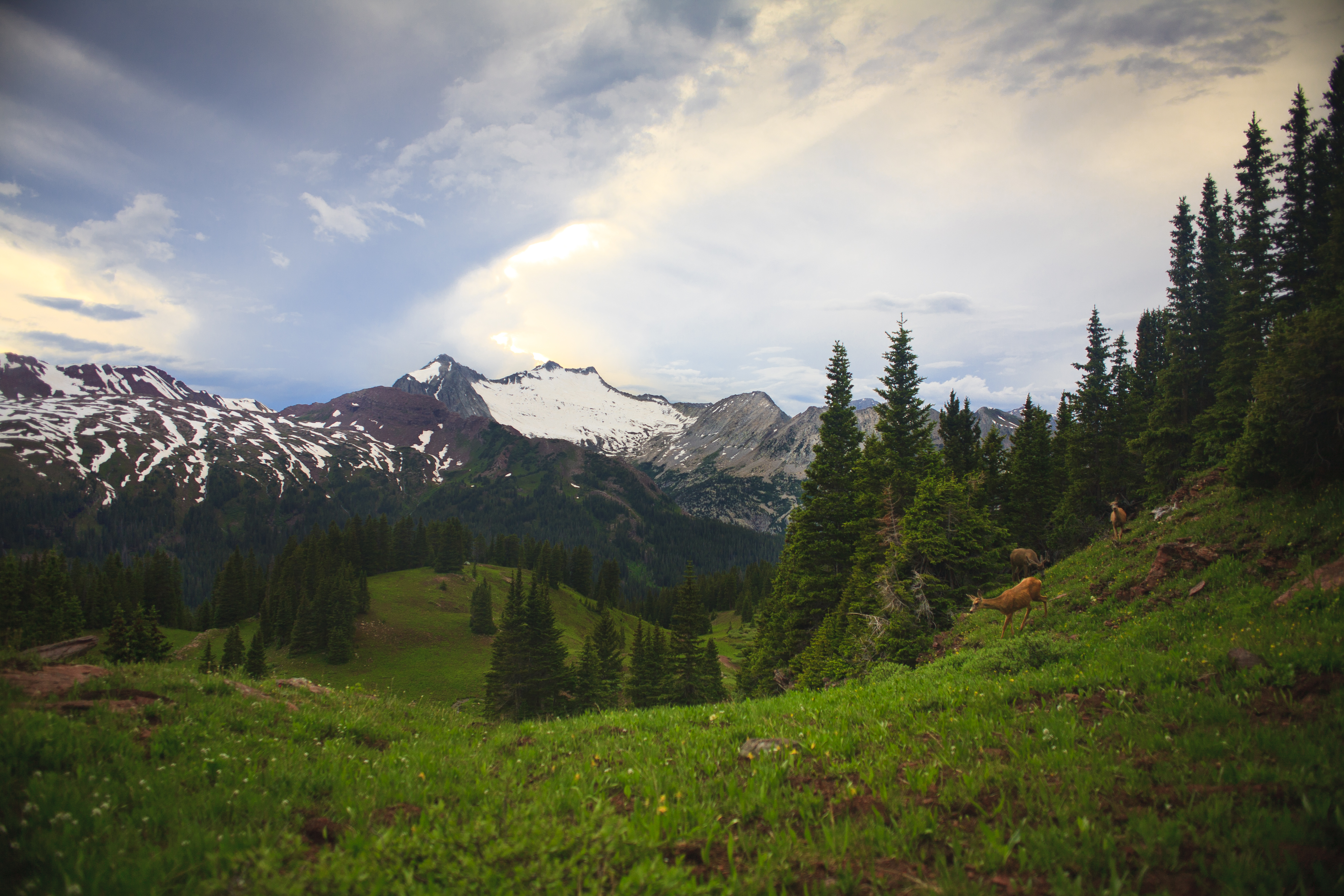
If humans were only motivated by comfort, we wouldn’t come out here.
–
There are cities with every luxury imaginable. We can be dry and warm and satiated and clean.
–
But give us our dreams, give us leisure time that we can spend as we please, and where do we come but these alpine meadows, where rain pours and wind whips and the creeks soak our feet. Why would anyone choose discomfort ? Because we are an overly insulated people. We want to feel something. We want life-and life is not always a comfortable proposition.
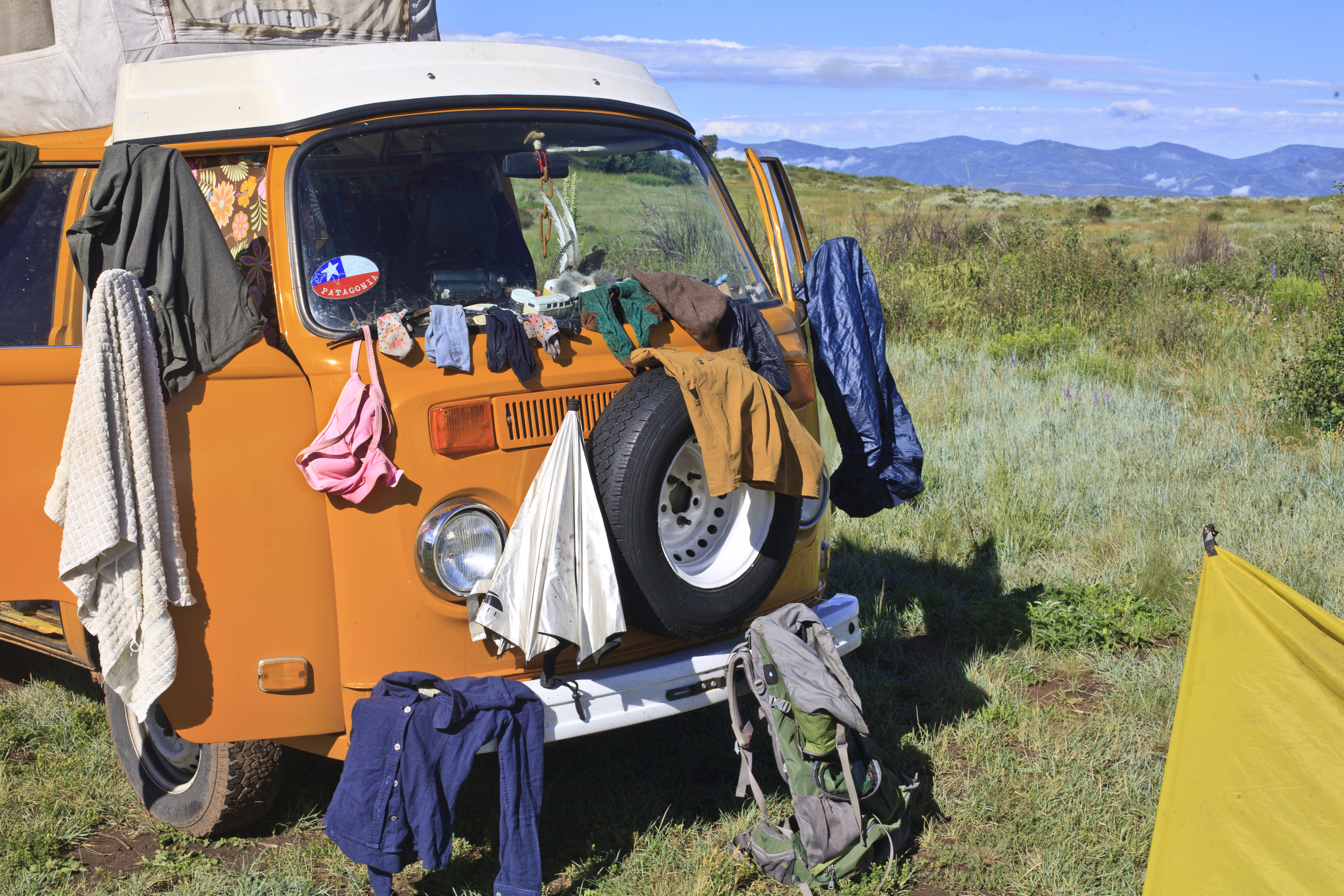
It’s been a wet season here in CO, and our pop-top is a little leaky. Everything has been damp for a few weeks now. Our sheets squish as we climb into them and the wood floor is a slip zone.
–
We took advantage of today’s sun to air everything out, emptying our belongings, everything we own, into a mound around the bus.
–
Every time we clean thoroughly, we ask ourselves how we carry this much stuff. It makes us think back, to a time years ago when we had a studio apartment worth of things. We can’t imagine what we used to do with all that. James reminds me, holding up a plastic accordion, that we’re repeating history in our tiny home. We’re still weighed down, lugging useless (but awesome!) stuff, just on a smaller scale. He is a Zen master of simplicity. I remind him that life is a process and look how far I’ve come in my journey as a traveling hoarder. Everything we own is in the bus.



 Every road tells a story. Of ranchers and pioneers, of natives and bison, of long extinct mammoths and giant sloths that once roamed the grasslands. And now us, passing through not for survival of body, but of spirit.
Every road tells a story. Of ranchers and pioneers, of natives and bison, of long extinct mammoths and giant sloths that once roamed the grasslands. And now us, passing through not for survival of body, but of spirit.

 Six months before we left, I rummaged through a “Just Arrived” box in a store of oddities. There was a hand cranked juicer, a field guide to urban sprawl, a keyring that said “I like Ike.” I handled each of these things gently, heirlooms of the past. History in my hands.
Six months before we left, I rummaged through a “Just Arrived” box in a store of oddities. There was a hand cranked juicer, a field guide to urban sprawl, a keyring that said “I like Ike.” I handled each of these things gently, heirlooms of the past. History in my hands.
























































